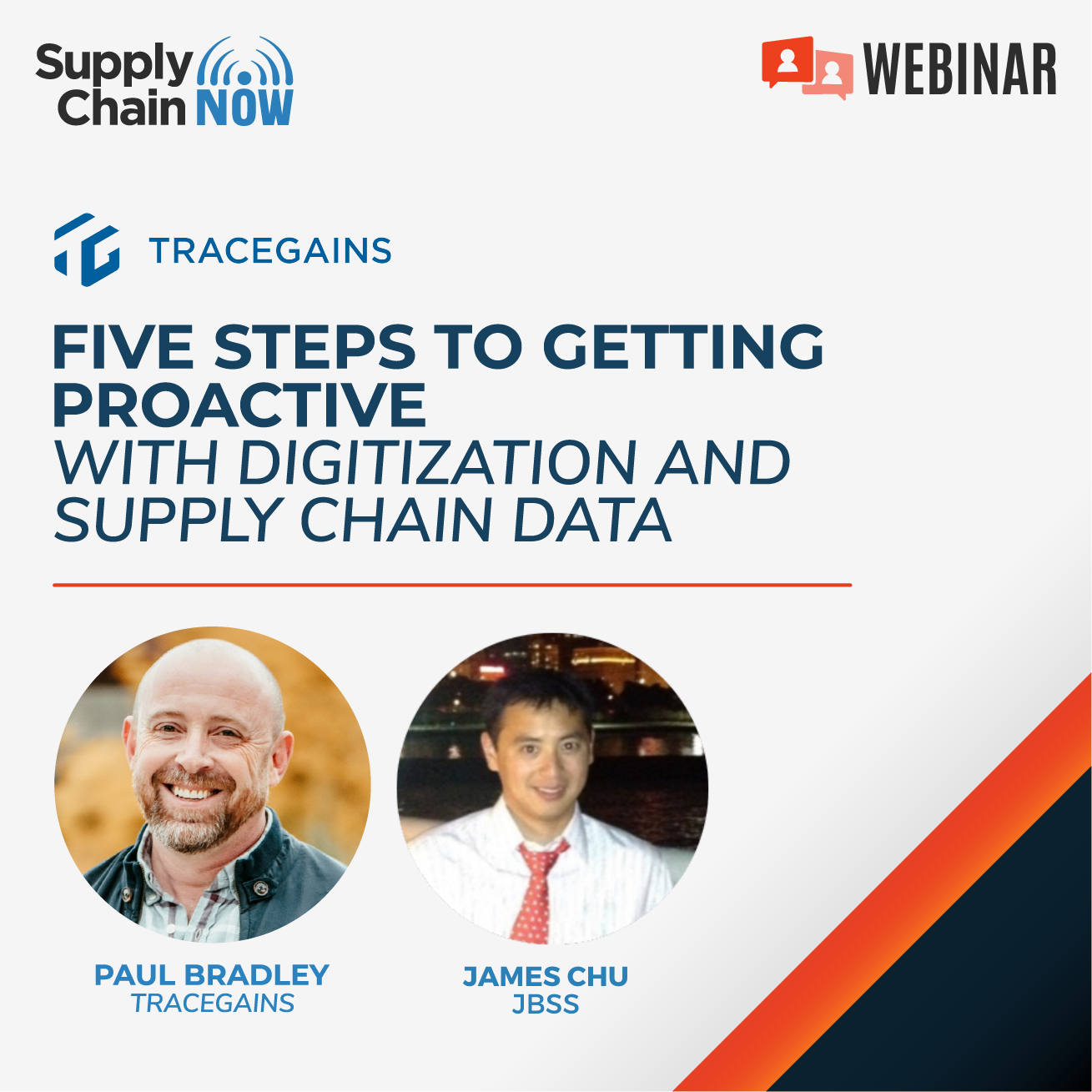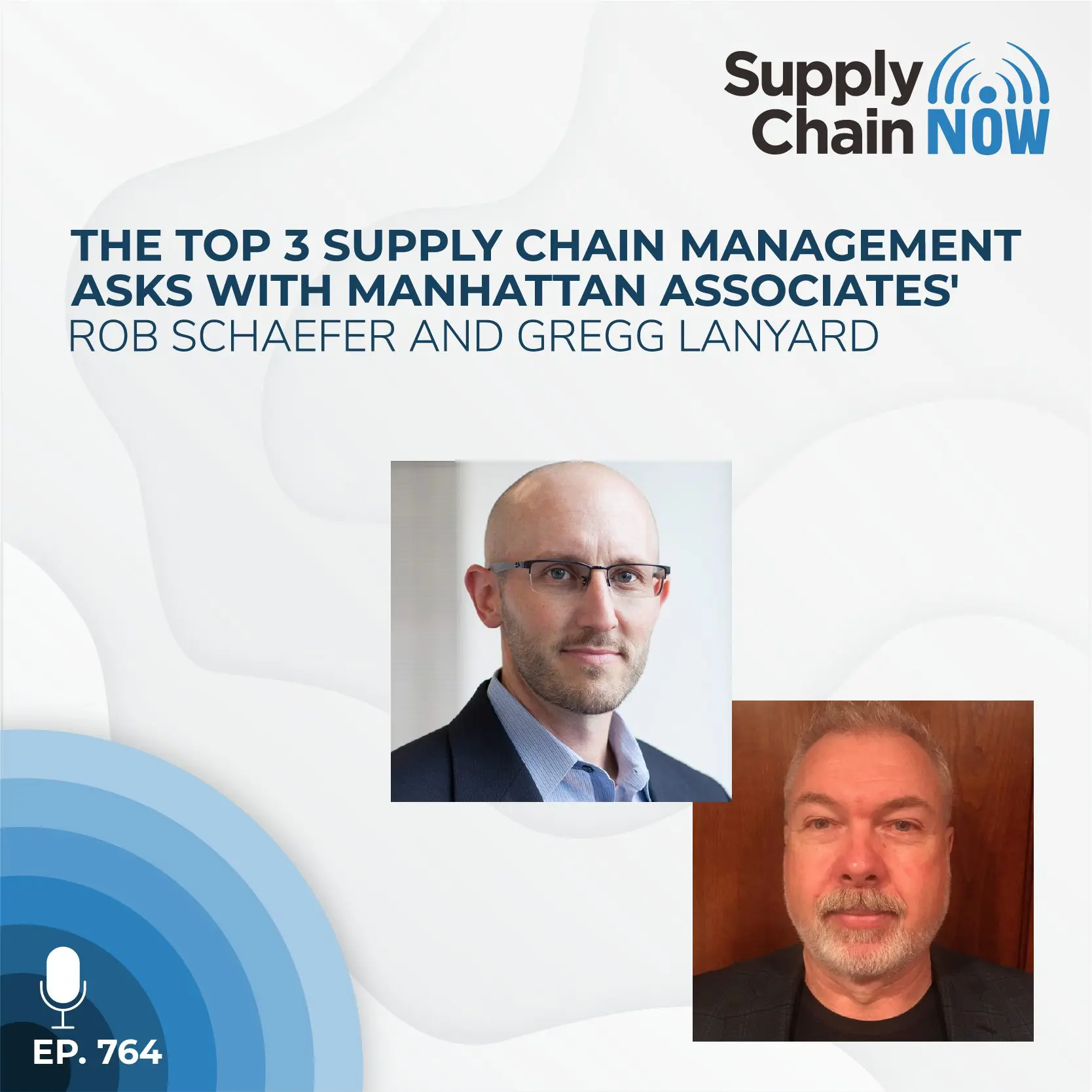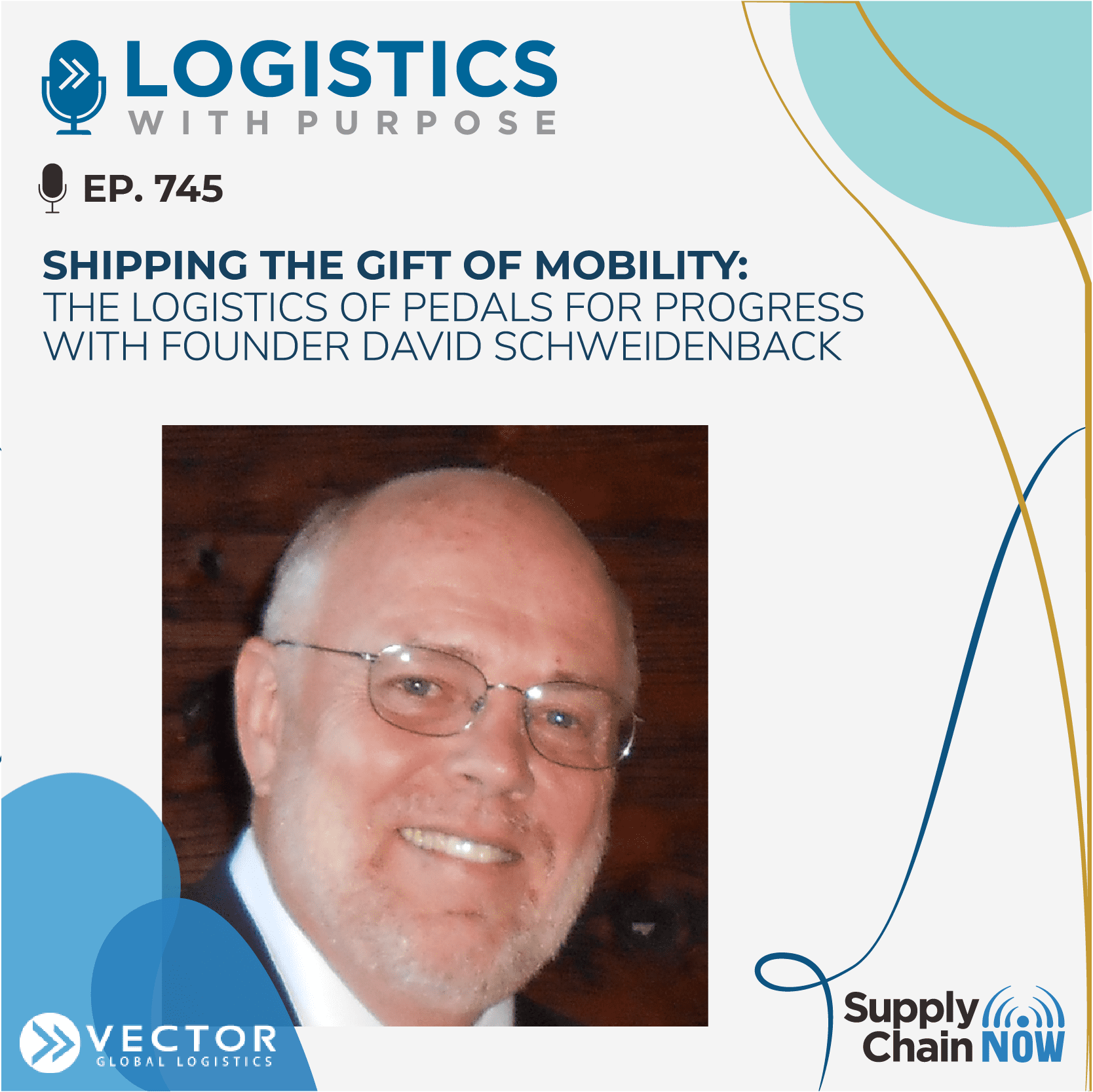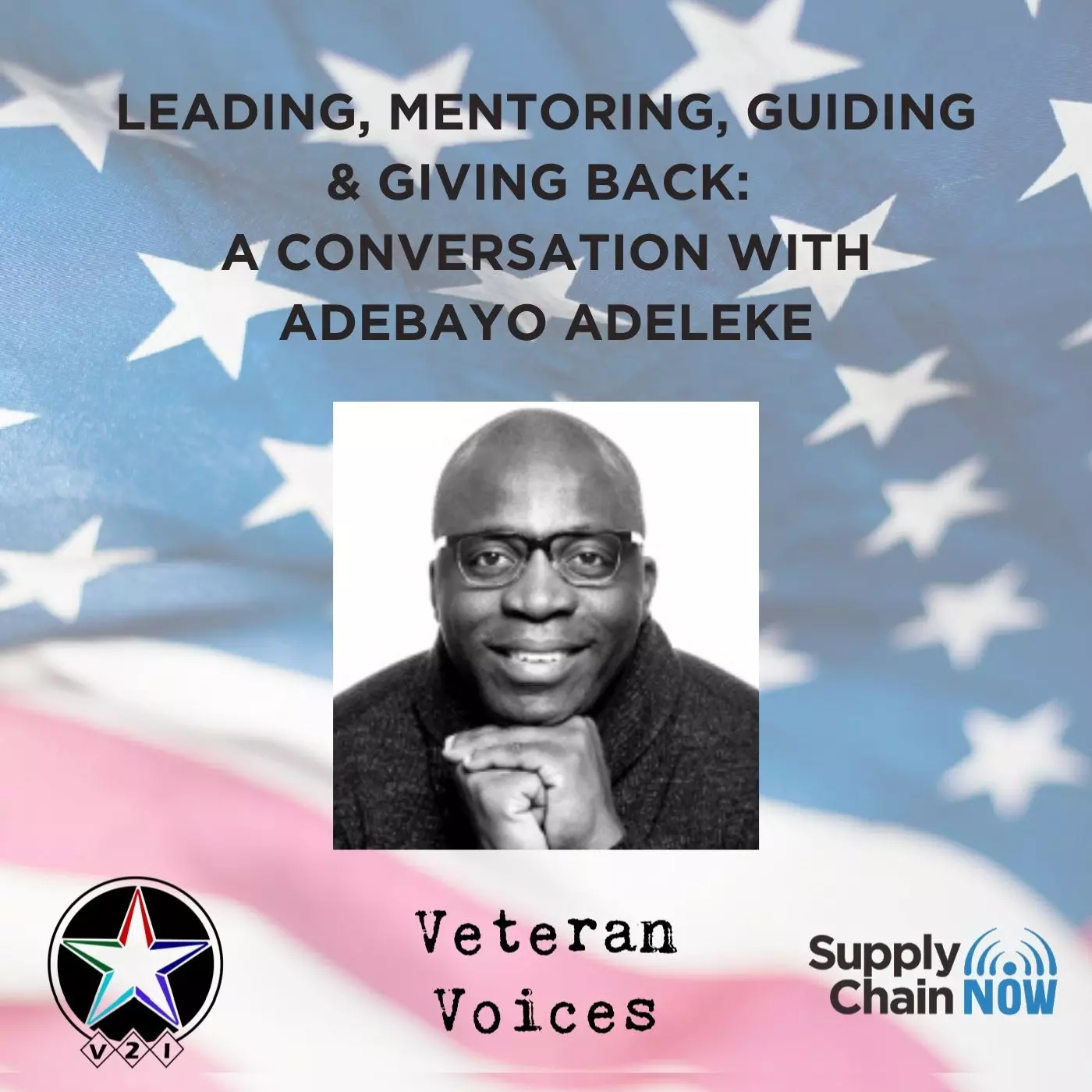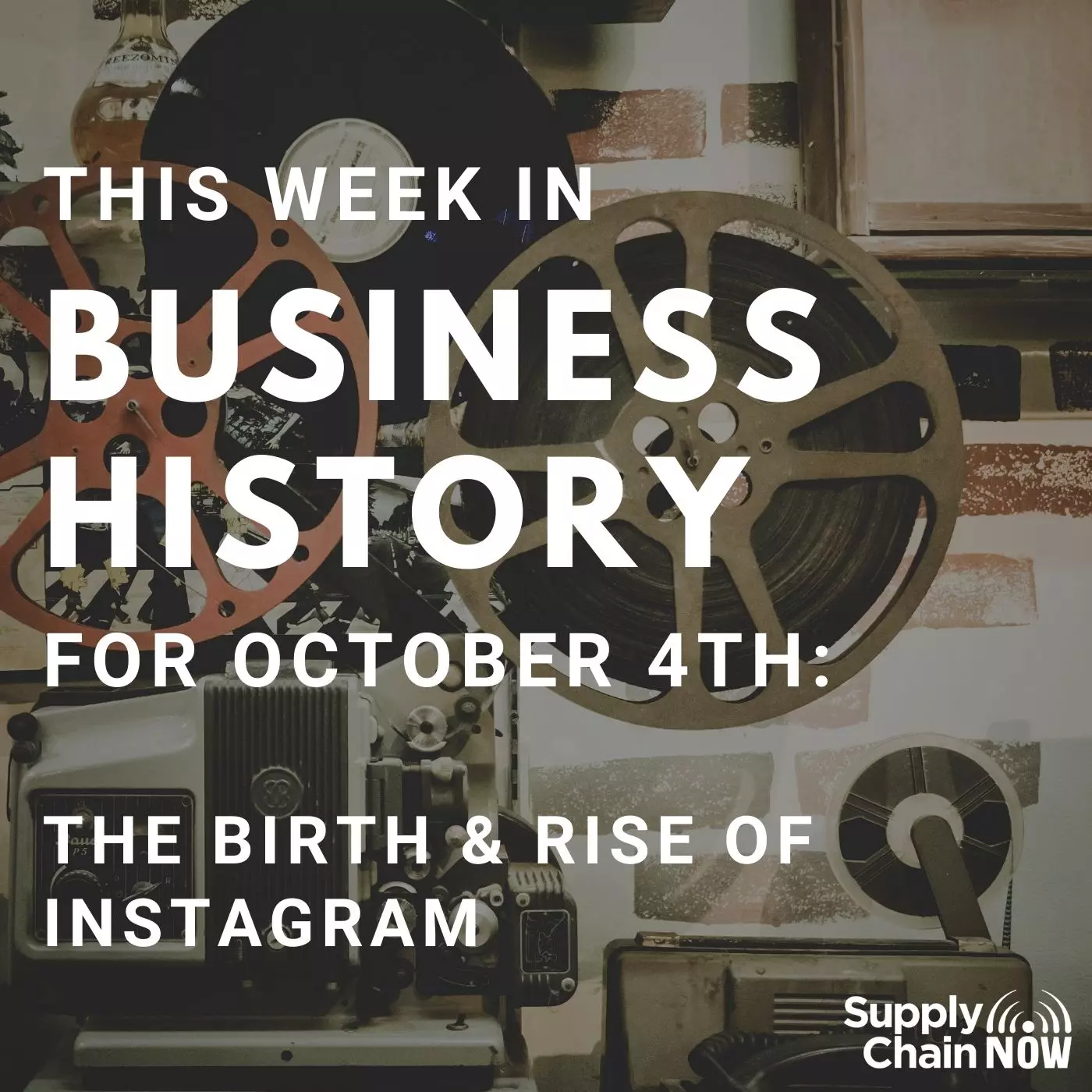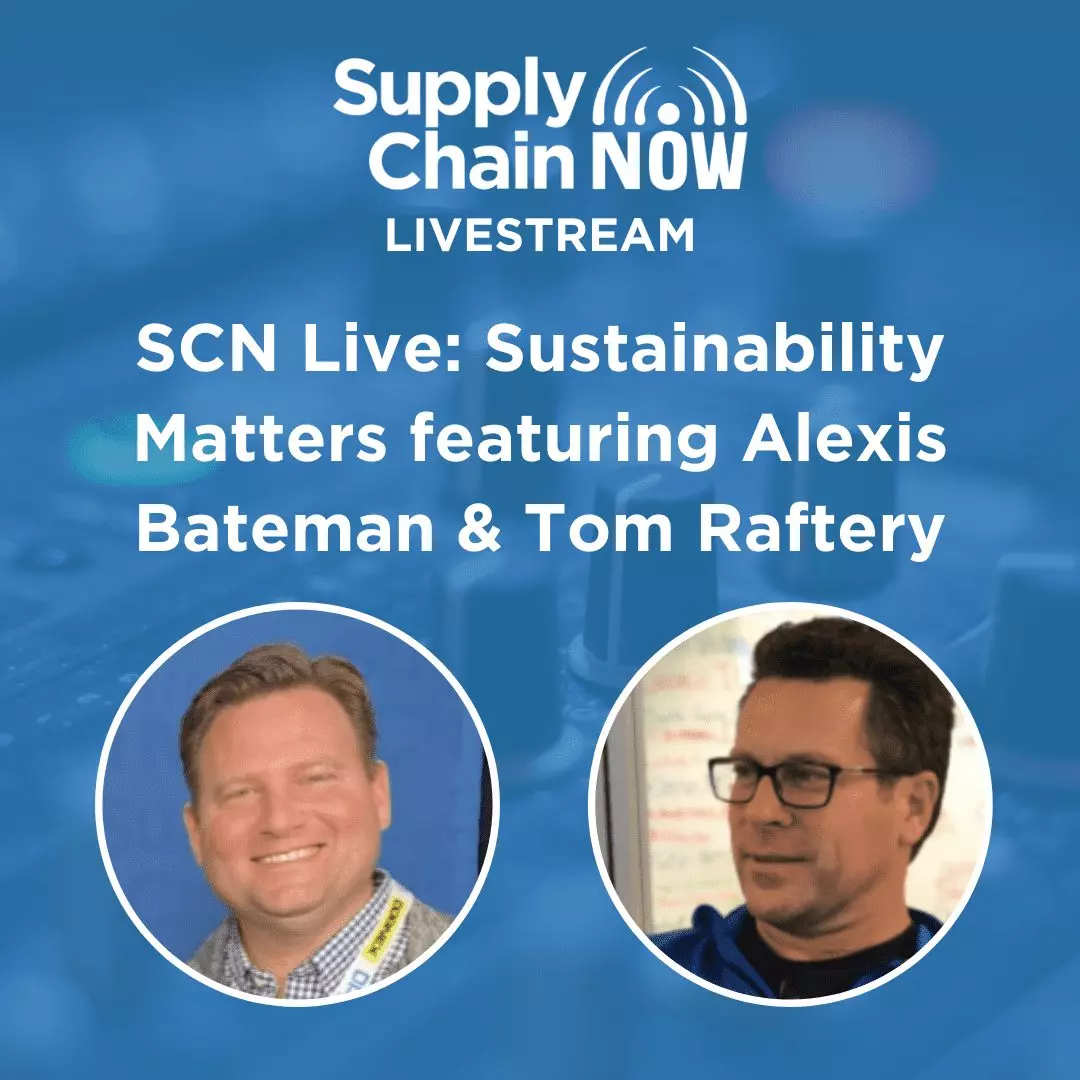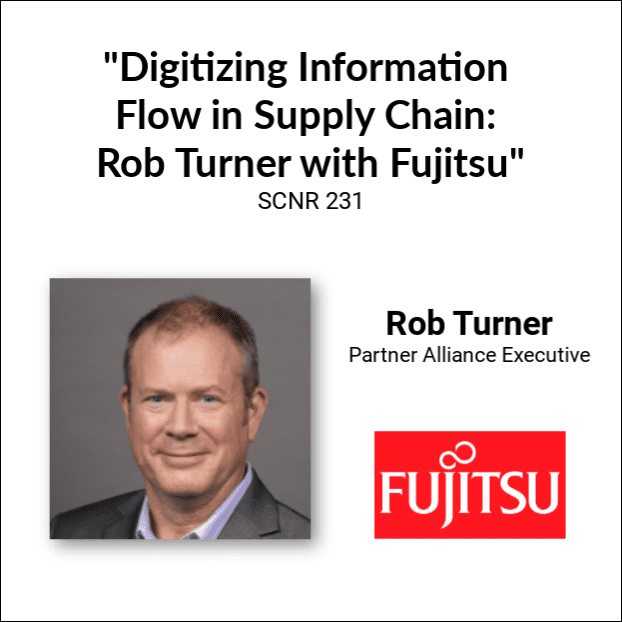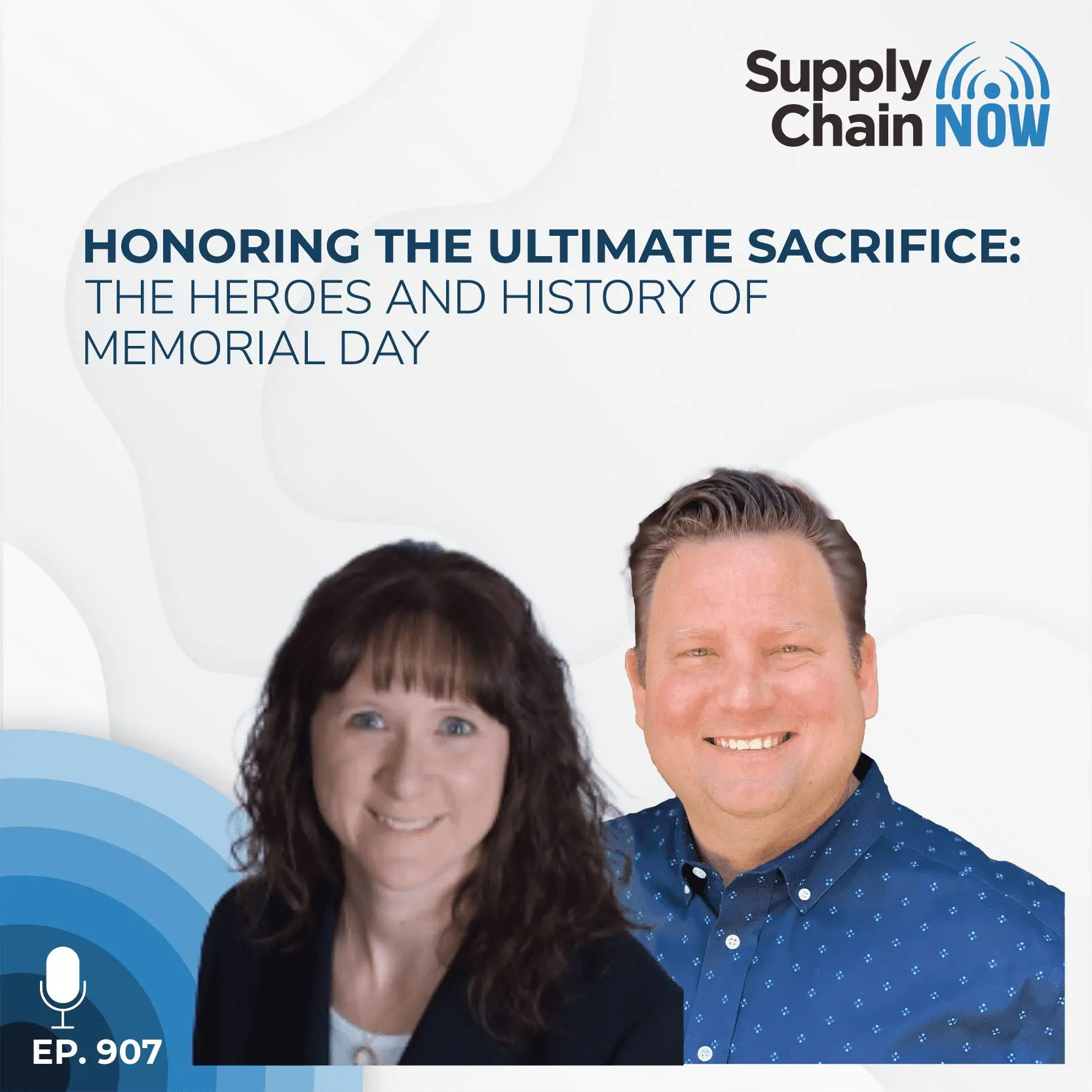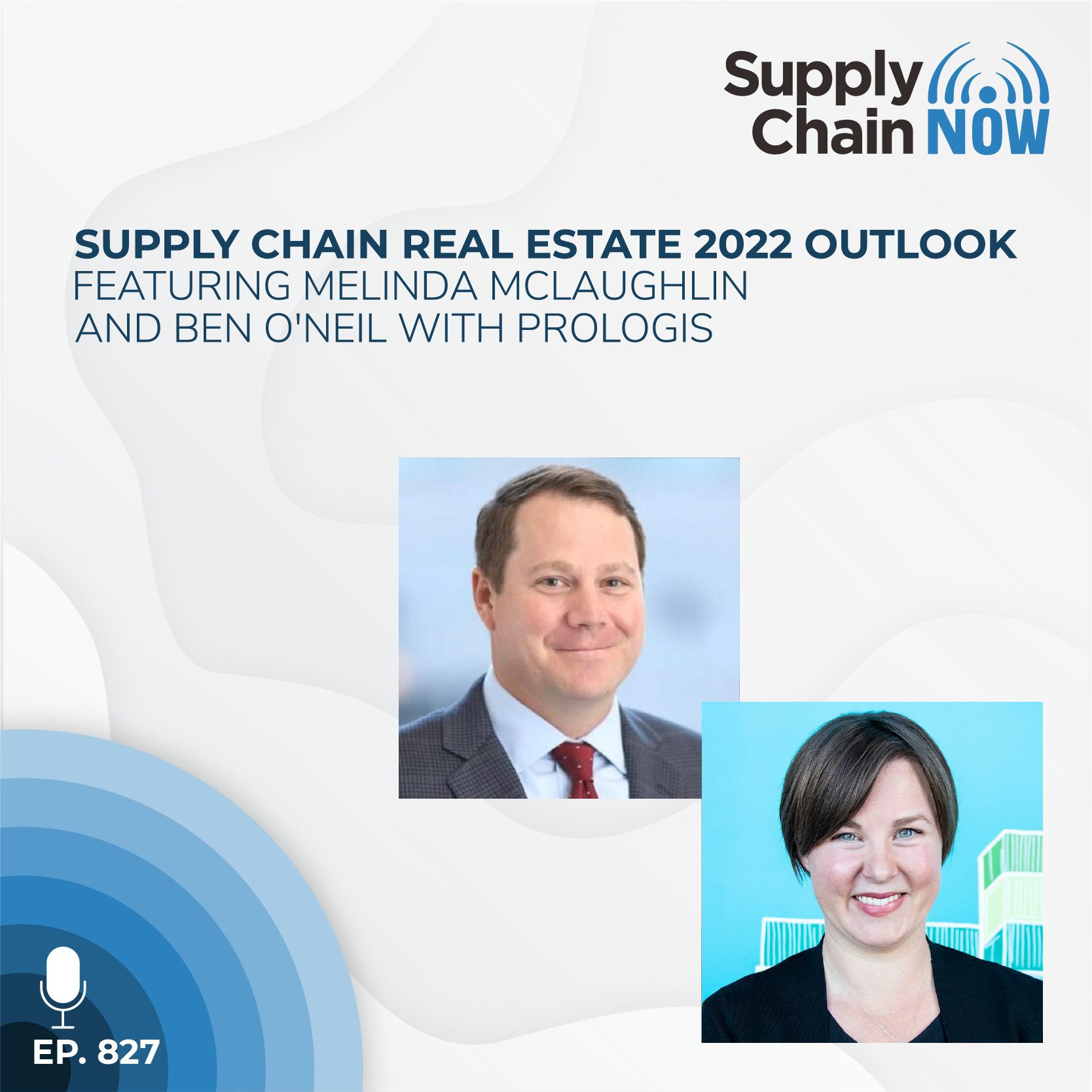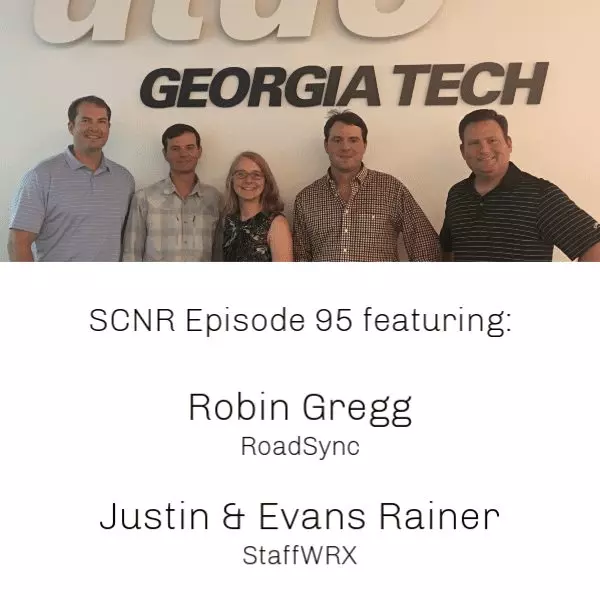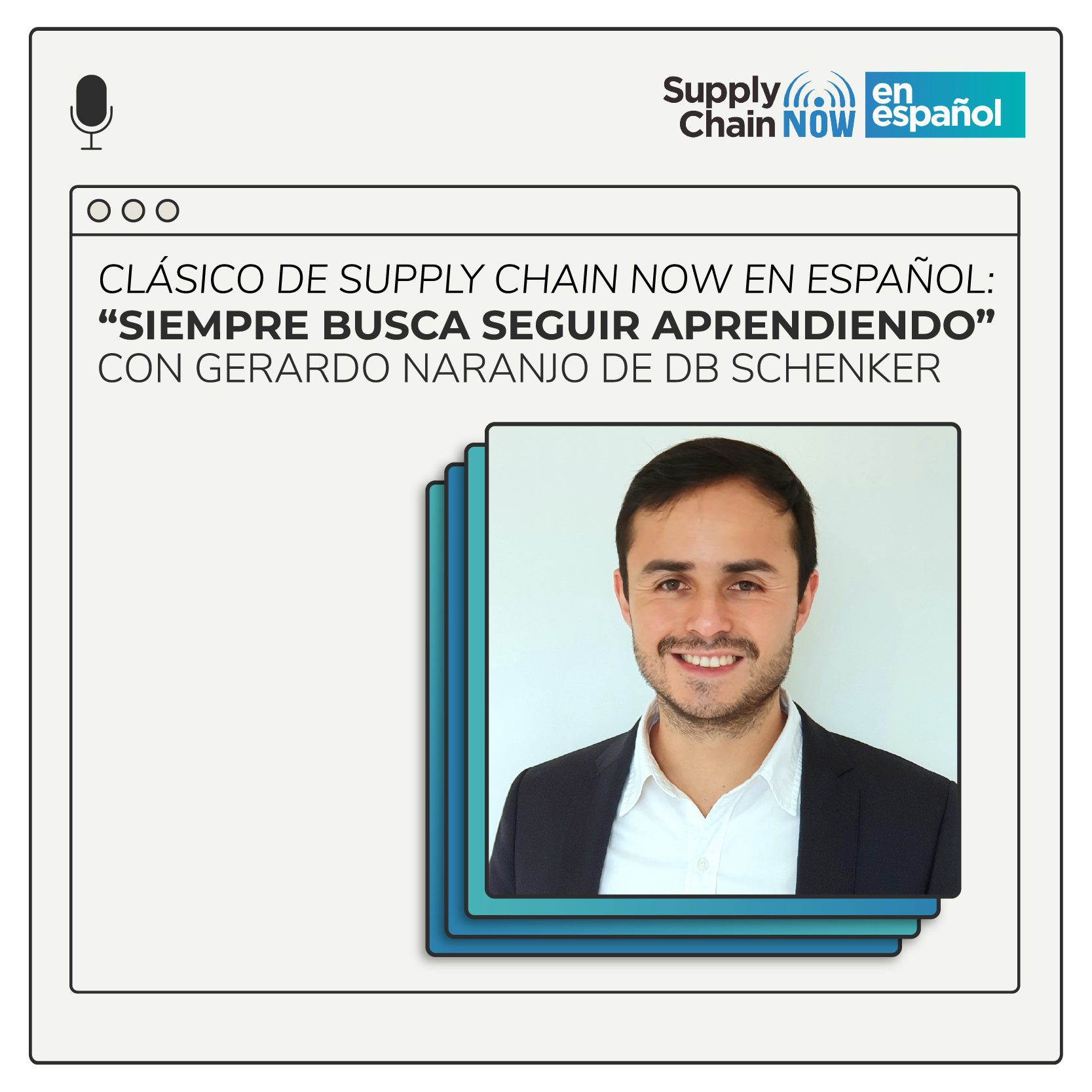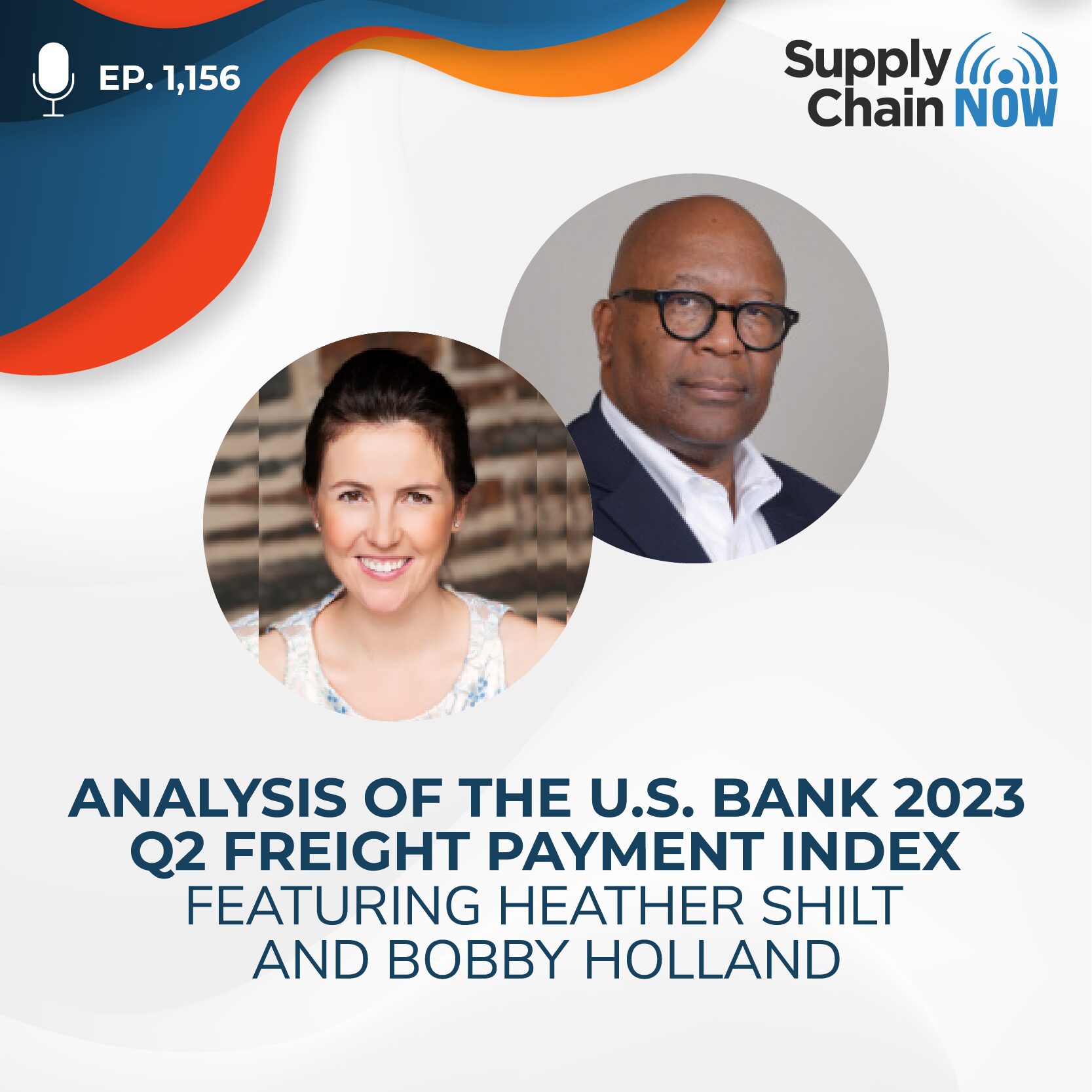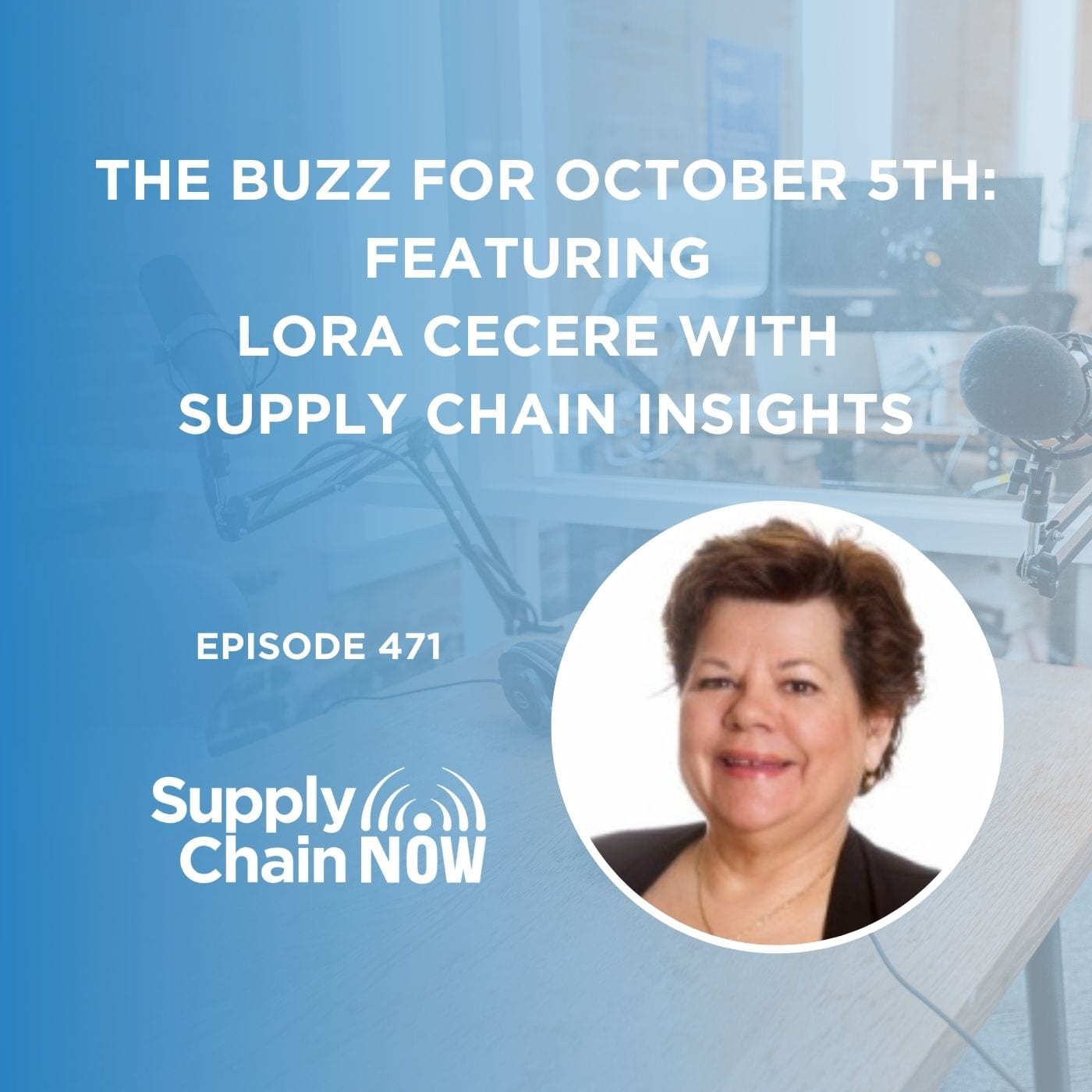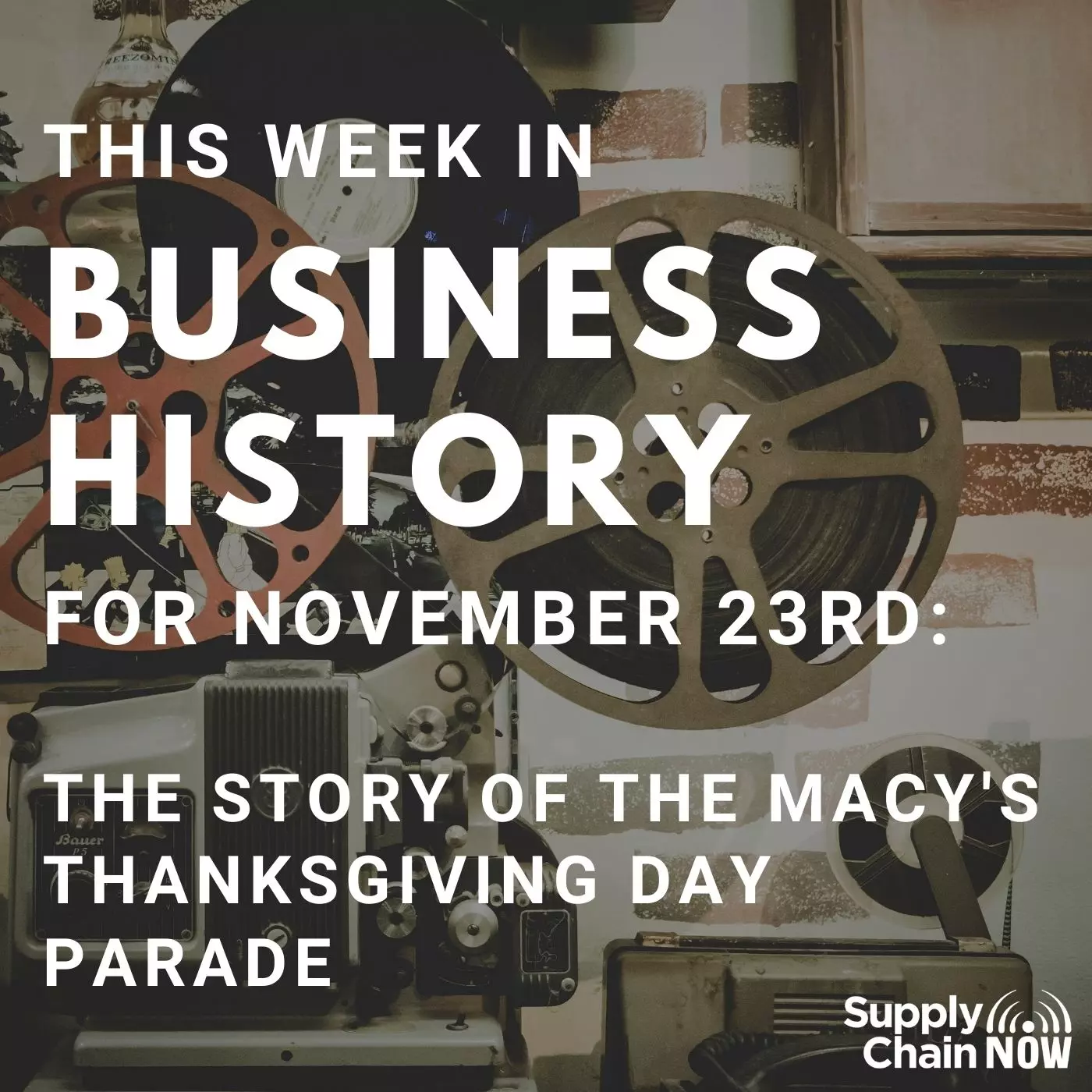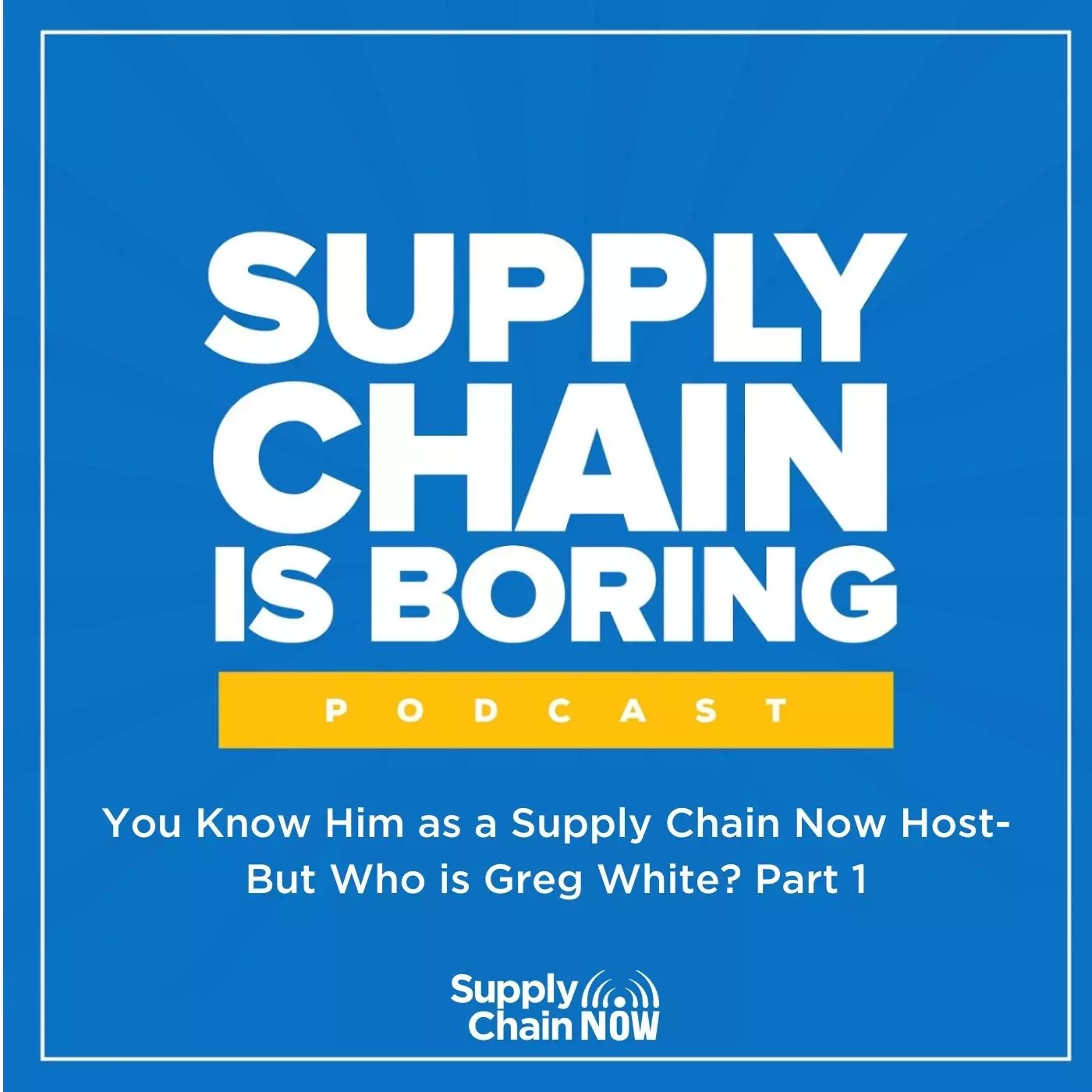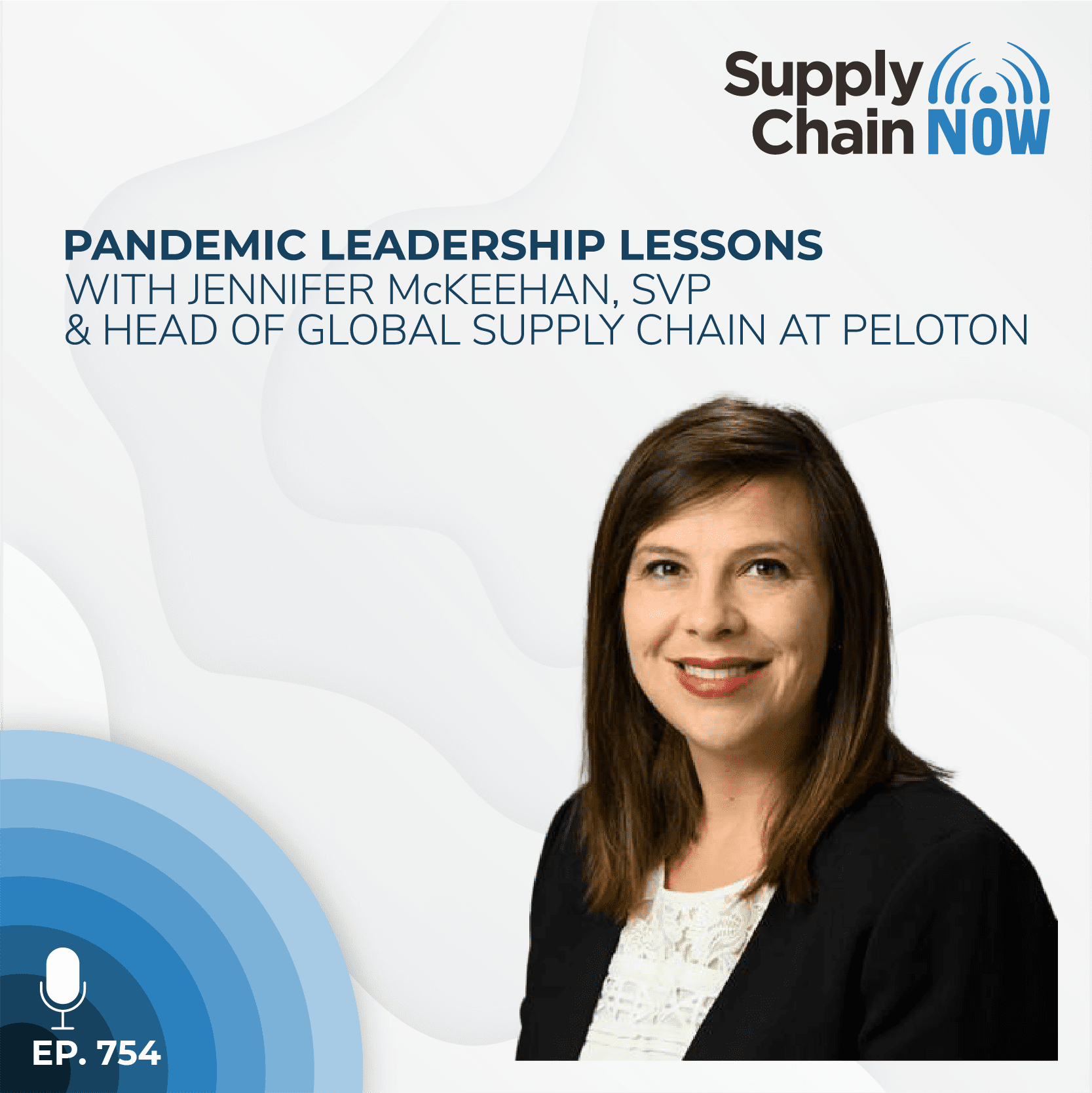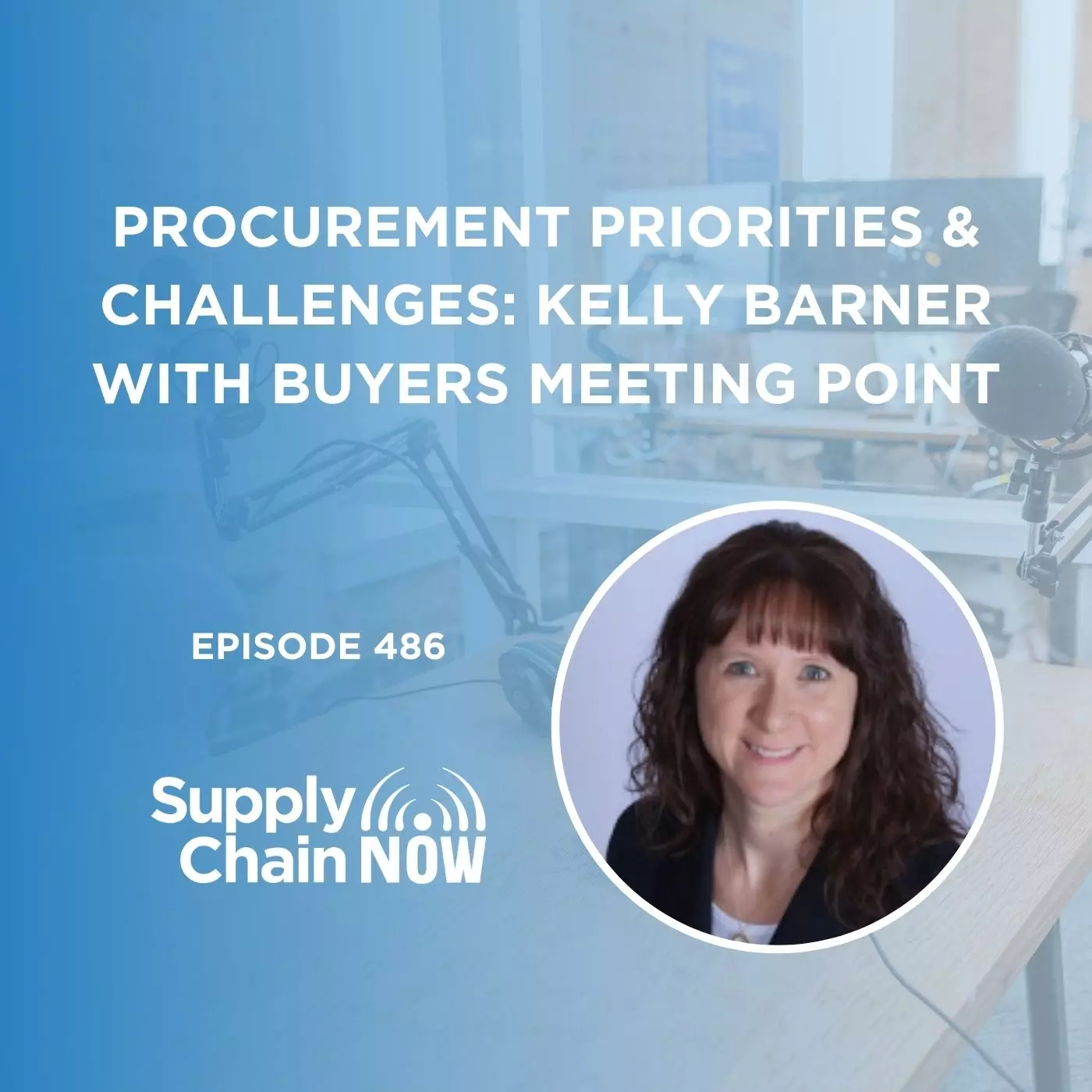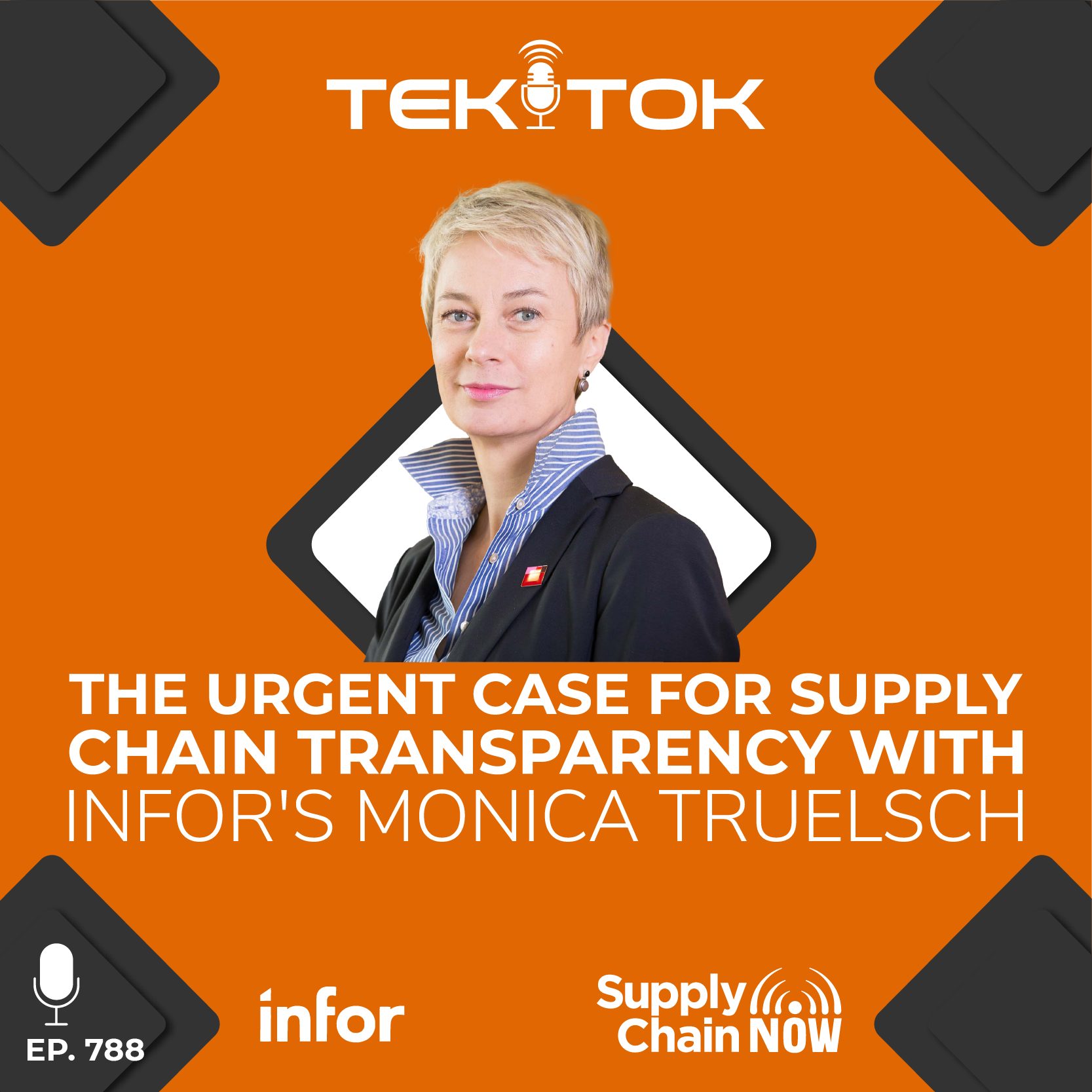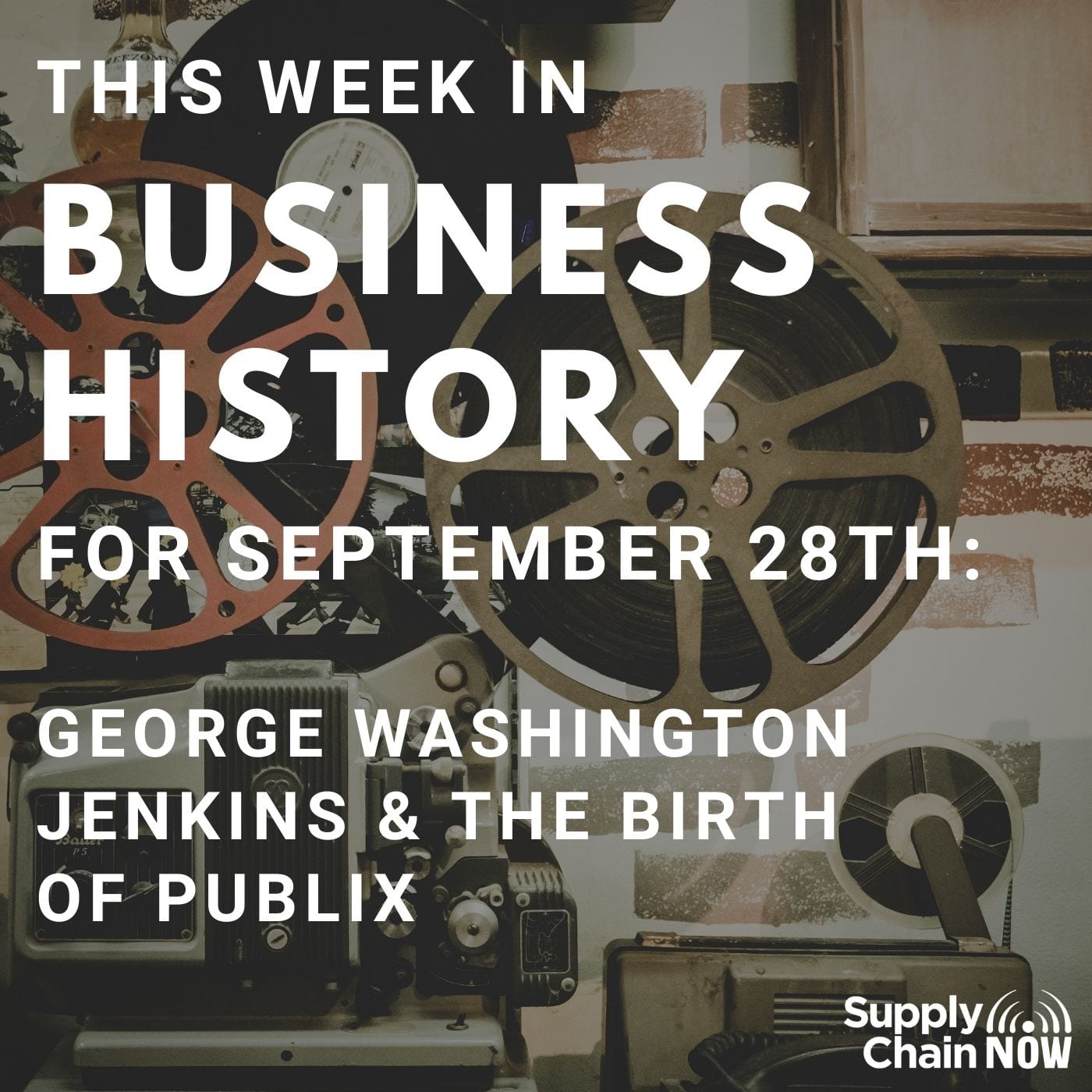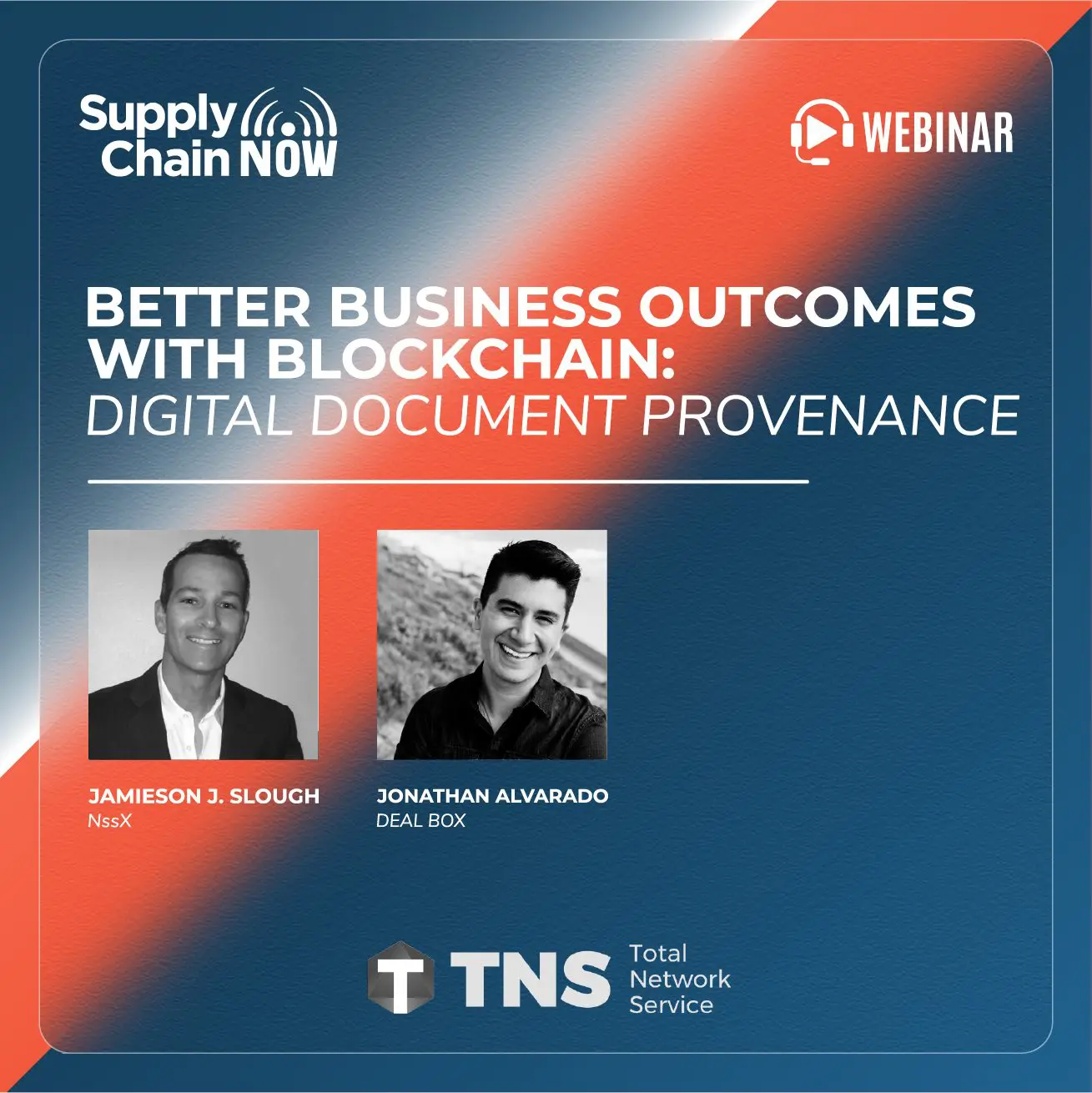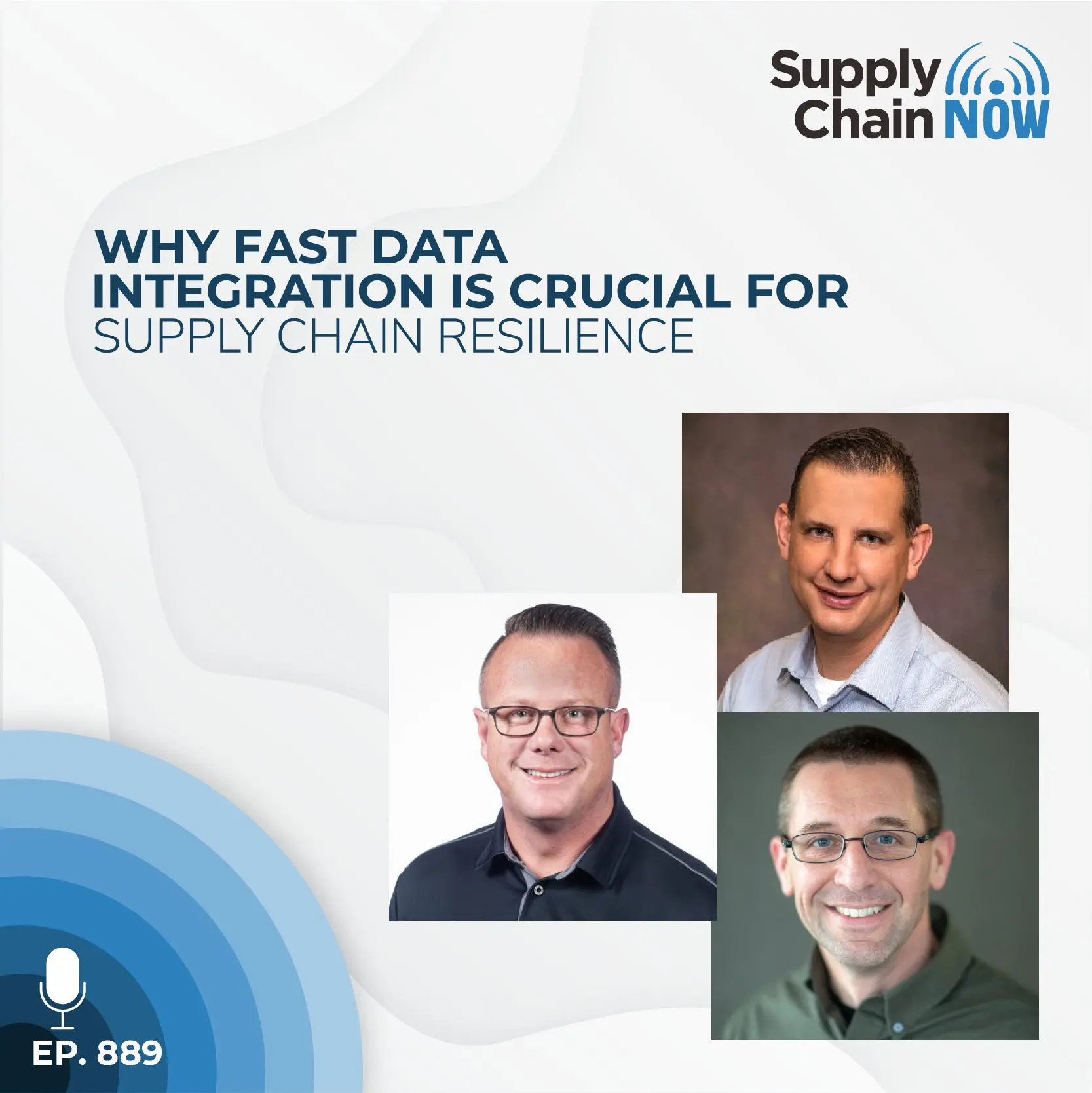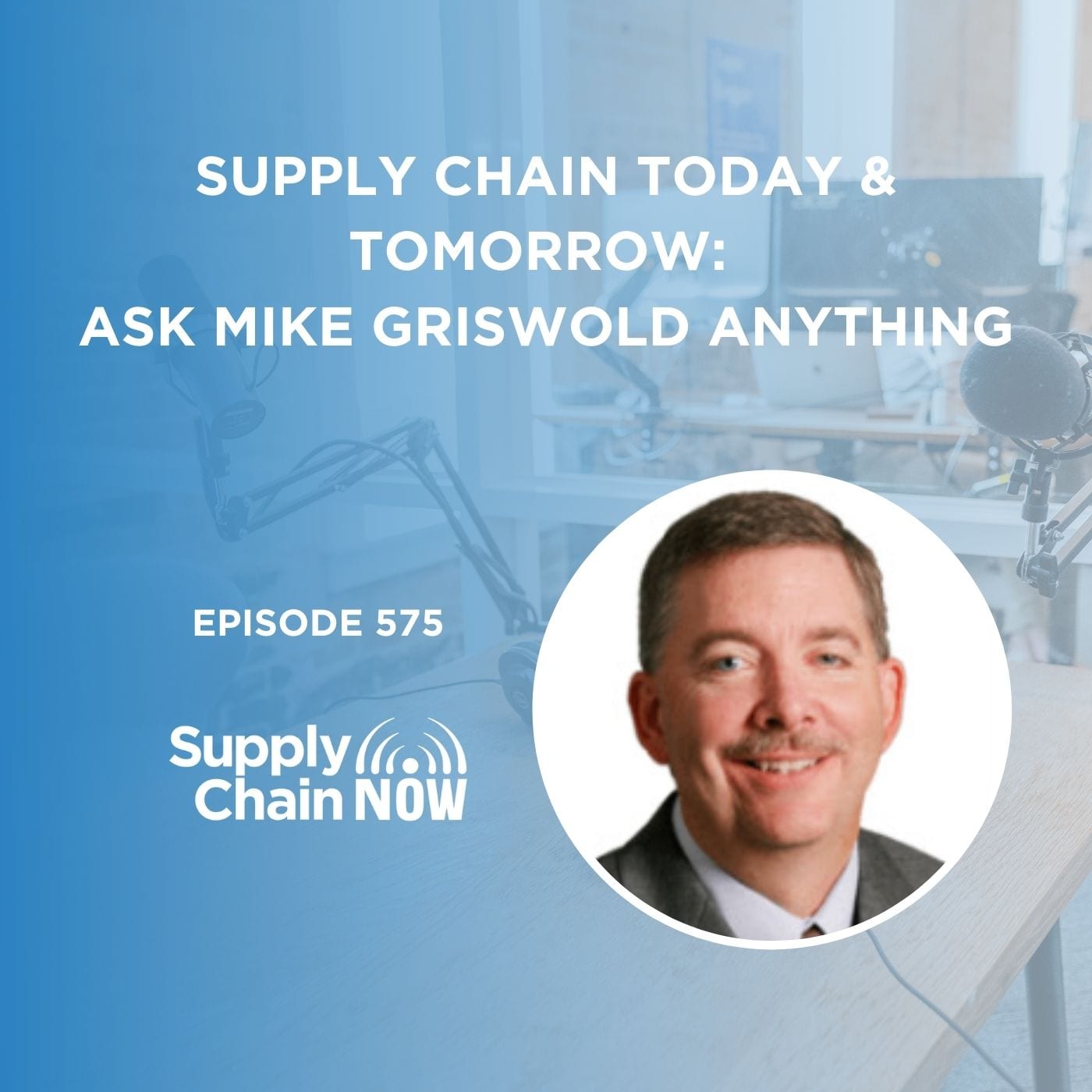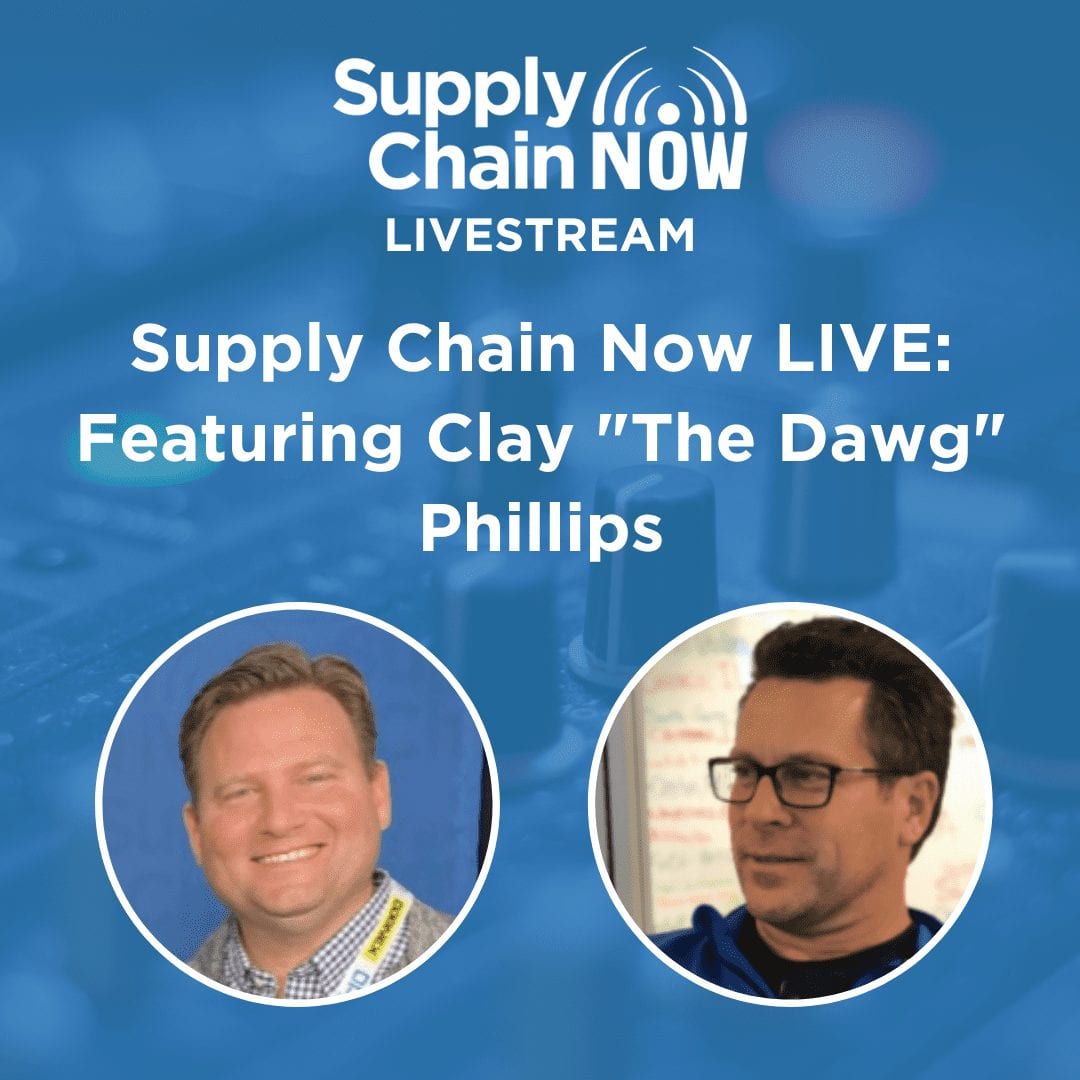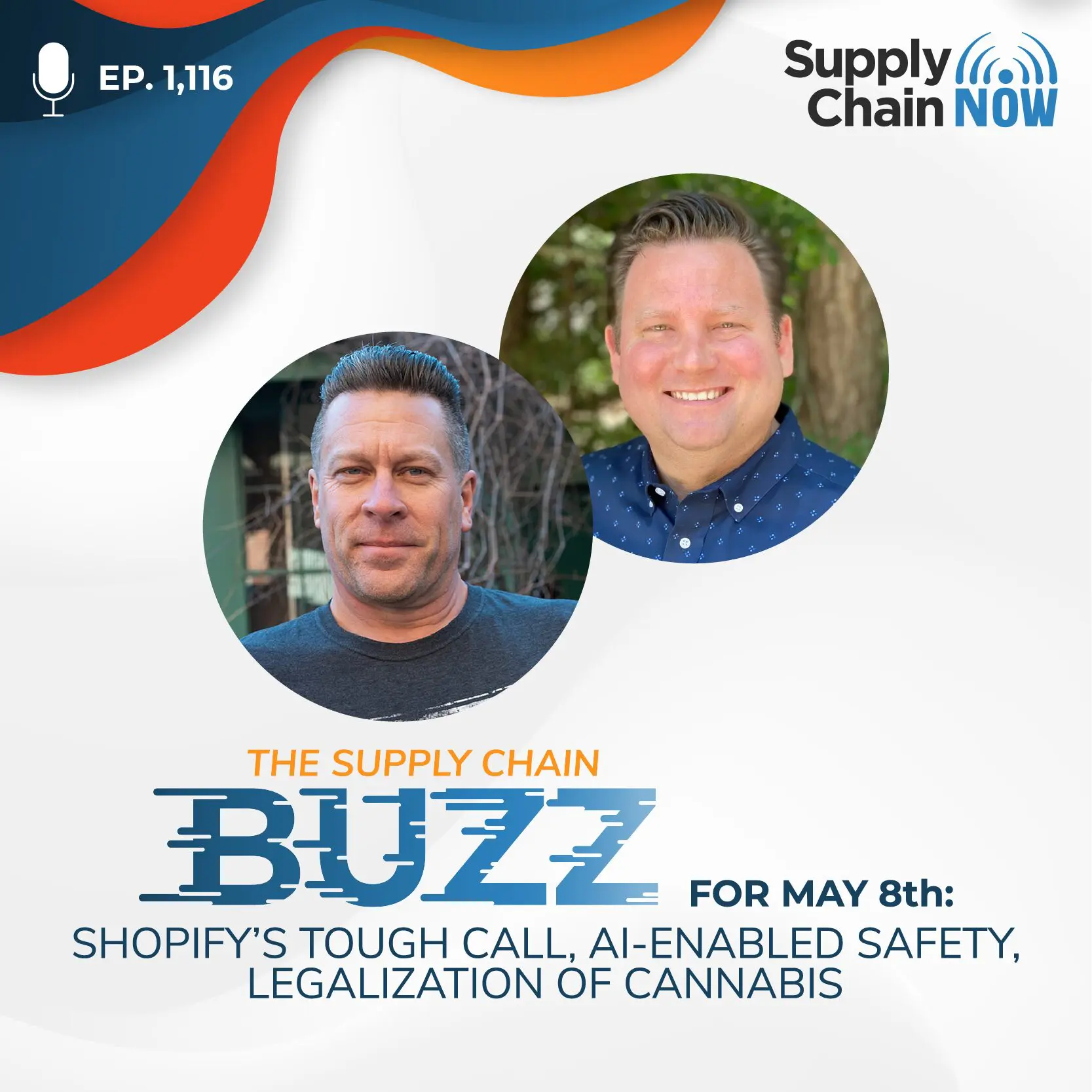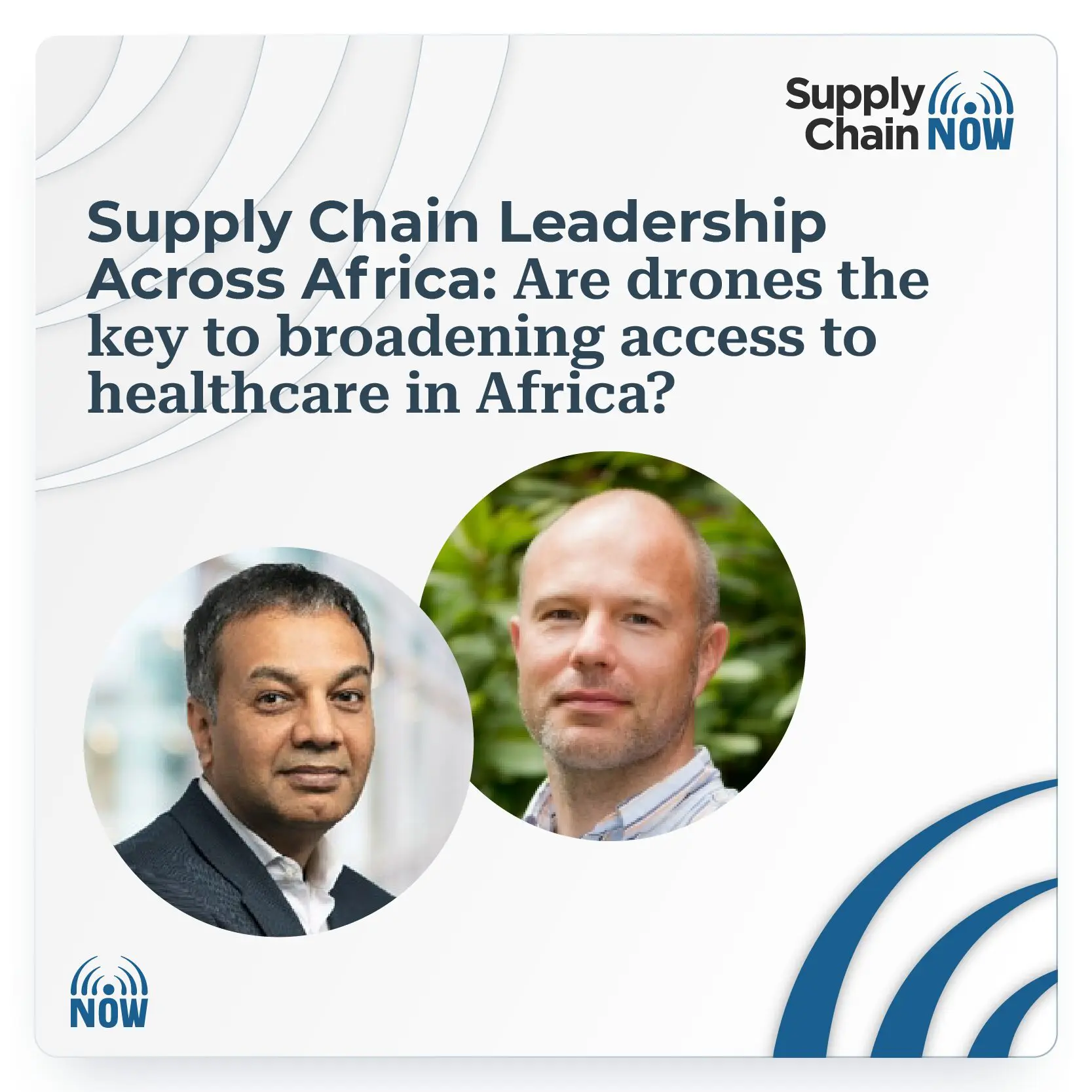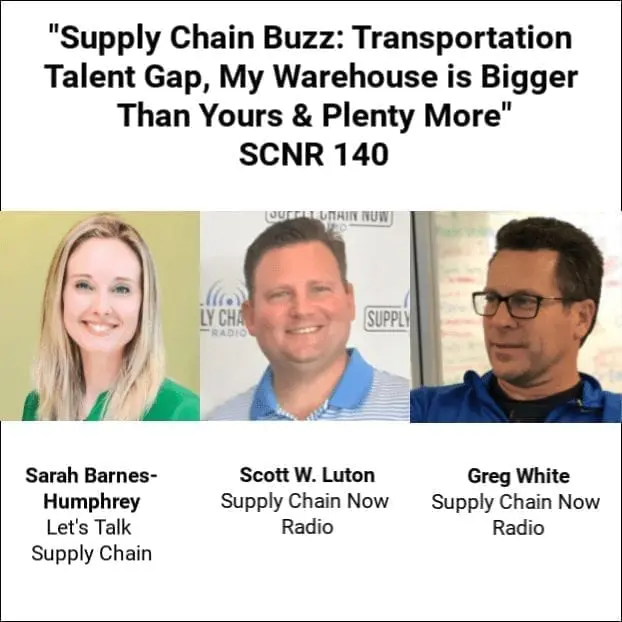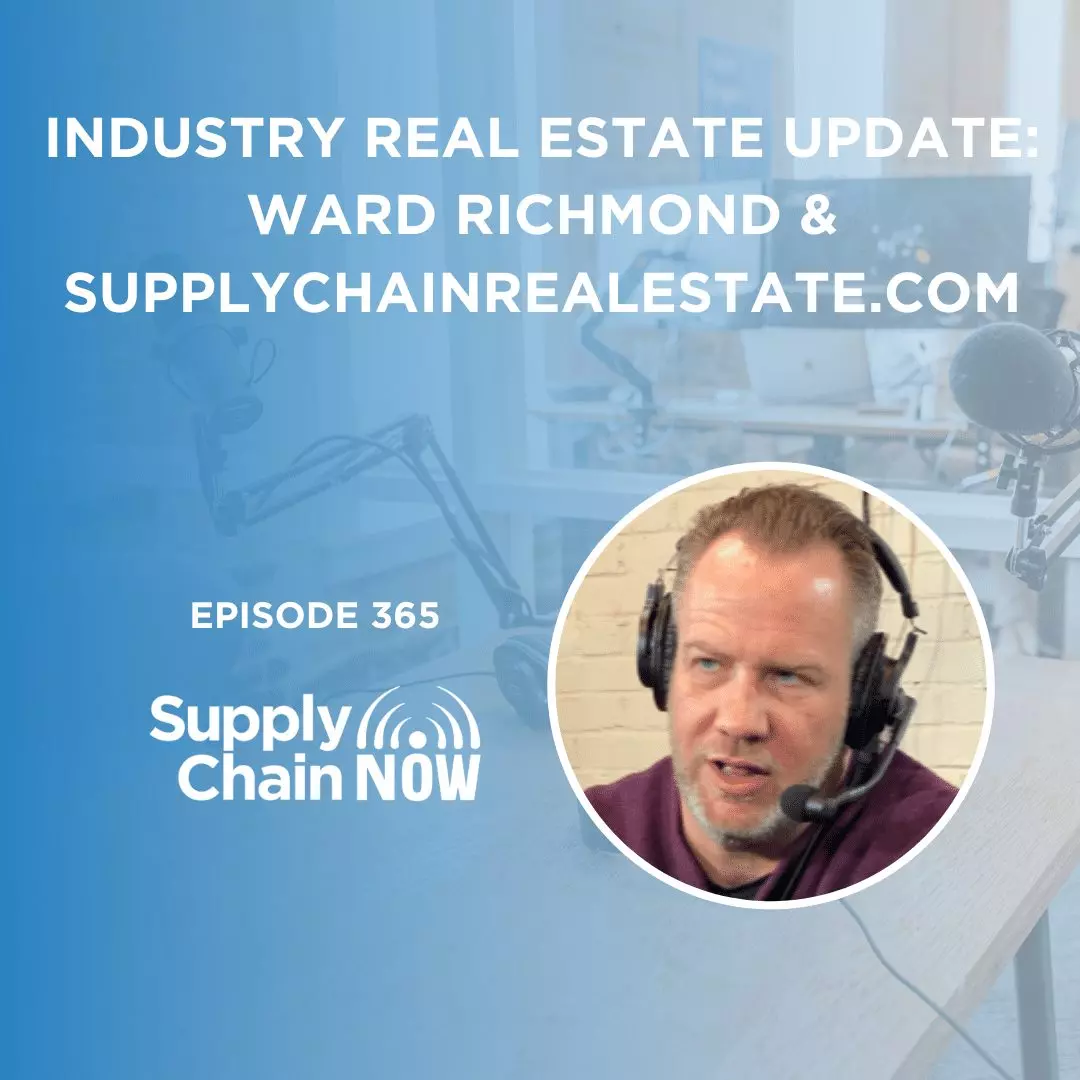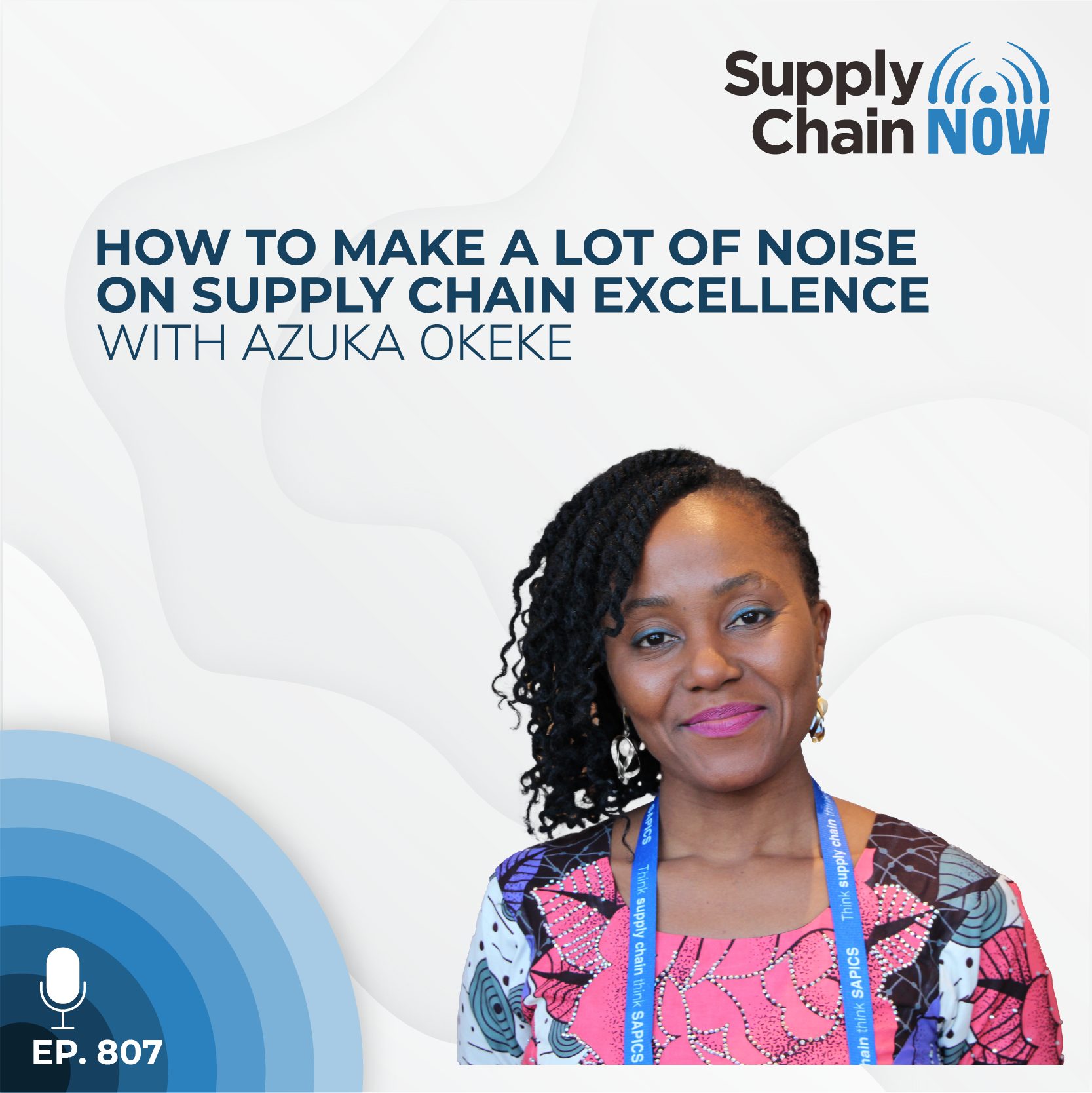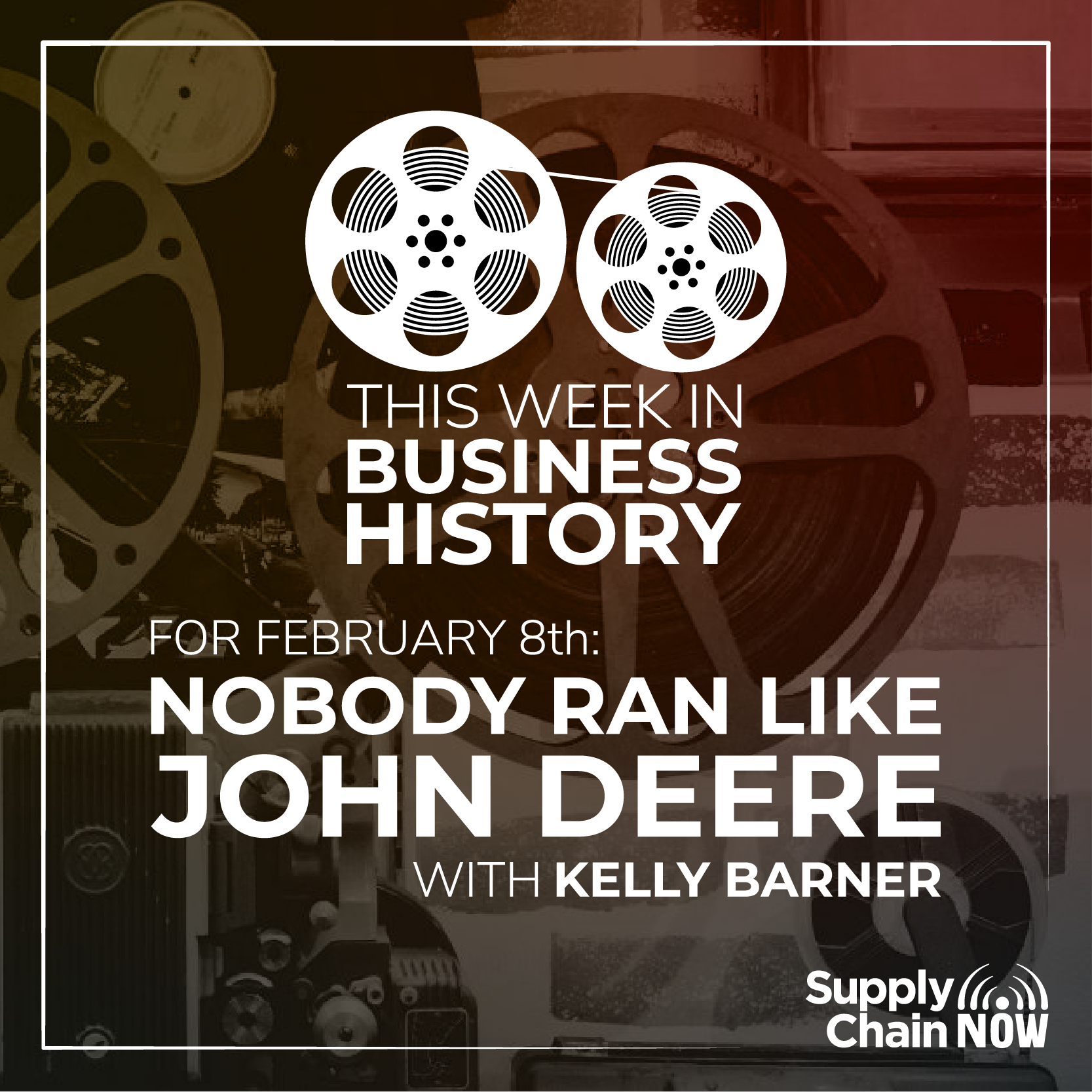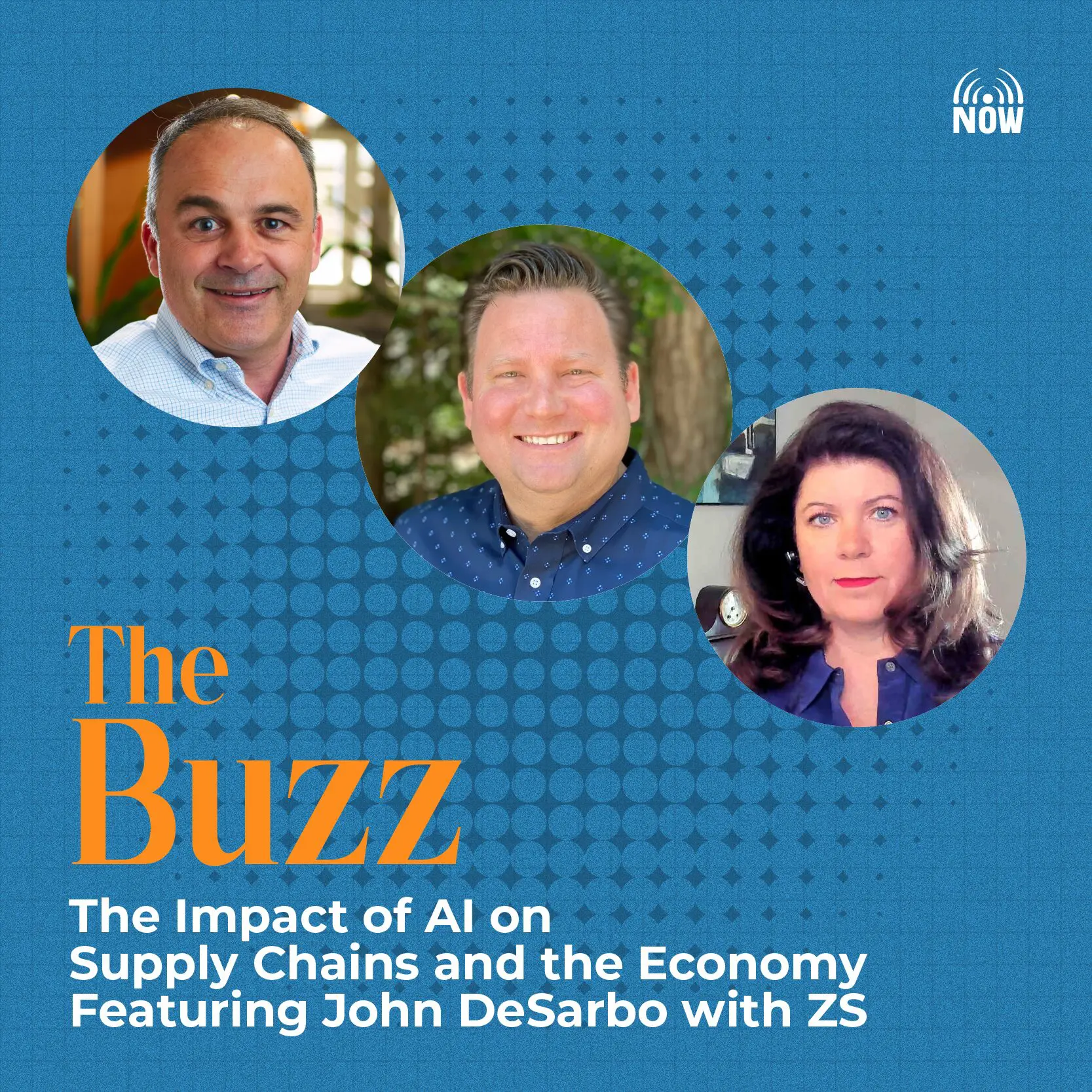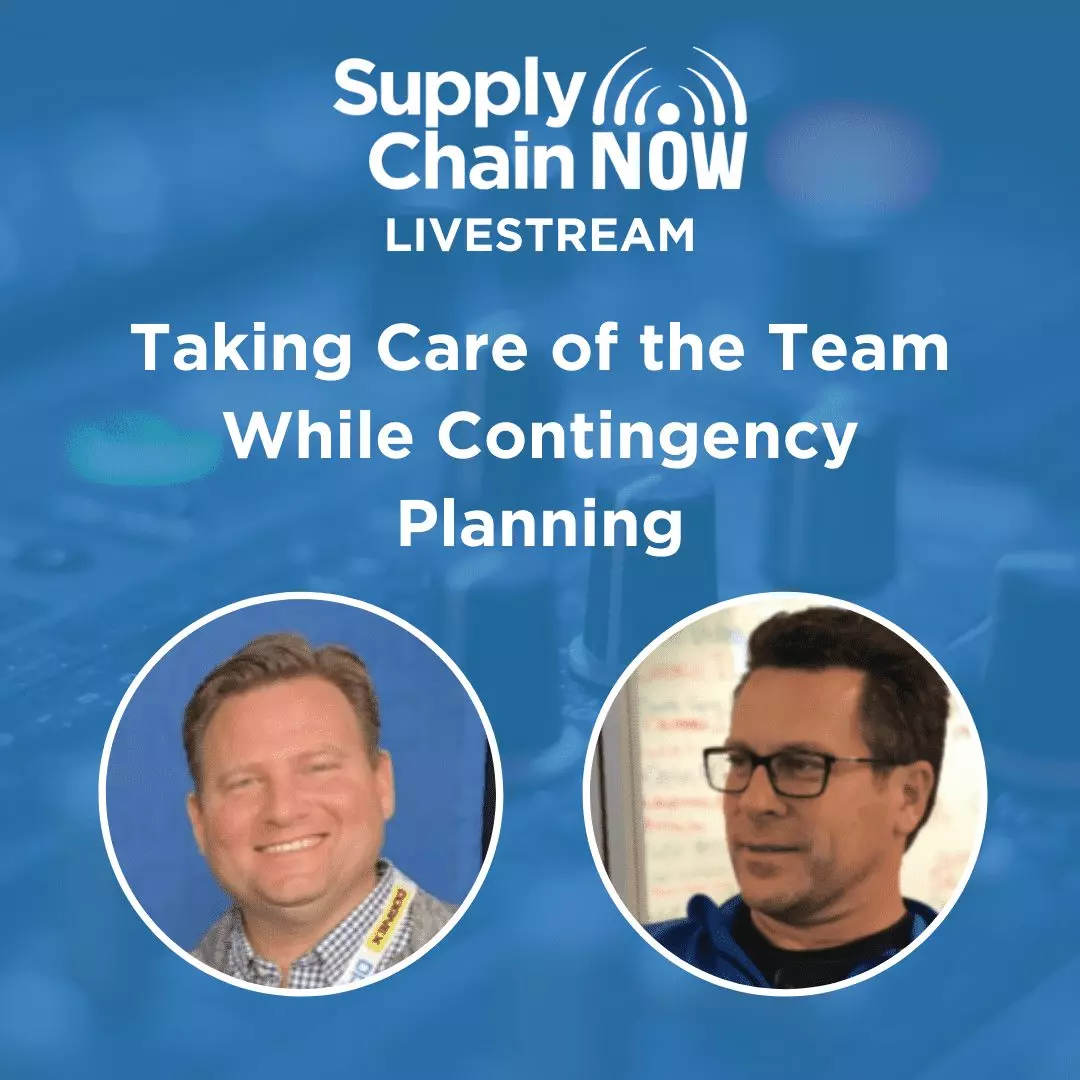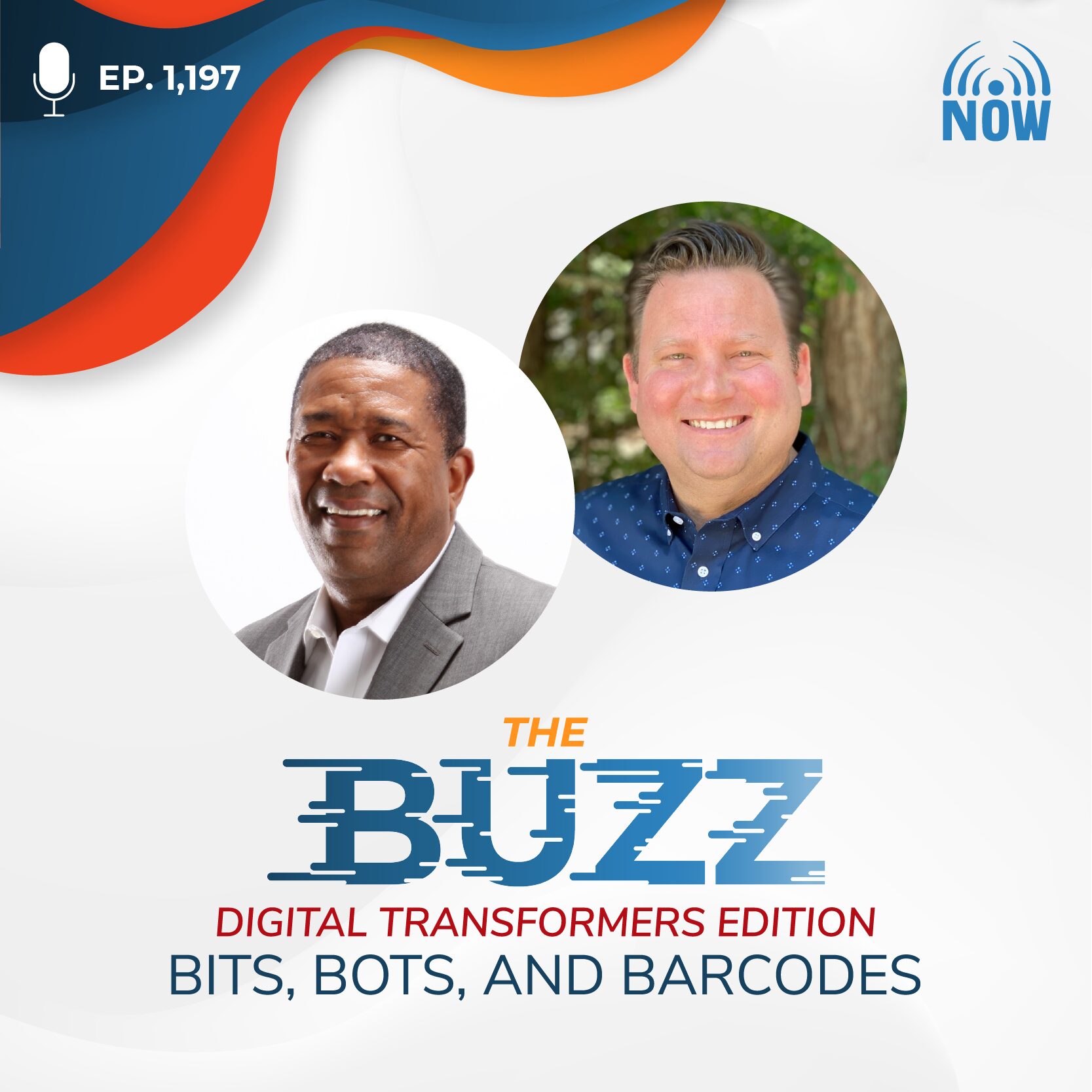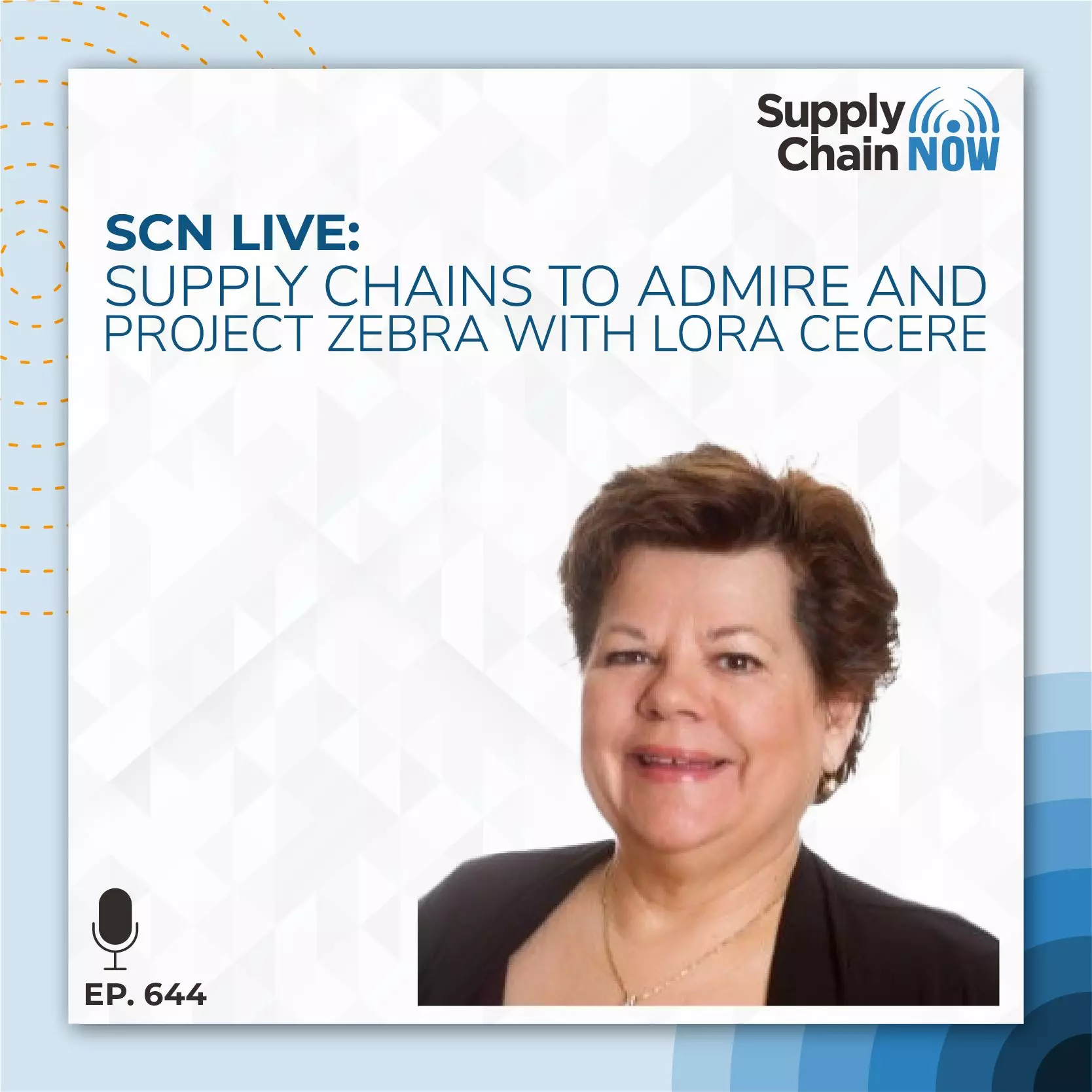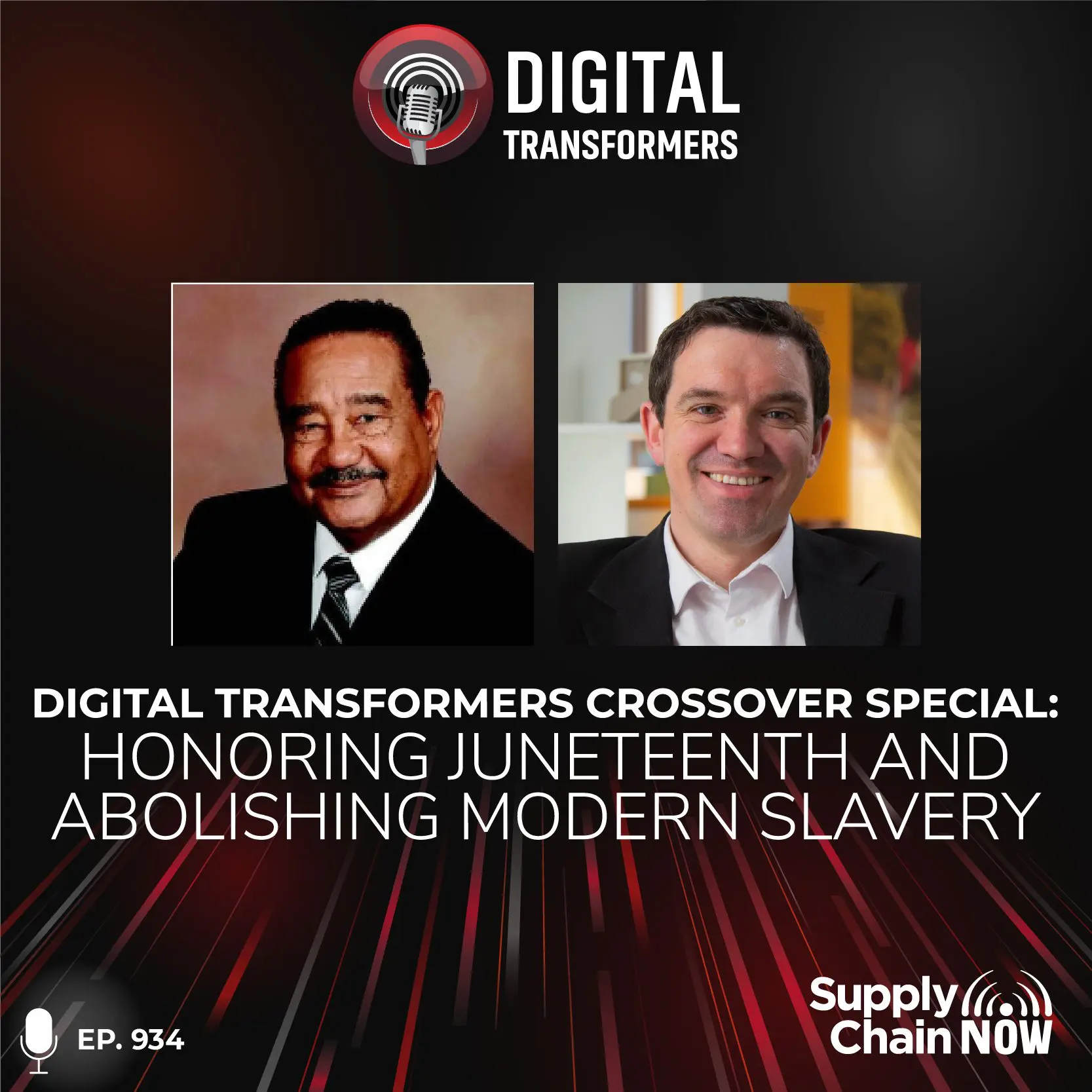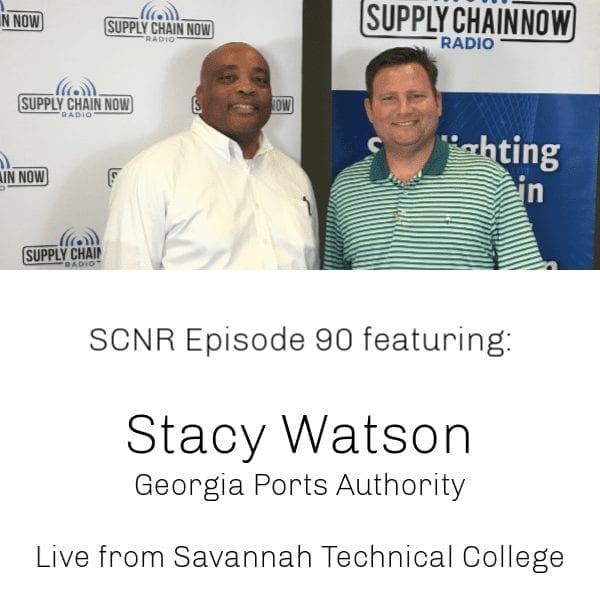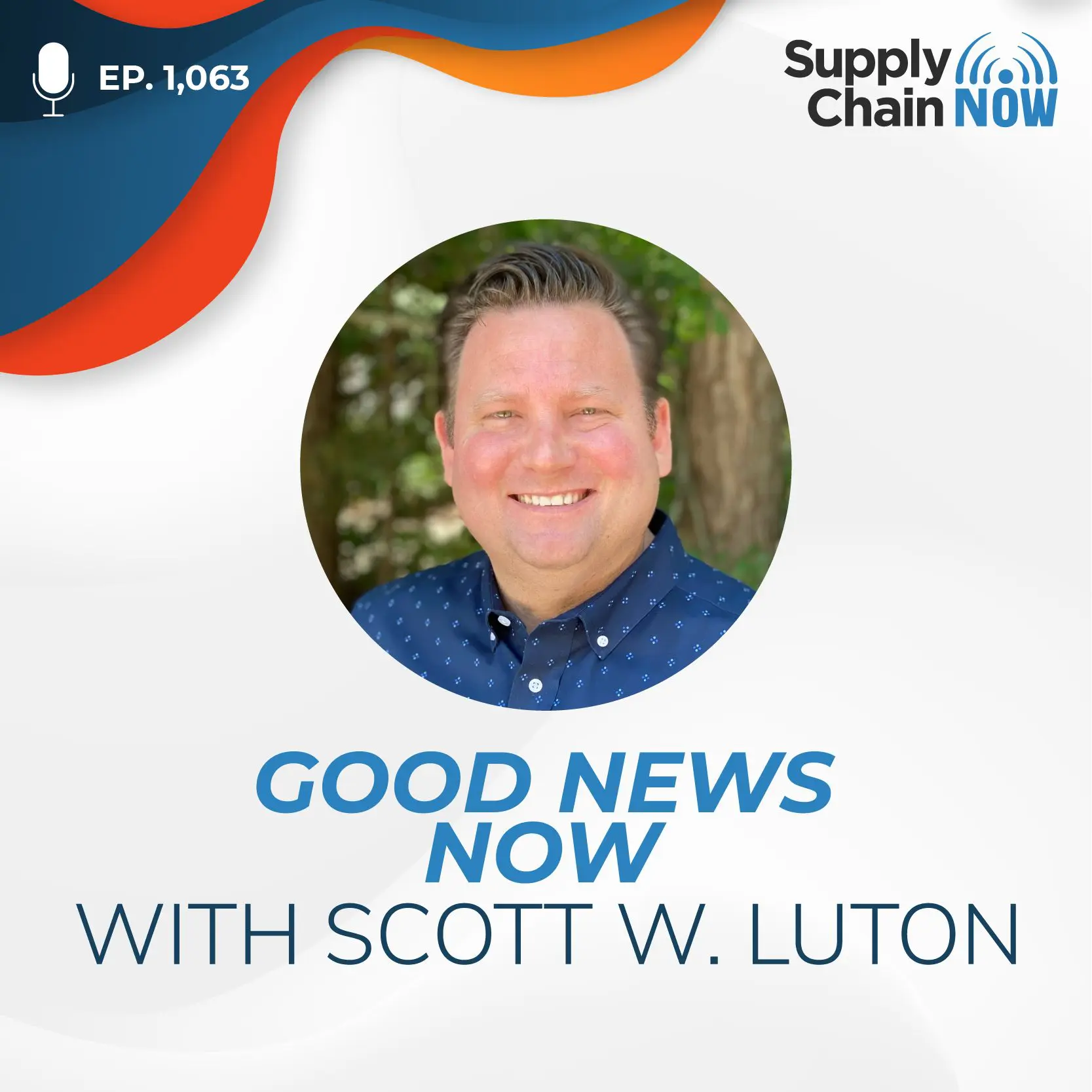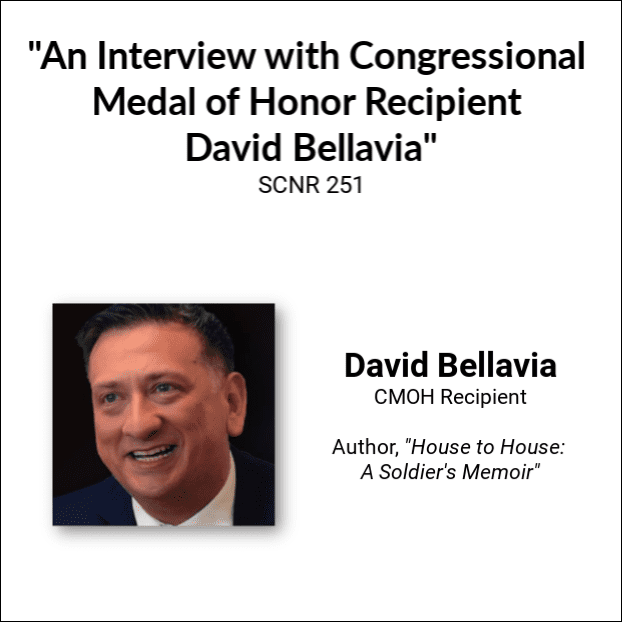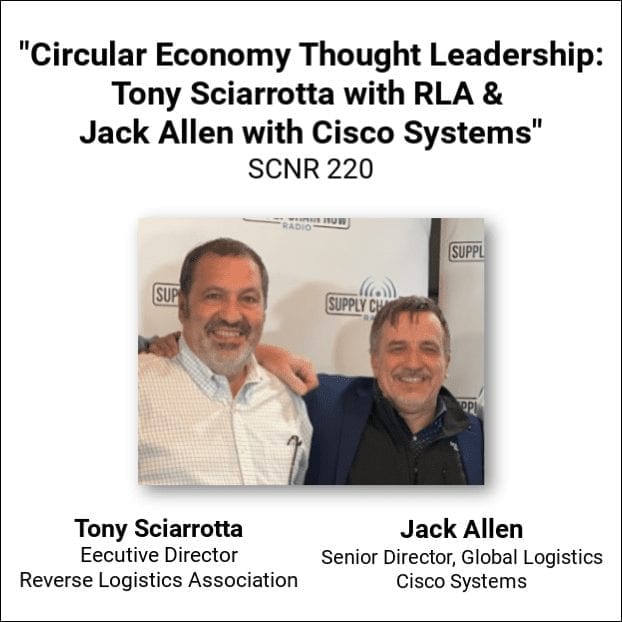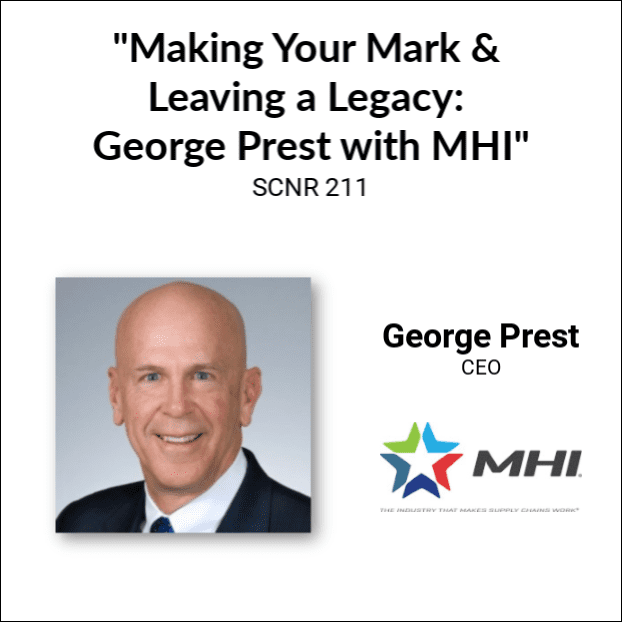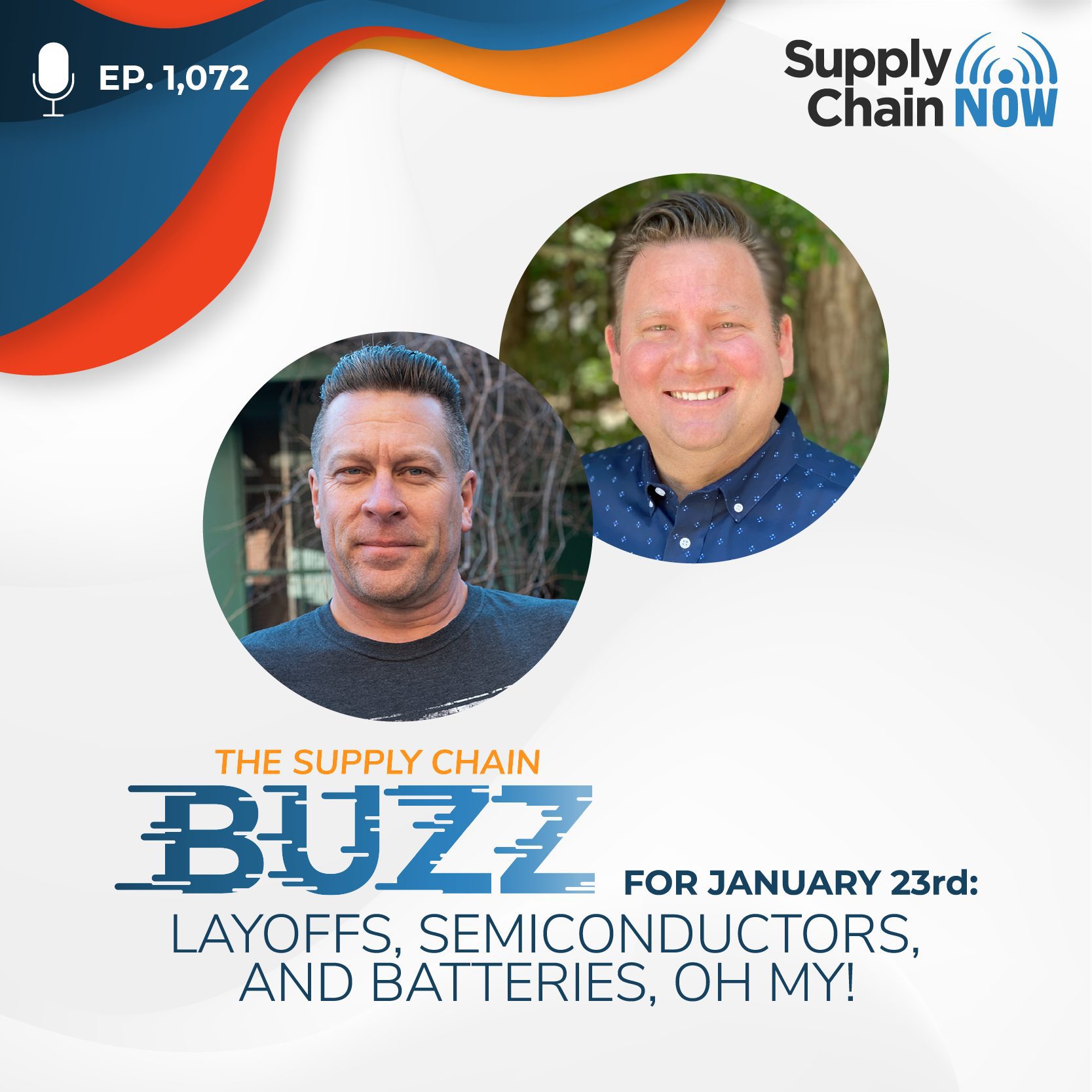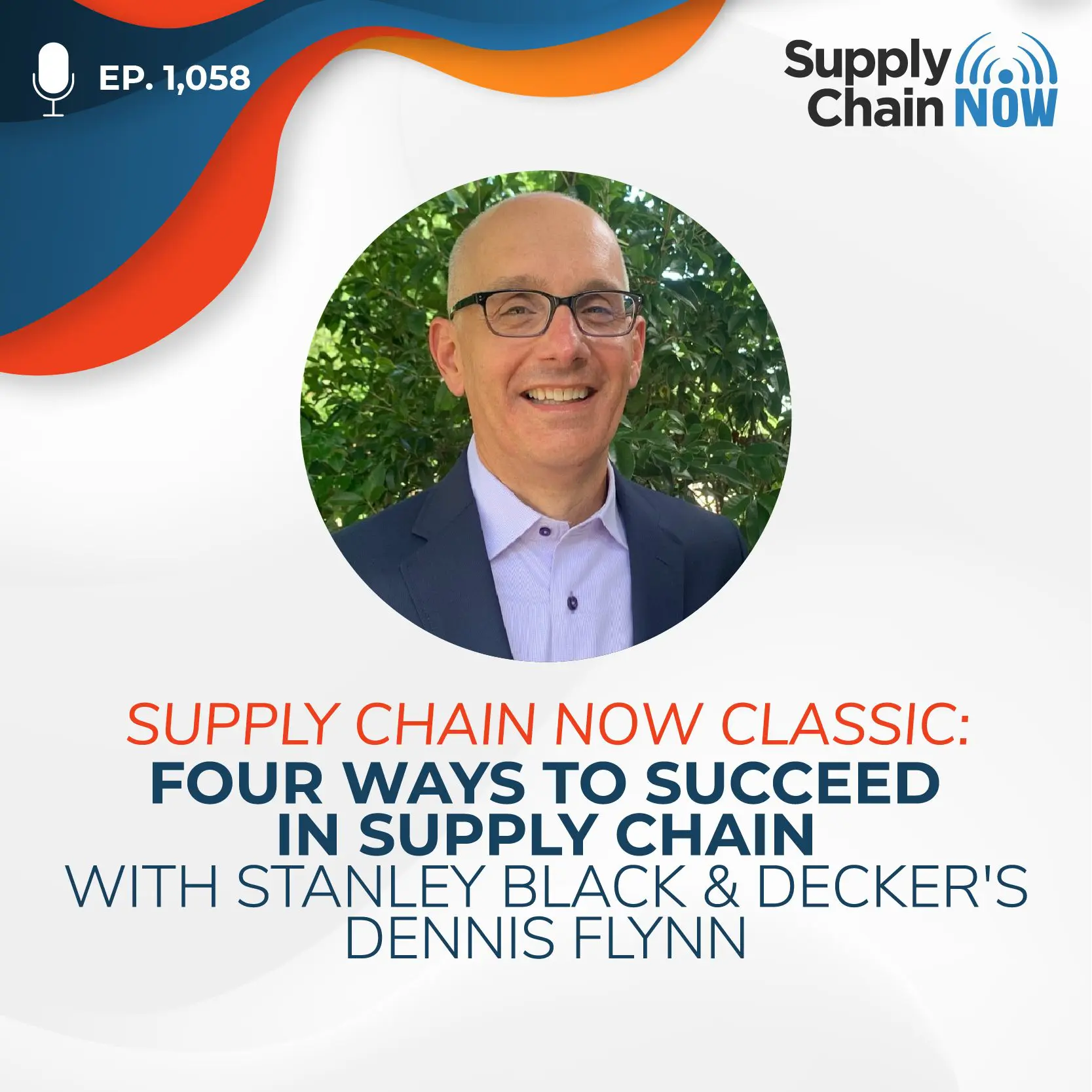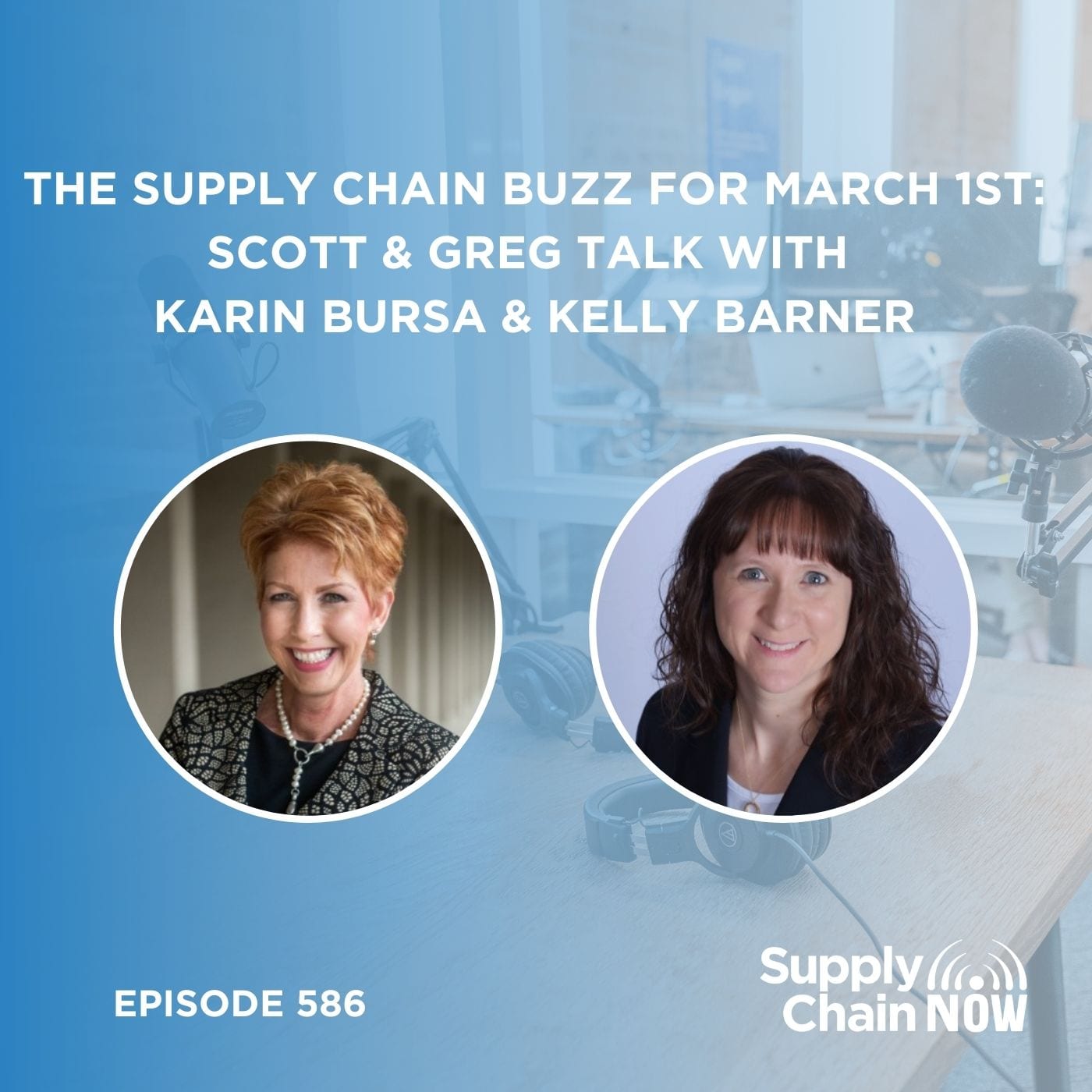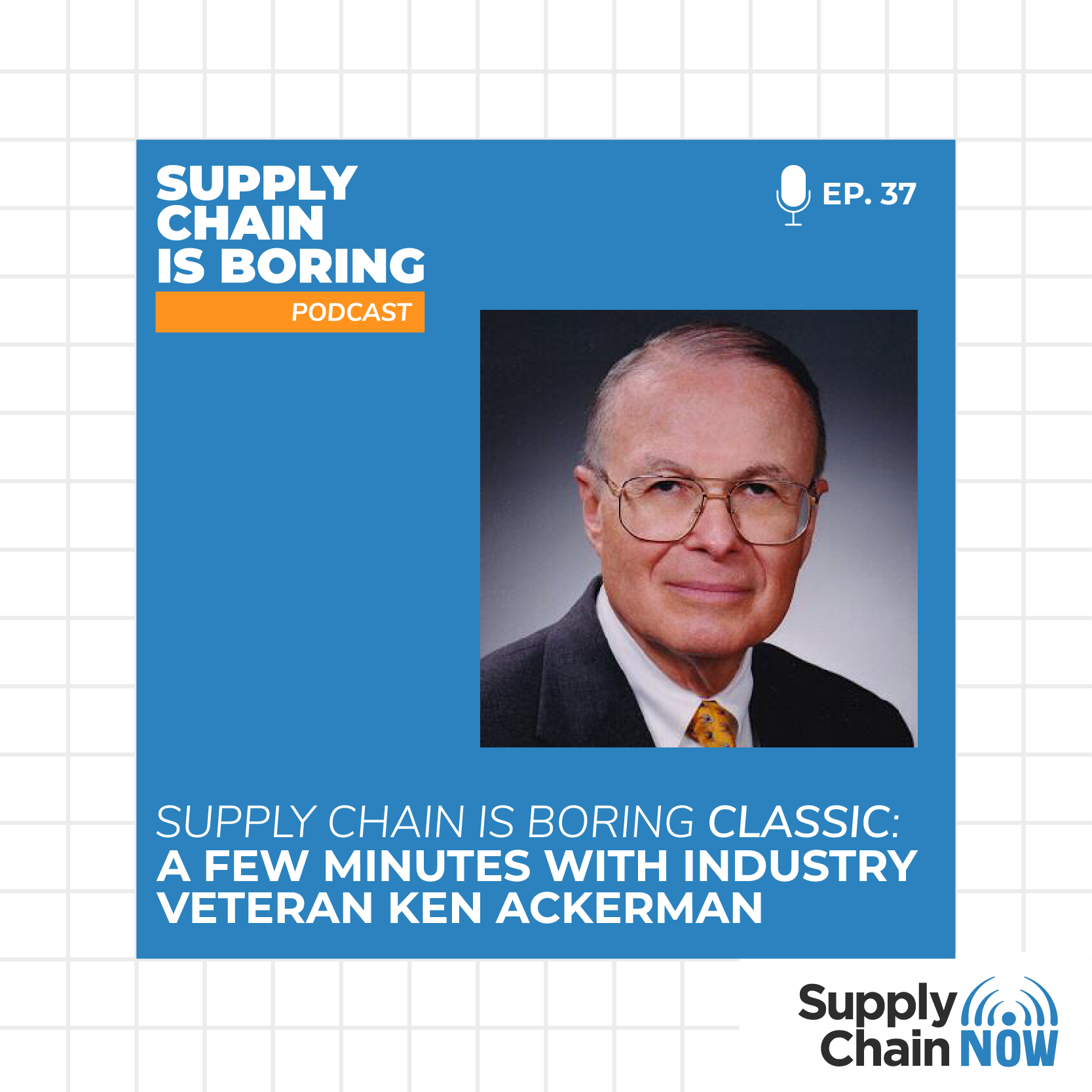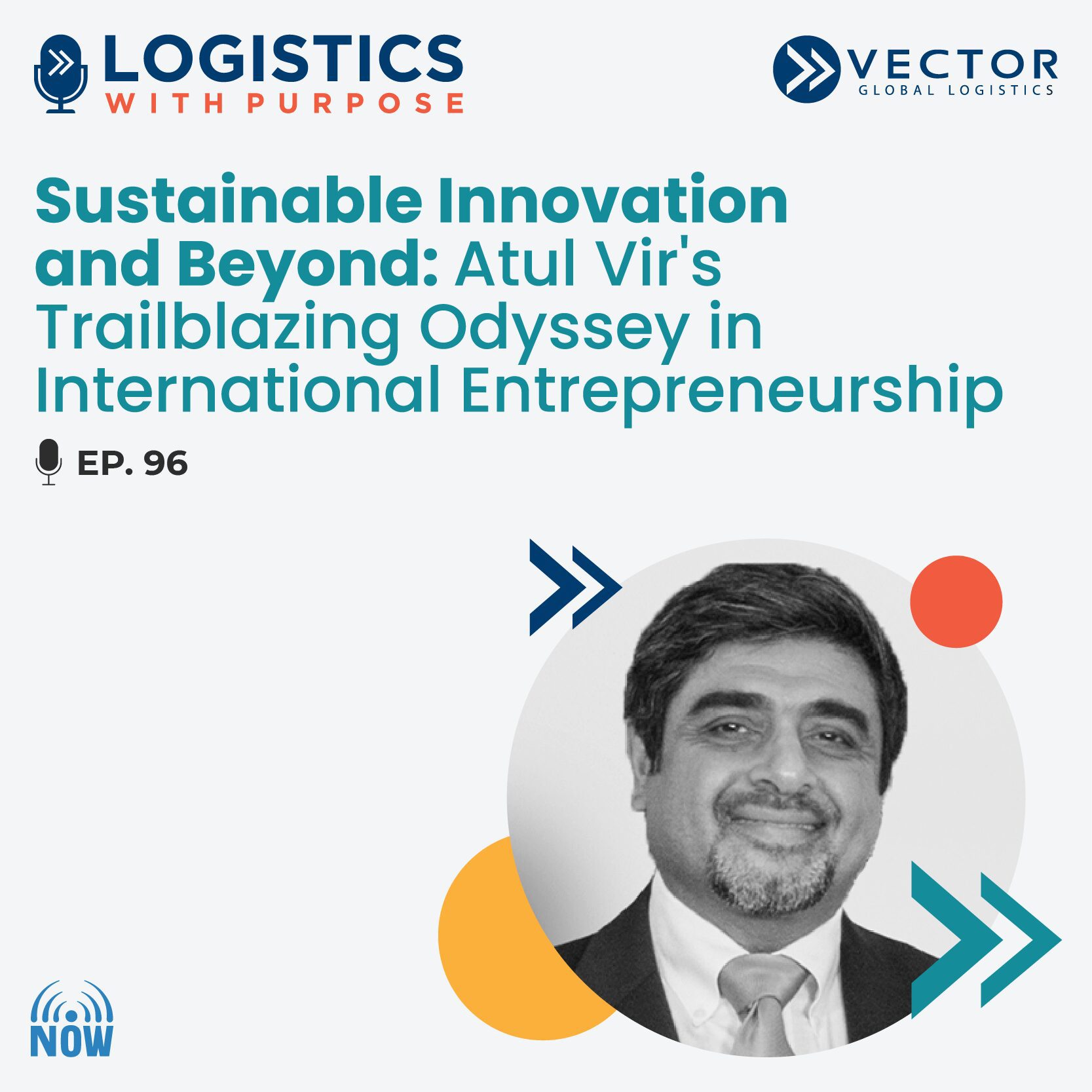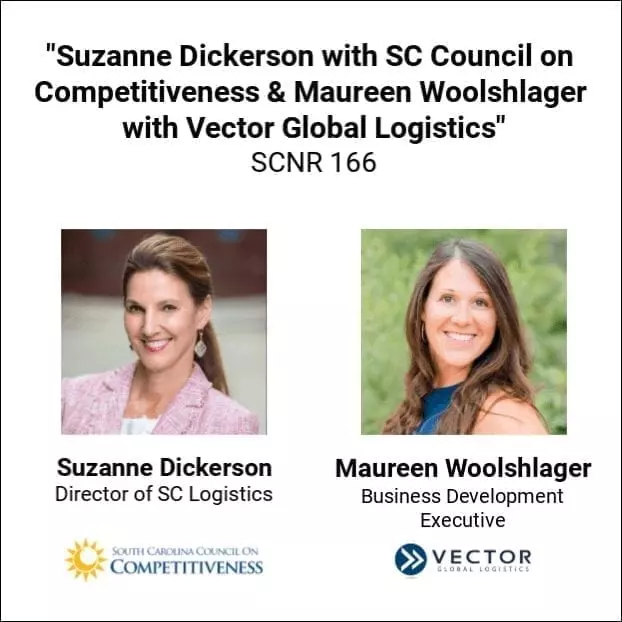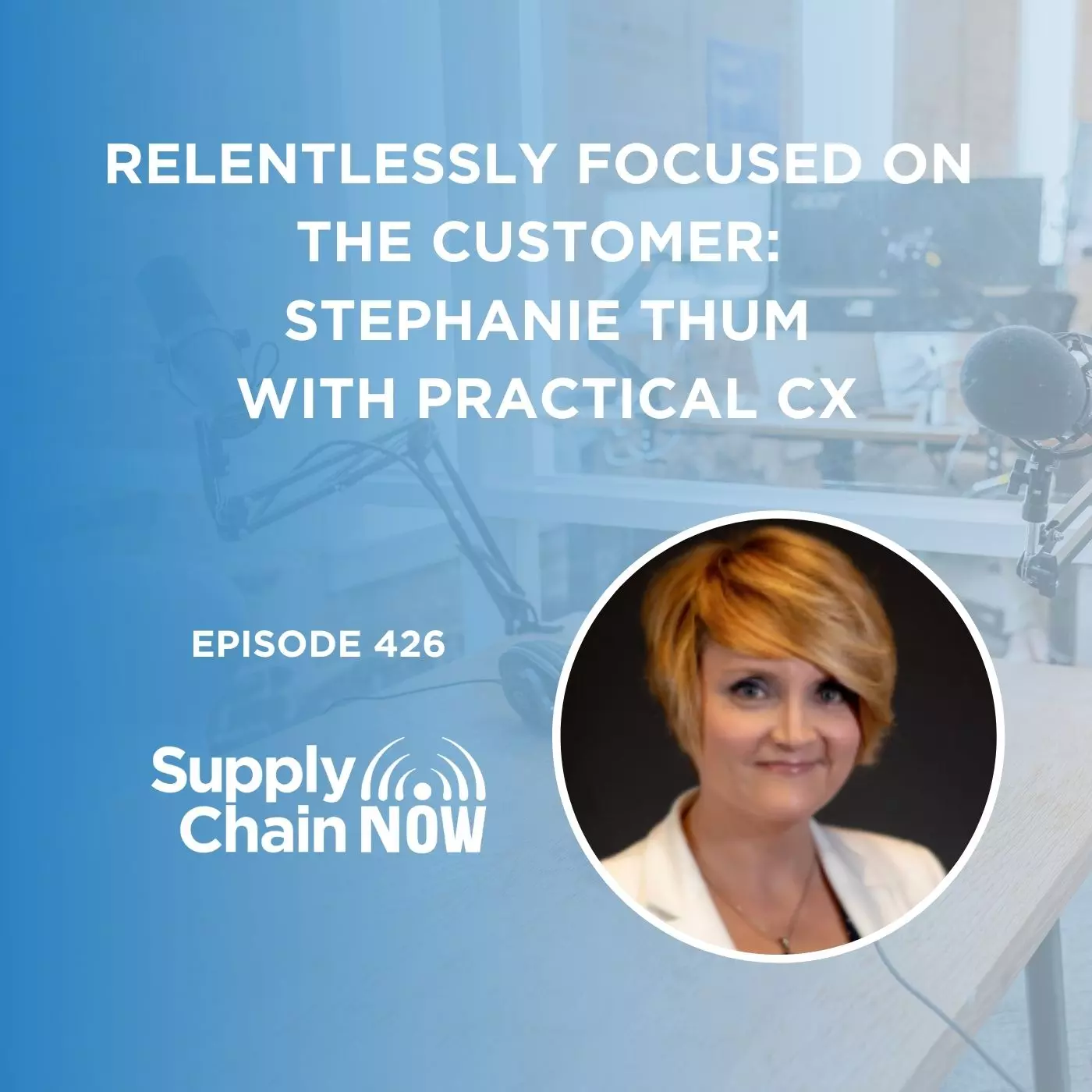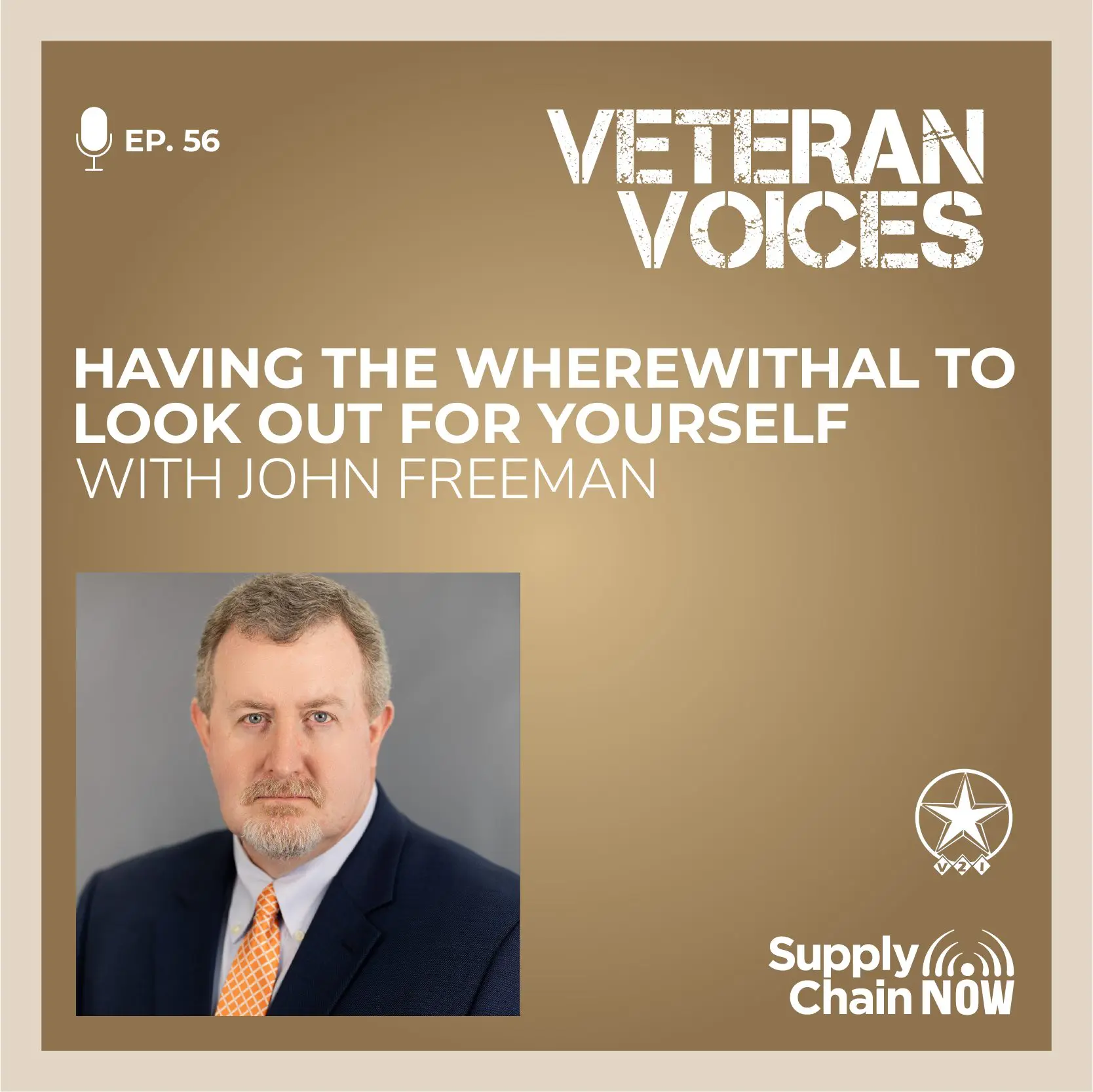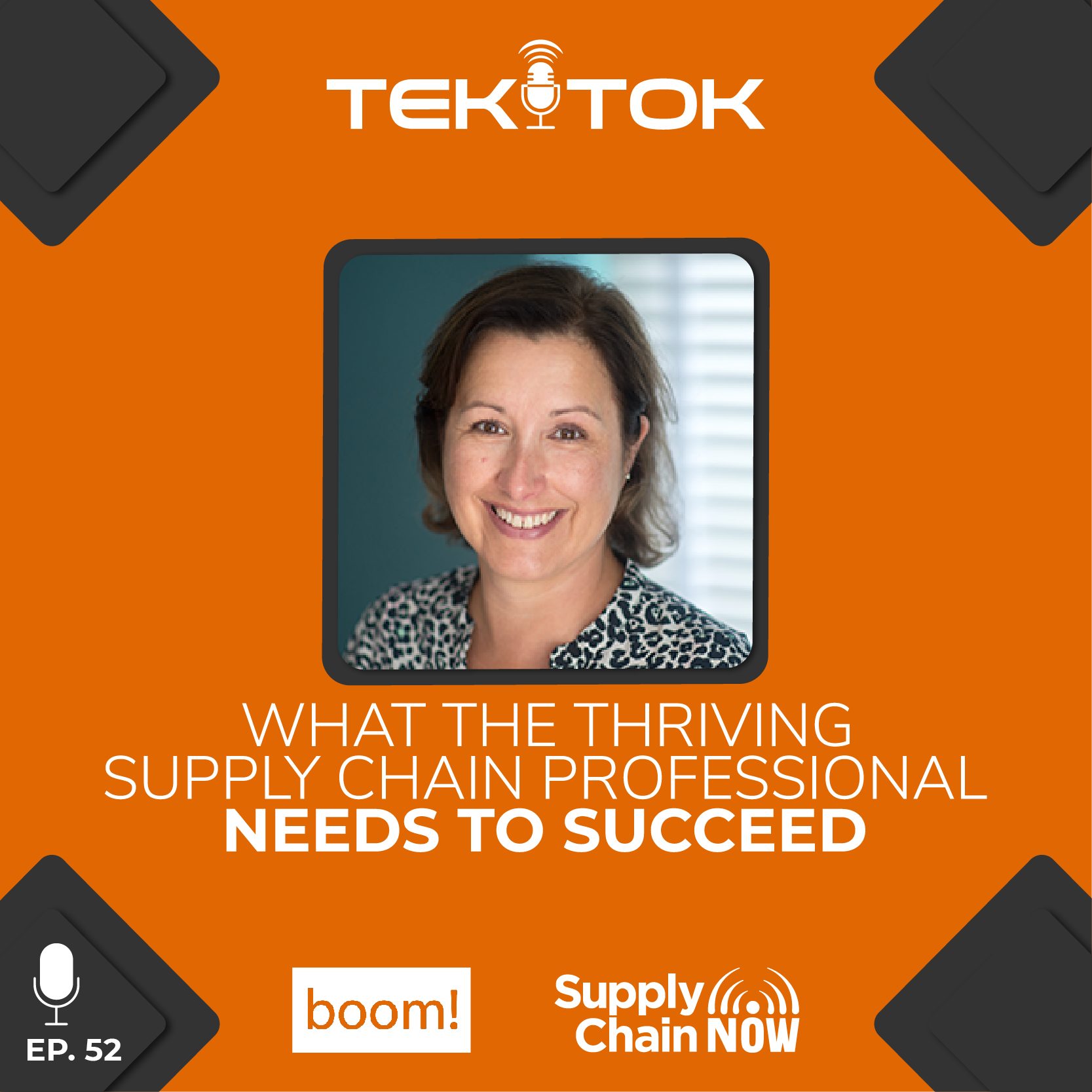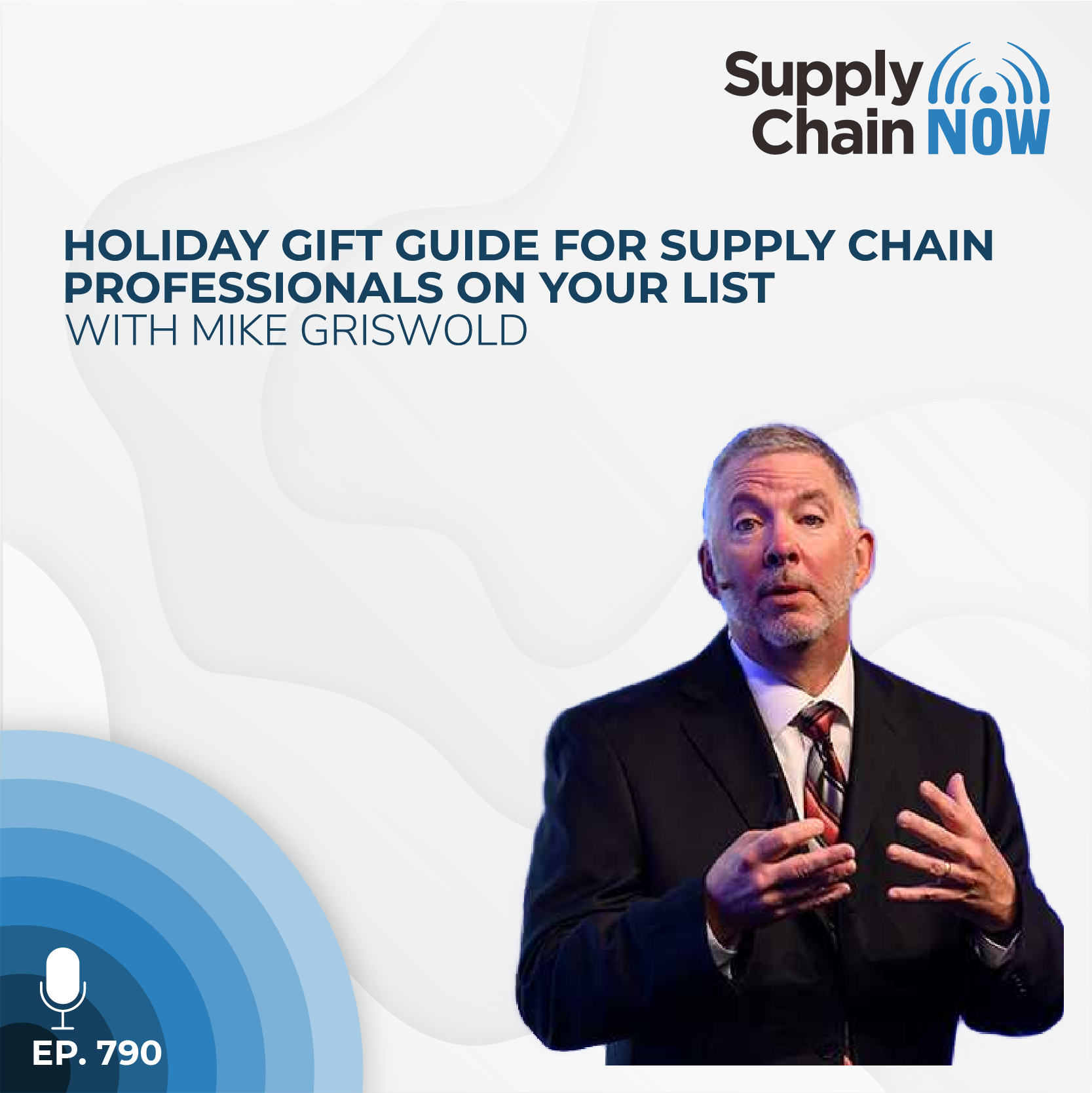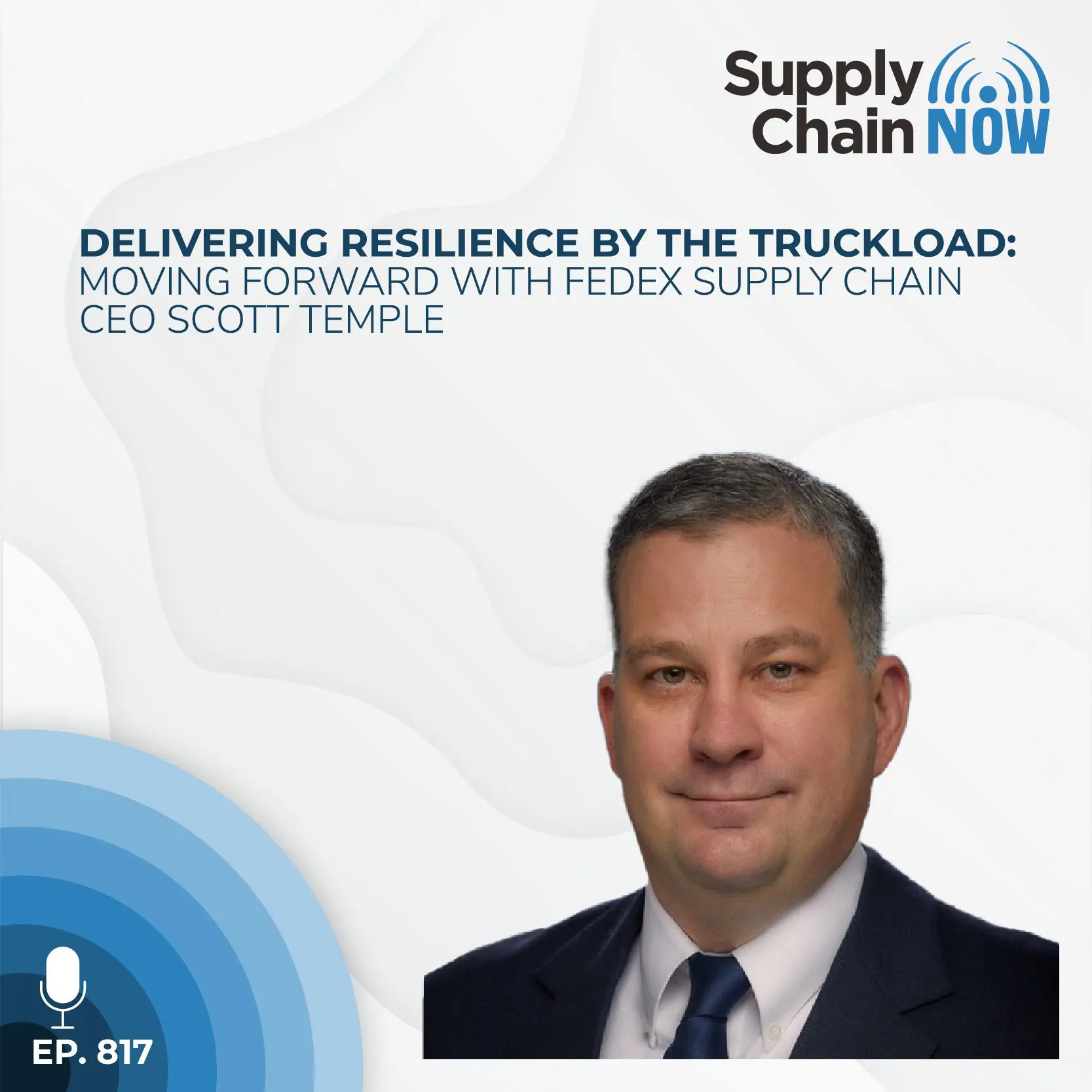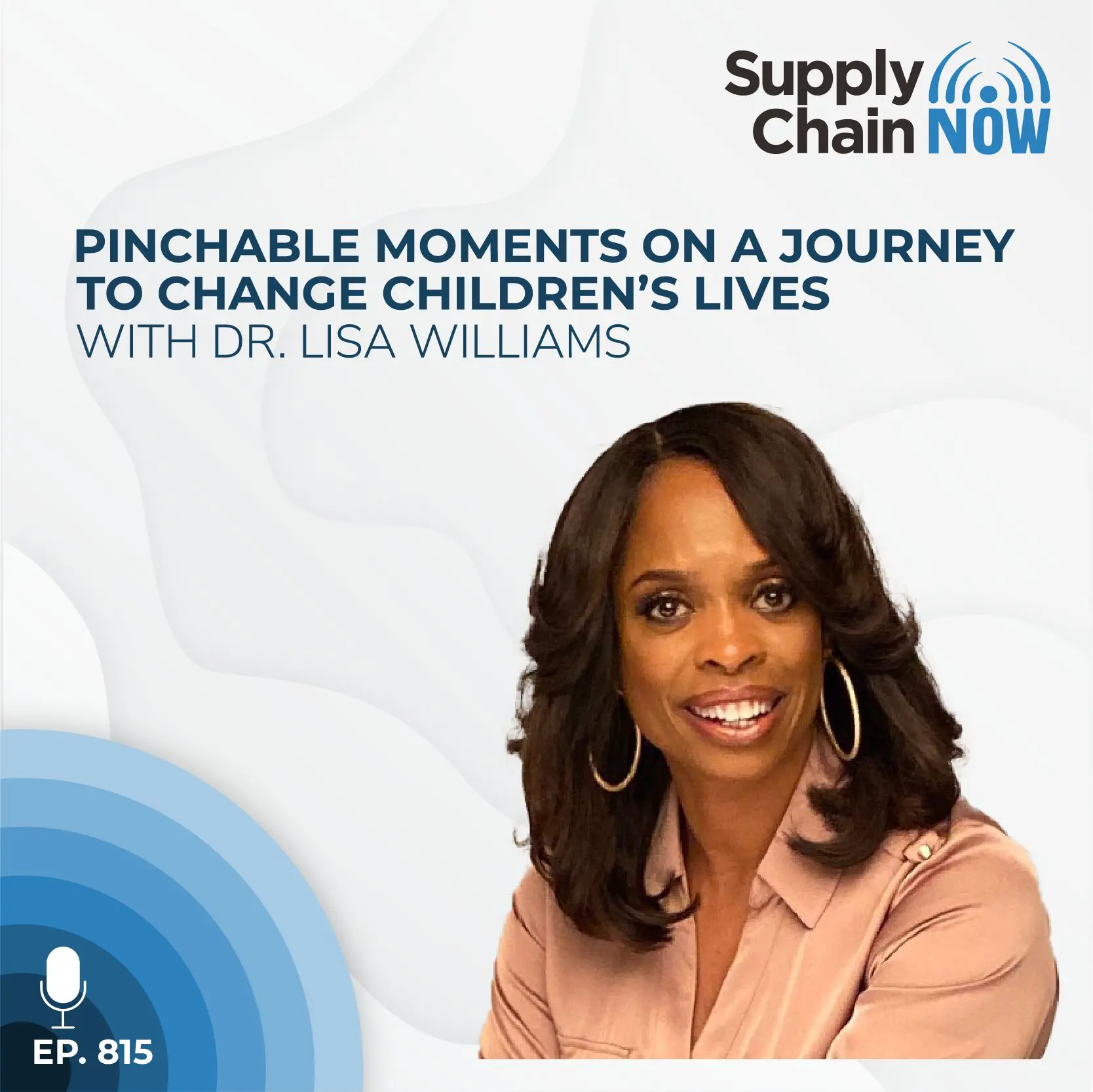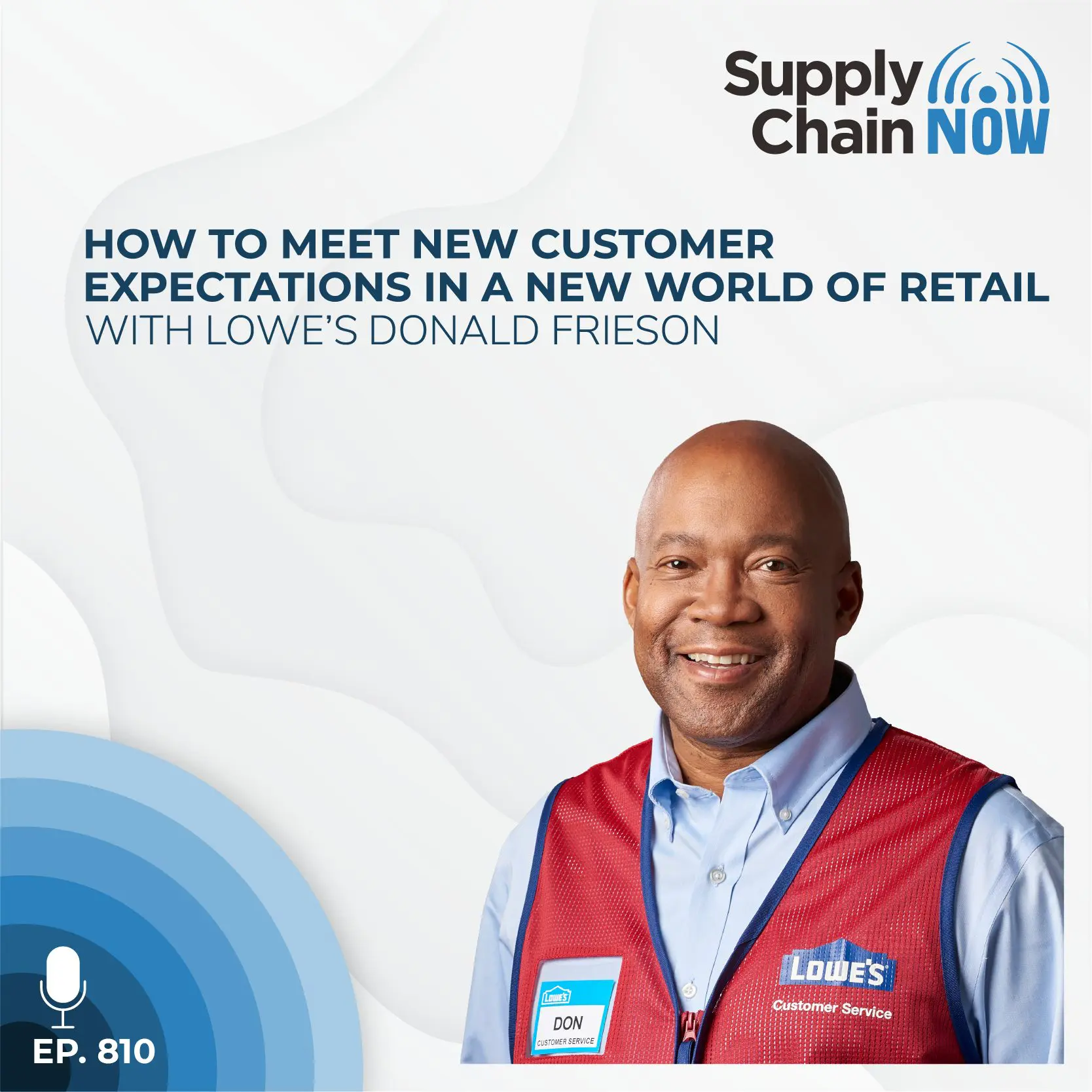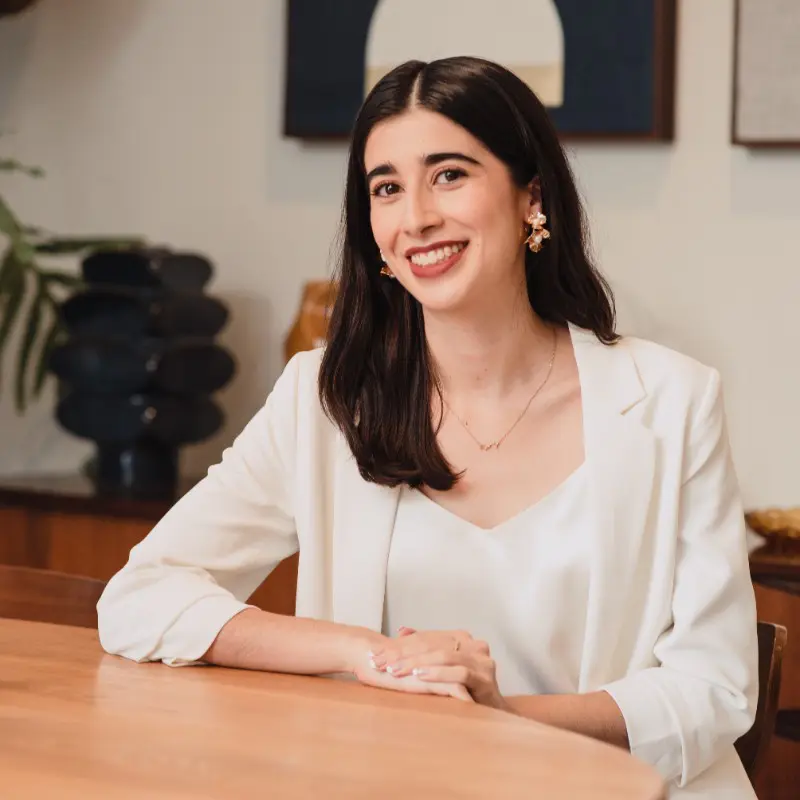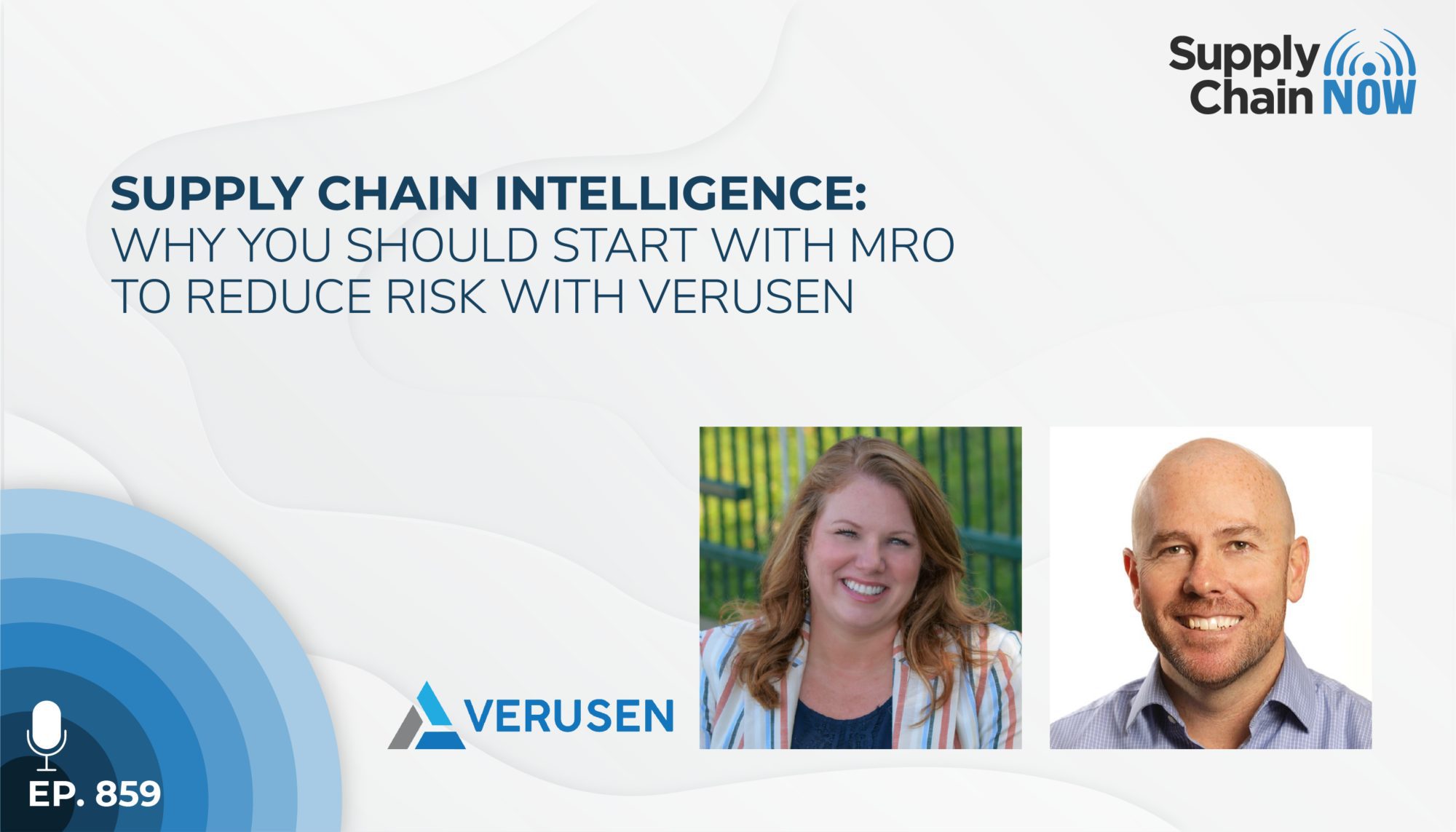
What you know is the enemy of what you could learn. So forget what you think you need to do to fix your supply chain and open your mind to what's possible that wasn't possible a few years ago.
-Aaron Meredith, Verusen
Episode Summary
What’s holding your organization’s supply chain back? Whatever it’s labor shortages, inventory planning challenges or beyond, you don’t need a $100M data cleanse to move forward. Which begs the question: what if supply chain solutions were more like apps? Now’s the time to explore simpler solutions that help you act on the information you already have to stay resilient. In this episode, Scott and Greg sat down with Verusen’s Christine Barnhart and Aaron Meredith to discuss the need to balance cost and risk, big opportunities in #MRO, solving problems faster with #AI and more.
Episode Transcript
Intro/Outro (00:00:03):
Welcome to supply chain. Now the voice of global supply chain supply chain now focuses on the best in the business for our worldwide audience, the people, the technologies, the best practices, and today’s critical issues. The challenges and entities Stay tuned to hear from those making global business happen right here on supply chain now.
Scott Luton (00:00:32):
Hey, good morning. Good afternoon. Good evening. Wherever you are Scott Luton and Greg White with you here on supply chain. Now welcome to today’s livestream Gregory. How are we doing one?
Greg White (00:00:42):
Doing quite well. How are you
Scott Luton (00:00:44):
Doing? It’s been a, it’s been a very productive week. Uh, it’s been a intriguing week. It’s been a week. That’s called I think the world to action. And we’ve seen a lot of that, Greg. And, uh, but from a supply chain standpoint, we’ve got a great conversation teed up right here today.
Greg White (00:00:57):
Yeah, I agree. I, I mean, look, I guess I need to do the full disclose thing like they do on CNBC. I’m a big fan of the founder and the company, an advisor and investor in our guest today. So if I show some bias,
Greg White (00:01:17):
Hey,
Greg White (00:01:17):
But on a kind of a cool note, I was thinking about this as we do the intro. I wonder if the people I out there who are waiting through the intro, do what we do, which you and I are, you know, we’re kind of like everywhere off camera. Yeah. And then as soon as I don’t know what the tone is in the, in the intro where you just go
Greg White (00:01:35):
Add attention. Right? Right. I
Greg White (00:01:37):
Wonder what everybody’s trigger point is
Greg White (00:01:40):
That’s a
Greg White (00:01:41):
Question’s dog here. We could be doing anything and
Greg White (00:01:43):
Soon as
Scott Luton (00:01:45):
Ready. Well, we’ve got, as you alluded to, without giving up our guests, we’ve got a wonderful conversation teed up today. We’re gonna be talking about creatively, finding new ways at attacking and reducing risk, improving supplier performance, and really overall supply chain optimization, starting with they focus on MRO, which is another one of our favorite acronyms, right. Maintenance, repair operations. If I’ve got that right, Greg? I believe
Greg White (00:02:11):
There’s several ways. That one. I like that one.
Scott Luton (00:02:14):
Yeah. Okay. We’ll go with that one then. We’ll see. Christina.
Greg White (00:02:18):
We’ll get
Greg White (00:02:19):
Version of it is. Yeah.
Scott Luton (00:02:21):
Uh, but MRO materials management in particular big opportunities there, the 18 from VEON back with us. So stay tuned for what promises to be an informative and intriguing conversation. Okay, Greg, we’re gonna knock out quickly three program notes before we have Christine and Aaron, uh, join us. So let’s start with Greg. Our nominations are open for our 2022 supply chain and procurement awards. Nominations are open until April 1st. I think you’ve got eight or nine different categories or something for everybody. There’s no limitations, Greg, wherever your operations are across the globe you’re eligible. And Greg folks can go to supply chain, procurement awards.com. It’s just that easy, right?
Greg White (00:03:03):
Yeah. And it’s in the, the comments feed or is it it’s in the private chat? Let’s see, it’s
Scott Luton (00:03:10):
In it in there. Now.
Greg White (00:03:11):
Comments feed. There we
Scott Luton (00:03:12):
Go. You want it, Greg? It’s gonna be in there. It’s that happens.
Greg White (00:03:17):
But yes. I mean, look, nominate a comp a company that’s doing something exceptional. There’s all kinds of categories in including humanitarian categories. So agreed. You know, pick a company, put ’em out there.
Scott Luton (00:03:28):
That’s right. And it all supports our nonprofit friends over at hope for justice movement right along. We want to talk about this global upstate conference on international business and foreign airs taking place in South Carolina, our dear friend, Greg white and Kevin L. Jackson, both are sitting on panels for this March 29th through the 31st event. Greg, your favorite thing you’re looking forward to here
Greg White (00:03:51):
Schmoozing with generals and diplomats and things like that. I mean, seriously, in, in, in the right way, I want to learn what they’re seeing out there in the world. We haven’t been able to visit the wide world much lately. So, you know, we have people coming from Europe and around the world. I’d like to understand what they’re seeing in both foreign affairs and supply chain and how those things intersect.
Scott Luton (00:04:14):
Agreed. It’s gonna be a great conference looking forward to checking out you and, uh, Kevin and, and really the slew of all the other speakers that you you’re alluding to. Uh, and folks it’s open for registration. We’ll drop the link in the chat and y’all check that out. And finally, speaking of taking action, uh, just yesterday, we had our dear friend and Rick Alrez with vector global logistics. Who’s committed to change in the world and meeting needs wherever they are. He brought a couple of his EO friends, uh, with him, including, uh, David who serves as president of EO, Poland. And as we all know, uh, Greg and everyone else listening out there, Poland, the Polish people have just been remarkable. Yeah. Uh, they’ve, they’ve welcomed so many of these refugees that are in need, uh, from Ukraine. I think the numbers is approaching 2 million now, but they need our help. We gotta have their back. They need supplies, beds, foods, you name it. Living kits is what the EO organization, which is global have assembled. Right? So if you wanna step up and take action and give, regardless of whatever amount, check out Ukraine dot EO, poland.org, again, Ukraine dot EO, Poland do org and Greg, your quick comment there.
Greg White (00:05:23):
Yeah. What David Doda and, uh, Monique are doing in, you know, to make things happen. They’re in Poland. Look, these people have lives. They aren’t at war and they are dropping everything. David runs a, a company, a tech company over there, and he has literally dropped everything to run this day and night as we learned yesterday. So, you know, the strain extends beyond the borders of Ukraine, but man, the people of Poland, of course, some EO members in, in the us and Moldova and Romania are taking the brunt and the, the largest majority of the refugees as they flee Russian aggression in Ukraine.
Scott Luton (00:06:04):
It’s remarkable, uh, to hear David speak to it yesterday. So y’all check that out. We need to have their back. They need our support. And of course, all of us here are praying, hoping, wishing for a cease fire that we can get to hopefully some sort of resolution, but protect people as we do. Okay. We’ve got some great guests. That’s gonna join us in just a minute. Greg, let’s say hello to just a couple of folks here. We wanna hear from y’all throughout the hour, we wanna make this very interactive Chand tuned in via LinkedIn. Let us know where you’re tuned in from. We’d love to, to have you, uh, thanks for, and hello. I believe this Greg is Dirk. I believe if I’ve got that right. Uh, Amanda and, uh, Amanda, let me know, but big, thanks to Amanda, Chantel and Catherine behind the scenes helping to make the production happen. A lot of good stuff there, but welcome in Chandra and Dirk. And again, we wanna hear from you as we work through the conversation here today, Greg. Yeah. Are we ready to bring in our esteemed repeat guest to supply chain now today?
Greg White (00:07:05):
Yeah, absolutely. Let’s do it
Scott Luton (00:07:07):
All right with no further do I wanna welcome in Christine Barnhart, vice president of product strategy and go to market with Faron and her colleague, Erin Meredith executive industry advisor also with Veron, Christine, Aaron. Good afternoon. How you doing? Hi.
Speaker 5 (00:07:23):
Hi.
Scott Luton (00:07:25):
It is so great to have you back. Uh, I wanna say Christine you’re with us. I believe it was last month. Had a blast talk. I think you and Paul join us. Uh, you had some big news. Y’all continue to innovate. Drive more success, grow. It’s just, uh, quite the story, huh?
Christine Barnhart (00:07:42):
Uh, absolutely. I mean, it’s, uh, you know, no holds barred. We’re kind of really rolling into 2022 trying to, to do our best, to really solve some meaty supply chain challenges.
Scott Luton (00:07:54):
I love it. And making big progress really move the needle in that regard. We’re gonna talk more about that and just a minute. Wanna welcome. Wanna give a quick shout out. Y’all may know the one and only Jenny pats law. She’s doing some great things up in Madison, Wisconsin, between entrepreneurs, industry and, and government and academia. You name it solving problems, but Jenny welcome in her Wisconsin. Badgers folks are number three seed in the men’s tournament. How about that luck to the bad right there
Greg White (00:08:21):
Was duke.
Scott Luton (00:08:22):
Is it really hadn’t I looked
Greg White (00:08:24):
Three seed.
Scott Luton (00:08:24):
Yeah. Are they ive not?
Greg White (00:08:27):
They stopped by Virginia tech in the AAC ACC championship and dropped from probably a one seed to a three. So really that, I mean, that’s big props to Wisconsin to be at the same level
Scott Luton (00:08:38):
We’re pulling for you at Jenny and so great to have you here today. Look forward to your contributions and by the way, love from India. Thank you very much for that. Let us know where you’re tuned in from India via YouTube. Great to see ya. All right. So Christine, Aaron and Greg, before we get to the heavy lifting and we talk about Mr. Starting with MRO to really optimize your supply chain and, and reduce risk and, and find all kinds of efficiencies. Let’s start with this. Believe it or not, March 15th celebrated each year since 1983 as world consumer rights day had no idea, frankly, even though I’m a big, uh, uh, fan and passionista when it comes to, uh, consumer experience right. Customer experience. But the tie in here is they picked March 15th because president John F. Kennedy addressed Congress on March 15th, 1962 and laid out kind of a consumer rights and what to expect and what consumers should expect. So we really cool historical tie in. So this is a question I wanna ask each of you and Christine, we’re gonna start with you cuz you’re you’re one heck of a lead off hitter like Otis Nixon, stealing bases and hitting 300. So Christine, what is compliment? It is a big compliment. It’s one of my favorite Braves of, of lead off hitter all time. So Christine, what is a recent company that’s really afforded a wonderful experience to you as a consumer?
Christine Barnhart (00:10:01):
Absolutely. I’m gonna tell you Delta. I think that the airline industry has not been getting enough love. Um, and I travel a ton to our corporate headquarters in Atlanta, specifically through Hartsfield. And I just have to tell you, you know, they’re, they’re really doing a great job of being reliable and friendly. And the launches quite frankly in Atlanta are really top notch, gives me a place to decompress and unwind and just make the fact that I’m going back and forth between my home in Evansville and Atlanta pretty regularly, a lot less stressful.
Scott Luton (00:10:38):
I love that Evansville, which of course she’s referring to Evansville, Indiana. I love that. Uh, and Christine, gosh, that’s a great call out cause Delta’s done all of that in some really challenging conditions for the airline industry. So wonderful. Start there. Just like, Hey, you hit a double, so Christine’s on second base, Erin,
Christine Barnhart (00:10:57):
Come on, Aaron, bring me home.
Scott Luton (00:10:58):
That’s right. So Aaron, uh, I love how you just pick right up on that analogy. Christine, Aaron, talk about a company that’s really picked you up here lately.
Aaron Meredith (00:11:07):
Yeah, yeah. So I had a problem this weekend, right? So I, I lived in Europe a few years ago and I came back, we brought one of our TVs. We bought in Europe and I was too cheap to buy us TV to place it. So I just got a one 10 to two 20 volt converter, which has been great, but then the fuse blew on it. So you gotta find this five ounce Fu or this five amp fuse for a two 20, uh, volt converter. You know? So I went to the usual suspects, no, no dice, right? But your local, a hardware store, they can solve anything for you, right? Say, Hey, I got this and they say, follow me and they solve your problem. So in terms of customer experience, consumer experience, I’m willing to drop an extra dime here or there for the local ACE hardware.
Scott Luton (00:11:58):
I love it. You pay, you get what you pay for Greg. You’re about to add to that,
Greg White (00:12:02):
Uh, not a shareholder of ACE hardware, but a huge fan. They have really, I don’t wanna say turned it around, but you know, in the old days you thought of an ACE hardware where, or there was like one oil filter on the shelf and an old guy sitting there in a dirty, t-shirt going, ah, we’re outta stock on that. Now it, I mean, they are real legitimate retail stores and they are a real art alternative to the big box stores and they are just beautiful stores. So they have really, really come around and now a global organization, they are huge all over the world, including the middle east.
Scott Luton (00:12:38):
So I love that and they’re growing and they go into old buildings that would otherwise be demolished and they like reinvesting. And we got one just down the road that, that went into an old E that has been out, you know, been, been sitting there vacant for years. I love that
Greg White (00:12:52):
Every single ACE hardware locally owned by the way. Really? Yeah. They’re not a chain. They’re a group of, of independent dealers is what they call ’em,
Christine Barnhart (00:13:02):
But it’s a franchise type model, correct?
Greg White (00:13:04):
Yeah.
Scott Luton (00:13:04):
Yeah. Love it. All right. So ACE hardware and Delta you’re getting loved on here today. Keep doing what you’re doing. Consumers are very appreciative, eat up tuned in from the U UK via LinkedIn. Great to see you here today, let us know where in the UK. And we look forward to hearing your and Jenny’s and everyone else’s POV as we work through today’s conversation. So with that said, we’re gonna have to couch or a shelf sports and our consumer love for the moment. Cause we’re gonna talk about supply chain here today with, with, uh, leaders from organization that are making their presence felt globally. So with that said, Christine, let’s start maybe with some level setting, which is one of my favorite places to start after the foreign fun warmup with what do we see in the state of supply chain today? So what we seeing out there, Christine?
Christine Barnhart (00:13:50):
Well, it, it definitely, isn’t getting less complex and, or more stable. I mean, I think I’d be remiss if I didn’t start with obviously the situation in Ukraine and, and Russia, I think it’s top of mind in general, the humanitarian crisis, but from a supply chain standpoint, you know, supply chains were already struggling. This really just makes it worse, makes it more complicated. There’s a lot of materials that were really come from that region, hydrocarbons, some critical minerals. And then also, you know, beyond that, the Ukraine has really functioned along with Poland as kind of that low cost region for Europe. And, you know, they do a lot of assemblies and, and a ton of production. So I don’t think it’s gonna get any better for supply chains anytime soon, just because of that incident. Right. You know, beyond that, we’re continuing to see, you know, changes in demographics.
Christine Barnhart (00:14:44):
And I know we’ve talked previously about what MZ has, you know, termed the great pandemic, which are this demographic drought and, you know, record retirements for baby boomers, not expected to re-enter the market and, you know, millennials delaying and, or, you know, moving into entrepreneurial roles, women being much more impacted by COVID and exiting the workforce. So I think that’s another, you know, just a big issue for supply chains. And then just in general, if we take a step back and I’ve been at supply chain engineering manufacturing for over 20 years, we’ve had this MYOP myopic focus on reducing cost and, and being lean really at the cost of being agile. And, and I think, you know, it’s coming home to roost now. Um, there’s not a quick fix. And I think everybody kind of has to strap in for the long ride, unfortunately,
Scott Luton (00:15:44):
Incredibly challenging. And Greg you’re about to add to that.
Greg White (00:15:48):
Well, I mean, it, you know, where VEON does, a lot of work is with manufacturers and brands, right? And they have been remiss in moving from a solely cost reduction based supply chain to one, that’s more of a risk balance supply chain recognizing that there are risks in the supply chain other than just cost. And now, as, as Christine just talked about, they paying the price and several of them are moving fast. Some of them are hoping for the old days to return, but the difference that will force companies to adapt and adopt new technologies is the fact that you cannot hide your supply chain anymore. Now your supply chain is as big or even bigger brand equity play than even your sales department. Because if you can’t, even if you can sell it, if you can’t deliver it, what does it matter?
Scott Luton (00:16:39):
Yeah. Agreed. You know, it’s kinda like the, um, somewhat related note that baseball analogy can’t hide someone that can’t play defense. Cause that’s where the ball’s gonna find in crunch time. Right. And it’s, it’s ruined a lot of playoffs experiences for a lot of teams, uh, really quick. And Aaron, I’m coming to you next for your quick follow up, but I wanna welcome in Tina. Tenda from Zimbabwe via LinkedIn. Great to see you here today. Look forward to your perspective. Y’all keep it coming. We’re gonna try to get y’all’s comments to work through sole. Great to see you, uh, via Abu Dhabi doing some really cool things there in UAE from, uh, general general industry stand point. Uh, gene pledger has tuned in, he said, great point inventory. Thank
Greg White (00:17:18):
Goodness
Scott Luton (00:17:19):
Is gold right now I was afraid
Greg White (00:17:20):
Our, I was afraid our signal got lost in Northern Alabama somewhere.
Scott Luton (00:17:24):
Right. And finally, bill ke I, I believe I said that wrong. I apologize. Make sure we get, gimme some tips there, but great point risk balanced supply chain. That is so moving to my ears. Great to have you here via LinkedIn bill and we’ll forward the rest of your perspective. Okay. So Aaron as we’re level setting, and then we’re gonna move into kind of what our teams are facing here in a minute, but, but finish any additional thoughts when it comes to what we’re seeing with the current state of supply chain right now.
Aaron Meredith (00:17:50):
Yeah, no, it’s, it’s really interesting. Just, uh, I, I, I talk to a lot of companies every week and, and just how those conversations have changed over the past year. I mean, it was clear in, into last year, nobody cared about cost. It’s like risk, risk, risk supply, plus really all we care about we’re gonna inflate our inventories. And it it’s really interesting. I would say, you know, really over the past maybe kicking off 20, 22, almost every conversation is okay now how do we actually optimize costs without, without in incurring more risks? So it’s kind of like, okay, we, we did risk our a lot, but we that’s unsustainable. I mean, that’s just a, that was a reaction. So we have to figure out how to now get costs back in line without, you know, bringing risk down or bringing risk up with it. And, uh, you know, so that’s, that’s clear to where a lot of folks unsurprisingly turn their attention to cuz you can’t just derisk yourself out of business. Well, I guess you can, but you probably shouldn’t
Greg White (00:18:55):
That’s the other risk, the other risk, right? Yeah.
Scott Luton (00:18:59):
So the, the knee jerk reaction was, was allowed for a certain period of time. But now we gotta get back in control kind of what I’m hearing there from Aaron, uh, by the way, pre a greatness, see here from Gianna. Thanks for that. Yes. Christine and Erin and Greg always provide a very insightful discussion, but we wanna hear from you Priya, let us know what you’re thinking, your reaction to what some things we talk about here today. Okay. We’re gonna shift gears kind of from the state of supply chain to one of our favorite topics, which is the people, right? The people that make global supply chain global business happened, you know, we love our technology and technology certainly is transforming in so many ways how we do things so we can do it better and we can better take care of our, uh, team members and our customers, quite frankly. But Aaron speaking about the people, the make up the teams at organizations across globe, what are they facing right now?
Aaron Meredith (00:19:50):
Yeah, it’s a pretty, it’s a pretty complex, um, you know, equation. So E even prior to the pandemic, we knew we knew 30% of our workforce was gonna retire and we could only replace a fraction of ’em, you know, so that, that problem is already sitting there. And then through the pandemic with the Sandem and people exiting and you just accelerated and gotten worse, you know, the other side of that equation is companies have been smart about digitizing their data and their processes, and they have all this data and, and data doesn’t seem to be the problem anymore. We got all the data, we can handle it, right. But it’s really, you know, how, how can you make good use of it? And if, if I’m running a company, how do I best apply my resources to get the job done? I gotta get done today while preparing myself for the future while trying to digitally transform into this future state and how do I play all those puzzle pieces, right?
Aaron Meredith (00:20:48):
And, and that’s, that’s kind of the, the complex three dimensional chess board that folks are trying to deal with. And, you know, I would say 80% of everybody we’re talking to is going through some sort of major implementation. Uh, it could be an, an E R P upgrade or some sort of enterprisewide initiative. That’s consuming a ton of resources, which is interesting because the other side of that is you have a lot of ways you can help address, you know, these problems they’re having and solve, solve some problems that are actually very resource light and agile. And you know, one of the things that the conversations we get into often is okay, if you want to have resources to go work on this great big project you have, what if you could actually free up some of those resources time by implementing some point solutions that, that enable your, your organization to be much more productive, right?
Aaron Meredith (00:21:47):
Let’s get a lot more done, fewer resources, easier, less expensive. And now you’ve now you’ve unlocked resources to go work on some of these larger projects that that’s a, that that’s a huge paradigm shift. You didn’t have that conversation, you know, five or 10 years ago, but these are kind of the routes you can start to explore. Now, I think companies are starting to realize at, you know, yes, we have to do this big thing here, but what are these multitude of other initiatives I can engage in very cheaply, easily, low risk. That’s gonna make me more profitable and free of resources at the same time that I need to commit to some of these big projects. So that’s, that’s a lot of the, when we talk about people in companies and, and people are like, man, how do I, how do I go do something with you guys when I got this huge right project over here, these are the conversations we have
Scott Luton (00:22:39):
And all of that, uh, gives the people what they want, which is more rewarding, fulfilling work. When you can do that, uh, effectively, we’re gonna touch on that in just a second. Christy, lemme come to you next, uh, for your, your, or follow up thoughts to that. But first I wanna say hello, Greg, to our dear friend, Lamont, Hardy, the project management guru and, and then some based in sunny San Diego. Great to see you here. Uh, Lamont,
Greg White (00:23:02):
Lamont, wholeheartedly agreed with my wholehearted disagreement with an author on, on one of my, uh, summaries that I put on LinkedIn the other days.
Scott Luton (00:23:12):
Well, he said, I
Greg White (00:23:13):
Wholeheartedly agree
Scott Luton (00:23:16):
Every Monday, Wednesday, Friday, if you’re not connected or following Greg white, you’re missing out. I promise you. Okay. Billie’s great question. We’re gonna bring that into the fold in just a second, but Christine elaborate. What else would you piggyback on Aaron’s initial thought there in terms of the challenges that teams are facing?
Christine Barnhart (00:23:31):
Yeah. I mean, I think Aaron hit a lot of the talking points. I mean, and you’ve, you know, we’ve talked about it before people are swimming in data. It’s not a data, it’s not a lake, it’s a swamp. The data is not very useful. Necessarily. Companies have a really hard time gleaning insights from the data that they have today. So I, I agree with him wholeheartedly. It’s not a data issue. It’s really, I think, um, finding solutions that are very business outcome focused from companies that have true subject matter expertise, where you can kind of pick and choose your battles and say, okay, I’m gonna improve this one thing. It’s not a heavy lift. And then I’m gonna move on to the next thing. And Gartner has just really started to talk about kind of the composable supply chain and right. Um, micro apps and, and things of that nature. So I don’t think any of us are advocating that you don’t need any E R P uh, but at the end of the day, the E R P is not gonna solve all of your problems. And in order to move forward, you really have to think about new business processes and new ways, which is that distinction right between digitization and digitalization. Ah, and I think that companies are finally starting to, they digitize right in the eighties. Right,
Scott Luton (00:24:46):
Right.
Christine Barnhart (00:24:47):
They were on an electronic system, but it still wasn’t really delivering everything that they needed.
Scott Luton (00:24:53):
Mm. Okay. All right. Uh, lots of t-shirt ISS already. Greg, I wanna come with you. And then I’m gonna circle around to Billie’s question about the great resignation and get everyone’s quick answer there, but Greg, your current thoughts, your thoughts.
Greg White (00:25:05):
Data’s not in the lake. It’s in his swamp. Wow. That that’s not a great t-shirt is,
Scott Luton (00:25:09):
I don’t know what it’s
Christine Barnhart (00:25:10):
I gotta, I gotta attribute that that’s actually Laura CERI
Greg White (00:25:14):
Of course.
Scott Luton (00:25:15):
And one and only yeah, yeah, for sure.
Greg White (00:25:18):
Telling it like it is. Look, I think, you know, I don’t, I don’t directly compete with any of these E RRP. So I can say what I really have always thought about ERPs and that is they are a mile wide and an inch deep and the, the kind of area where that Christine and Aaron are talking about in supporting your people. Sometimes you need to go a mile deep and that’s why point solutions make sense to bolt into an E R P look, let’s face it. E R P systems started out as finance systems ERPs just a name because they could, they had to come up with a name that said we’re gonna dabble. That allowed them to market the fact that they dabble in supply chain, they dabble in forecasting. They dabble in warehouse management and all these other, all these other things. But in the end, it’s a data master data management and finance tool.
Greg White (00:26:06):
That’s it? So going deep in, uh, in all of these niche, I don’t wanna say niche. I say point solution areas. It’s worth it. People have been doing it for decades with warehouse management and demand, forecasting and planning and that sort of thing. And there are other areas where you can do that. And I believe that the days of billion dollar E R P implementations that nearly nearly kill a company are over because now you can put a data layer over the top of this old ancient system. Literally some of these systems have code from the 1950s in them, Howard.
Scott Luton (00:26:44):
Um,
Greg White (00:26:44):
You, you can put data layers over that and then interconnect with all these other data systems. And that’s a huge service to your people because instead of re-engineering your business or re-engineering your technology, you get to king work and get the work done.
Scott Luton (00:27:01):
Okay. I love it. He come on. All right. So we got
Greg White (00:27:07):
Pick.
Scott Luton (00:27:07):
Yeah, that’s right. Uh, the sensors, weren’t just, they were just fast enough. Uh, David Morrow, you got a great question here. We’ll try to get to that. Uh, I wanna add mark Prestons here. Mark. Hope that’s finds you. Well, he’s on the board with the association for manufacturing excellence. Mark says value in the eyes of the customer versus pretty wallpaper for charts in the wall with no action or outcome. I love that. Mark hope this finds you well, great friend of the show there. And
Greg White (00:27:32):
Action only. Yes,
Scott Luton (00:27:34):
Let’s get that. And I’m gonna put, if I can get your quick answer to Billie’s question here, and then we’re gonna move on to MRO. Cause that’s, that’s one of our main thrusts here today. Do you think the great resignation is affecting supply chain and how are organizations balancing it with resource allocation? Christine, a stick with you for a reader’s digest answer,
Christine Barnhart (00:27:52):
A hundred percent, a tremendous amount of knowledge and expertise is walking out the door. And if you have not invested in systems and tools that allow to capture and institutionalize and leverage that it’s gone and it’s never coming back,
Scott Luton (00:28:10):
You’re in the swamp with no paddle. Okay. Uh, let’s go to Erin
Christine Barnhart (00:28:16):
There’s alligators. Yes.
Greg White (00:28:18):
Yeah. Right?
Aaron Meredith (00:28:20):
Yeah. Yeah. I mean, it’s, it’s, it’s impacting everywhere. Right? So as Christine said, if, if you’re not doing something about it already, you’re already behind in, in this space, but balancing that’s a great term, right? So you’ve only got so many resources they’re getting fewer and, and balancing becomes tougher. So you have to find ways to free up your people’s time, which are available. Yes. You can unlock that productivity with these, uh, point solutions that Greg refers to, you know, so that they can work on these other critical areas of your business, right?
Scott Luton (00:28:57):
Yes. And bring more value to the table and enjoy while they do it. Greg. Uh, your quick answer to Billie’s question.
Greg White (00:29:04):
Absolutely. Yes. Been doing so for nearly a decade. I mean, baby boomers have been retiring for a decade. So to the second part of the question, how our organization is balancing it with resource allocation, hopefully not strategically. Right? I mean, I really think that most companies have no plan and, and that’s, that’s gonna set companies back, frankly, as Christine said, a lot of expertise walking out the door where the only re place where that expertise was held was in someone’s head.
Scott Luton (00:29:36):
Yes. They’re walking out the door with a multicolored Fanny pack full of their tribal knowledge and Christine, if that’s within arms, yes. Please share. Maybe you can share what you perfect. Just
Greg White (00:29:50):
Being clear. Do you think, do you think all, I mean, wait, let’s not stereotype here. Not all the baby boomers wear Fanny packs. Right.
Scott Luton (00:29:58):
I think, Hey, I think you’re, if you’re everything Carlos, regardless of the generation, if you’re at a, uh, a wonderful amusement part with the kids, a Fanny pack is a convenient way to go, right. Christine.
Christine Barnhart (00:30:08):
Exactly. And I’m a Xer, I’ve never owned a Fanny pack, but you know what, when I go to Orlando next week, I’m taking a Fanny pack.
Scott Luton (00:30:18):
All right. Pictures, or it didn’t happen. Pictures are it didn’t happen? All right. We gotta move on. Thank you for giving us the prop there. Christine, let’s talk about MRO. So first off, I want to make sure we got the, the acronym, right. Main, I’ve seen a couple different definitions. Christine. We’re gonna talk about why we start with Mr. R MRO and what the big deal about that is. But first maintenance repair. Is that a, is that good?
Christine Barnhart (00:30:43):
Yeah. As, as in all things supply chain, there are multiple definitions. Yes. I generally do maintenance repair and operating supplies, but I think there’s, like I said, all things supply chain there’s nuance and tweaks.
Scott Luton (00:30:57):
Yes. Yes. Okay. Well, so we’re, we’re got about a 85, I think, which are, are on, uh, the acronym, but Christine, more important than the acronym. And by the way, I think this might be Catherine, but loves the FA pack Fannie pack. And the swoosh they’re gonna be the stars of the show as, as typically is the case. But Christine, what is the opportunity with MRO? Why should folks start there? And, and what’s the big deal?
Christine Barnhart (00:31:20):
Yeah, I think so. We’re seeing a lot of movement for companies to invest in intelligence and, you know, Gartner talks about it. HBR talks about it. I think Gartner, the last I looked, they were like 50% of companies are gonna invest in intelligence applications in the next like two or three years, most however are taking kind of this enterprise approach where, you know, they, they wanna boil the ocean, right. You know, a mile wide and an inch deep and it’s not very effective. So what we’re really seeing is pretty progressive mature companies have started to recognize, let’s pick a, an area, an MRO is a great area. It isn’t as risky as starting with direct, right? There’s more supply available. It’s a little bit more commodity oriented. So I can, you know, make this investment to improve MRO, you know, reduce risk without inflating inventories, by applying artificial intelligence and make some tremendous gains.
Christine Barnhart (00:32:23):
My people will get comfortable with the technology. I, as a company, start to understand it better. And then I can, you know, really mature and, and move into the next area of supply chain. So I think for us, you know, we’re really advocating that people start to, to look in the MRO space. I mean, look, I’ve been in this a long time and, and I’ve managed sourcing. And I was one of those people that was like, uh, MRO. Like it’s not strategic. I care about like the big things, the, the direct materials. And now I’m like, oh, wow, that was, that was really my op and, and on my part, and maybe not that effective for the companies that I worked for and I should have taken, you know, a little bit more strategic approach because at the end of the day, if I don’t have what I need to run the plant, I’m not making production. And if I have too much of something, then I’m wasting, you know, working capital that I could have been using for something else.
Scott Luton (00:33:23):
Excellent point. Now, according to a resource that we’re gonna share towards the end of today’s livestream, which included this fact toy that B according to Boston consulting group, up to 4.5% of, uh, all of top line revenue could be spent on MRO service is spare parts. You name it. So this, this could be a potentially big opportunity as you speak to Christine, Aaron, I wanna come to you. What else would you add to that? Then we’ll get, Greg’s take, and then we’re gonna move to, uh, some stories and some examples. So Aaron,
Aaron Meredith (00:33:52):
Yeah. I mean, uh, so having worked, uh, not insignificant portion of my career in maintenance and reliability in manufacturing, a $2 gasket can still shut your plant down, right? So from a overall spin versus an, you know, within a company percentage wise, we’re like, eh, that’s not really strategic, but the risk is, is really enormous to manufacturers to not managing it, right? One but two, there’s still a lot of money to be saved there because it’s not strategic. It’s not been invested in, it’s not been innovated in and there’s just money everywhere, everywhere you look there’s waste to be had that you can capture very quickly. So it’s a great, it’s a great place to start get great returns, low risk, learn how to use this new way working.
Scott Luton (00:34:43):
So I’m hearing what you both are talking about there leaders, because it’s not a sexy thing to focus on. Folks leaders are missing real opportunities. Greg, what else would you add to what Christine and Aaron and Aaron have shared
Greg White (00:34:57):
To the point of what they both said? Leaders need to redefine their definition of strategic because a $2 item of any kind that can shut down your plant is strategic, right? I mean, out of business is still outta business, no matter whether it was a $500,000 part or a $5 part. So I think we need to redefine that. And the other thing, um, with MRO and starting with MRO is it’s a much lighter investment and it’s a much more data, poor environment. So it’s the worst, it’s the best of one world and the worst of other worlds. It can only get better from there because your data is usually better in your direct goods and it’s way better in your finished goods. Yeah. So if you can build a model and succeed, it’s the old story I’m from Wichita, Kansas. If a business can survive in Wichita, Kansas, it can survive anywhere. Um, and similarly, if you, if you are, you can make a benefit in the MRO space. It’s that much easier to do it in direct and finish goods as you, as you grow. And it gives you that sort of pilot environment where as Christine said, it’s much, much safer.
Scott Luton (00:36:10):
Okay. I thought I heard a little Charles Dickens tale of two cities there, Greg, but Christine, you, you were gonna add
Christine Barnhart (00:36:16):
Just to reinforce what Greg said. I cut my teeth in maintenance when I graduated from college and we did a huge MRO project. We went into burden stores and we, you know, pulled reports on everything that was there. And we tried to find things that were duplicated and, you know, sell off self inventory that wasn’t even used anymore. And yeah, I think what shocks me is most companies are still operating that way. They’re not even applying technology. That’s been around for five or 10 years, heck less. You know, some of the more, you know, more aggressive tools that a company like Verin is really bringing to market to make it just easy, seamless, not time can assuming, you know, it’s like picking up your phone and using an Uber. You didn’t have to take a lot of training for how to do that. Right. Right. And that I think is what supply chains really lacking overall.
Scott Luton (00:37:09):
All right. So I wanna insert, I think at this point, based on some of your last comments there, Christine kind of using off the shelf, generic and old technology, I wanna insert David question here and get y’all’s quick take on this. So David hope this finds you well, great to have you here today. He says back to that data, swamp that we were referencing earlier, could that be due to a standard set of metrics and language to build from and organize about what I read into that is not customized, not pinpoint, not targeted, just kind of, Hey, this is what works everywhere else. We’re gonna plug it in here and you’re gonna do, you know, use it like every other company uses it. Right. Any reactions to data, question enough
Greg White (00:37:45):
For P and G.
Scott Luton (00:37:47):
Right, right. Uh, any other comments, uh, from our panel here?
Aaron Meredith (00:37:52):
Yeah. I’ll, I’ll, I’ll jump in. When I read that immediately, what comes to mind is, is data governance, which is a nightmare. I mean, not that you shouldn’t do it to some extent, but having worked in manufacturing all my career, think about safety and safety systems. Right. Uh, and, and you’re trying to keep your, your workforce safe, the lowest level of protection you can give them is administrative controls. So rules governance basically. Right. Right. And, and that’s, that’s, to me, that’s what day governance feels like. It feels, it’s just got a lot of ways to fail and it’s very difficult. And while you might be able to do it as a company within your four walls, well, when you go to up and down your supply chain, how’s that work, right. It doesn’t, it doesn’t, you know, and how are you gonna get adherence to a standard, you know, up and down a supply chain down to the Minu level of certain pieces, uh, uh, of data, right? So, uh, I think that calls for a different approach to getting to the outcomes we’re looking for.
Scott Luton (00:38:56):
Agreed, Greg, Christine, wanna add anything else to that?
Greg White (00:39:00):
You wanna go Christine?
Christine Barnhart (00:39:01):
Sure. I was just gonna say, I, I, I think there’s a place for standards. Canonicals, I’m super excited to see a S cm and, and ISO really working together to, to build a new sub supply chain standards, similar to what they did with manufacturing, but it doesn’t fix dirty data, master data, discrepancies, the need to maintain data or the need to not maintain data. And I think that’s the paradigm, right? Is can I generate an outcome that’s positive for my business without wasting time, you know, cleansing data governing data, and, you know, 20 years ago, those tools didn’t exist. You didn’t have an option, but today the tools exist through natural language processing and machine learning and artificial intelligence. Um, we are bringing forward insights without companies having to spend, not just months, but, you know, quarters cleansing data, which by the way, as soon as you get done with the project, the data starts to get dirty again, not sustainable, right.
Scott Luton (00:40:09):
Or irrelevant, right.
Christine Barnhart (00:40:10):
Or irrelevant. Exactly. So I think part of it is just getting people to think differently. And by the way, that’s the analyst too. We’ve talked to several that are like, oh, you know, I think we need master data management. We’re like, well, we kind of have the proof that says we can deliver these outcomes without requiring data cleanse and master data management. So I think there’s, you know, there’s a lot that as a supply chain that we can do to move forward, um, to change our thinking.
Scott Luton (00:40:39):
Wonderful. Okay. All right, Greg, I know you’re quick follow up point from you, Greg, and then we’re gonna get it in story time.
Greg White (00:40:45):
Companies grow by acquisition. This problem will persist for the, from now until the end of time, because Aaron’s plant calls it a pale, a paint, mine calls it a can of paint, and they are exactly the same item. That’s just one example. You’ll never solve it. So if you have to undertake this data cleanse process, it never ends. And therefore you can never go forward. I think, you know, what we’re trying to provide here is a way to go forward with the data you have now, right. And recognize that a can equals a PA Hey, if, if Aaron needs a, what is mine a can, if Aaron needs a can of paint, I can send it to him.
Scott Luton (00:41:25):
All right. I love it powerful.
Greg White (00:41:27):
Right? He can call it a pale and I can call it a can, but it’s still the same thing. And, and we can recognize that they are the same on that is the simplest example I can give for that, but it’s critical and you can do it right now.
Scott Luton (00:41:40):
Love it, love it. You’re you are displaying some of your vent quiz if I said that right. For a second ago, but we’ll leave that. I appreciate that practical analogy, you know, bucket versus pill or versus, uh, uh, can, you know, that gets, that can trip a lot of enterprises up in their operations. Let’s move on really quick. Uh, Dr. Ron, great to see you here today, as always, she says, great to spend some time listening again today. Really enjoyed your show yesterday, coaching up now on the discussions. Hey, uh, it was, uh, powerful conversation yesterday with our friends, uh, from the EO organization are doing things about taking real action to, uh, Ukraine. Yeah. Uh, and what’s going on there. Okay. Setting that aside for just a moment. Let’s, let’s, let’s continue on this path. You know, each of y’all are kind of speaking around real conversations. You’re having, uh, experiences let’s continue down that path. Aaron, let’s get some other examples for what, what you’ve seen, um, successful approaches and its impact related to MRO.
Aaron Meredith (00:42:40):
Yeah. Yeah. I’ve got a few stories. I mean, one that’s right online with what we were talking about, uh, this, this data problem, the reason people think they need to be doing data cleanses, especially in MRO where you have a large enterprise, I, it could have well north of a thousand people that can create an item and why do they have it that way? They need to get their jobs done. Right. That’s why. And as a result, they end up with all these duplicates and things out there. So we have a customer that had a failure on a line upstream piece of equipment to downstream production lines down. Didn’t have the item they needed in the store room called up the supplier four week lead Tom, cause we’re in a pandemic. They looked in every instance of the E R P they have in the company and couldn’t find it.
Aaron Meredith (00:43:27):
And then they looked in our tool and they saw, look at all these duplicates out there that you had or might have, right. And they found two or three plants that actually had that item on the overnight. And it got the machine back up and running save over a million dollars of downtime. So it really happened very simple activity, very simple activity. And there was not one bit of data clean to enable that to happen. Right. So there’s an example of an outcome of just understanding what you have using intelligence and providing insight into that. Another one is,
Scott Luton (00:44:03):
Hey, really quick, Aaron, if I can interject. Yeah. Yeah. Uh, production line downtime rarely is very affordable and inexpensive. Huh? A million dollars in downtime. Holy cow. Yeah. All right. So you were gonna, I share another one.
Aaron Meredith (00:44:17):
Yeah. So, so on that same line, another thing I hear from companies all the time is, cause I know I’ve got all this duplicate data and I’ve got a gazillion things that people set up around my enterprise. I have no idea what I’m really spending on different items and who I’m spending it with. I can kind of drill down here or there in this system, but I don’t really have a good picture of that. And if it’s true that we can understand what’s the same and what’s different within your data, we can aggregate all those insights. You wanna know what you spent for these 10 things that are actually the same here they are. We didn’t clean anything to do that. Right. So it it’s a different way of thinking about solving. It’s it’s really paradigm shattering, I would say. And, and, uh, we get into a lot of interesting conversations with folks that have an MDM project that, that, that went up and sold it to the C-suite and has, has a lot invested in it. Right. It’s like, well, let us help you get to the outcomes. I mean, you know, you’re trying to accomplish an objective here. What if you can get there faster? Mm.
Scott Luton (00:45:16):
Really quick, I got it. And I’m gonna get Christina, get your follow up, take to that. And you and Greg’s, but uh, really quick, you’re talking about duplicates through a lot, a lot of your stories there, DS for short, I gotta give you all free idea. Duke of Earl’s one of my favorite songs all time. There is a do of Earl that we can use. Uh, you can incorporate it into your booth at mod. I think that’s booth at 1124. And I wanna see it when we get there in a couple of oh,
Christine Barnhart (00:45:42):
In backgrounds.
Scott Luton (00:45:43):
Yes. Do do
Christine Barnhart (00:45:44):
My work on that
Scott Luton (00:45:45):
Of Earl. All right. So Christine, I love that song, man. Uh, Christine let’s, uh, what else would you add to that? I, I love practical examples and stories and experiences that a lot of the folks in our ecosystem can relate to. What else would you add?
Christine Barnhart (00:46:00):
You know, I think the twist I would add is in a lot of these situations, companies are like, well, can’t I just build this myself. Can’t I can’t, I do what you guys are doing. And I, and I would say that, yes, you can, uh, or you can try, but the amount of time and money that you would have to invest to get the output that we’re able to provide, you generally, you know, in just a few weeks, it’s not gonna be beneficial to your company. You have to hire data scientists and you have to buy multiple tools and you have to test and train a thems. And so, you know, we are really able to take the data that you have today, ingest it, you know, apply our proprietary technology and come back to you very, very quickly to say, this is what we see.
Christine Barnhart (00:46:47):
And then as your data changes, we’re gonna bring forward new insights. And we’re gonna, we’re gonna say, oh, look, you know what? Somebody added something at this plant. And it looks amazingly similar to things that you already had in, in, in another facility. So, you know, the exercise that we’re talking about, yes, you could probably hire some resources and maybe get some, some, some results one time, but is it sustainable? Is it gonna continue to look at your data and continue to learn as your employees say, yes, that is a duplicate or no, it’s not. And here’s why. Right. And so, you know, we’re applying that. And then beyond that, we aren’t just learning from your data. We’re learning from other people’s data too. And you benefit from that, Hey, in a way that you, yeah, yeah. You could build it. You could get some probably rudimentary improvement, but you’re also not gonna be able to get learnings from, you know, others and you’re not gonna be able to us to sustain that long term.
Scott Luton (00:47:50):
Mm well said, all right. There’s so much, we, we, we’re gonna have to bolt on another hour here, Greg. I’m coming to you, uh, next, but really quick, Tina tend, uh, feels good. Listening to the discussion, looking forward to attending more sessions. Great to have you here. Let us know your favorite part of what we’ve heard our panels speak to here and look forward to your POV Crawford bottle rockets. McCarty says, I’ll get the karaoke machine ready for you, Scott. Hey Crawford. Great to have you back. We enjoyed you, um, a few weeks back where I think you were talking about PVC pipe and bottle rockets and I’m mistaken. That was part of my childhood. I don’t know about you, but great to see you here, Crawford. And uh, one more comment here, going back to the data discussion a second ago, mark says agree, Christine, it does not matter which process or system you put into place. It is the pain of discipline or the pain of regret. How about that? I say this when I go to the gym or don’t who owns the process? Can you mistake proof the data mark bring in it about three, three t-shirt ISS in one, one response here, Greg, what would you add?
Greg White (00:48:53):
Um, if you’re a, a lawyer, you don’t do surgery on yourself. If you are, if you are a manufacturing company, do not build technology, leave it to the experts.
Scott Luton (00:49:03):
Yes. Right?
Greg White (00:49:04):
Yes. First of all, you don’t get the scalability and you don’t get the, the additional insight from other companies problems that could relate to yours. Um, I think more and more companies are recognizing that they’re better at, they’re better at branding or they’re better at manufacturing, but they have these huge, huge technology organizations that they have to feed. And it’s a mistake in almost every case. And I think the other is to, to Aaron’s point is, and, and this goes back to some comments that everyone has made. We’re losing lots of actual intelligence every day. And AI artificial intelligence can learn from that actual intelligence or even supplant that actual intelligence if it’s already gone some there’s some, um, boomer at the example company that Aaron is talking about that could have said, oh yeah, Billy Bob’s plant in Huntsville has that very same thing. They just call it something different. Yeah. And, and you can impart that knowledge into your technology so that your technology takes that actual intelligence continues to learn from it and, and plays the role of the, that person who just went to live at beach.
Scott Luton (00:50:14):
Mm. Yep. Okay. Uh, we’ve got a great question here from Stefano. Uh, if we’ve got time, we’ll circle back to that Stefano and David submitted a few other comments. We’ll try to get to these, but we, we wanna make sure, you know, action. It’s about deeds, not words, right? It’s about taking action. And, uh, Christine, I wanna, I wanna, uh, as we start to wrap, I wanna move to you here. What’s a couple of calls to action that you would share with our ecosystem here.
Christine Barnhart (00:50:39):
I think one would be, we just published some thought leadership around, you know, kind of intelligent MRO op I think that’s a great place to start. I think beyond that, um, as you already mentioned, come see us at Mox. We are super close to the food area. You can grab something to eat, talk to us.
Greg White (00:51:01):
Smart move, Christine.
Christine Barnhart (00:51:02):
Yeah. I, I didn’t pick that. I think Crawford did actually. So, you know, you know, I it’s just like, let’s have conversations. Let’s talk about it. Let’s keep it top of mind. And then I think, you know, I mean, I hate to use the hold hands sing kumbaya. Yeah. But I mean, that’s really what we’re talking about. Folks is, you know, there’s technology and tools out there. We are one, obviously we’re biased. We think we’re phenomenal. But you know, I think it like supply chain professionals have to change how they think, because what worked 20 years ago, it’s not gonna work now. And Greg, you alluded to this. You’re like, some people are waiting to go back. There is no going back that dynamic no longer exists. All we can do is move forward.
Scott Luton (00:51:47):
Yeah. Well said there, and by the way, folks, we dropped to the VEON resource that Christine mentioned. We dropped link to that in the comments and went lucked about that. I, I checked that earlier today. You don’t have to, it’s not gate after gate. You submit your information and then bam, you got access to it. I hate some of those other resources where it’s like three or four walls. You gotta get through 11. 20 is y’all’s booth at Mox. And if I’m not mistaken, Aaron and Christine, we’re talking about this pre show. Basketballs will be there, but is NBA jams will or will not. We gotta get this official.
Christine Barnhart (00:52:20):
I’m not committing to that right now, Scott. But if you guys, if somebody wants to stop by the office, we can hook you up. Cuz we got NBA jams and golden tea.
Scott Luton (00:52:30):
Oh man. A two from, okay. Right.
Greg White (00:52:33):
Midtown. I’m telling you they have a great ball team there. So if you, if you go to play basketball at VEON, bring a friend.
Scott Luton (00:52:41):
Yeah.
Aaron Meredith (00:52:43):
Played an NBA for a little bit. So yeah.
Christine Barnhart (00:52:45):
Gonna say we have a lot of really tall people that have played ball. I’m not, I’m like I wanna know part of this. So
Scott Luton (00:52:53):
Hey, height and speed. Never slump. I wish I that’s. I wish I had one of, at least one of those I don’t. But anyway, uh, Aaron, anything else would, you would add? I love these call to actions. Very practical. Hey, check out the resource, come see us at mod drop by the office. Whatever. But come enjoy dialogue with the team. I love that. Christine. Aaron, anything else you would add to that?
Aaron Meredith (00:53:13):
Yeah. No, that’s it. That’s it. I like, I like just leaving with these wise little comments. Like what you know is the enemy of what you can learn. So forget what you think you need to do. Yep. To fix your supply chain and, and open up your mind to what’s possible that wasn’t possible a few years ago.
Scott Luton (00:53:32):
I love that. Aaron. That’s that’s a little say
Greg White (00:53:33):
That again, Aaron.
Aaron Meredith (00:53:35):
I dunno if I could do that again.
Greg White (00:53:37):
What you know is the enemy of what you could learn is that
Aaron Meredith (00:53:41):
Yeah. That’s it basically. Yeah. Wow.
Scott Luton (00:53:43):
Yeah. Nice.
Aaron Meredith (00:53:45):
Somebody T sure. I can’t take credit.
Greg White (00:53:47):
Yeah. Another t-shirt
Aaron Meredith (00:53:49):
Charlie. The t-shirt guy for sure.
Scott Luton (00:53:51):
So Crawford’s teased us. Hey, you’re gonna have to come check out in the booth. 1124 at mod, the greatest supply chain trade show, at least in the Western hemisphere to find out. So y’all do that. And Crawford, great to have you here with us today. Greg may, uh, oh, Aaron and Christine are one heck of a one, two punch, huh?
Greg White (00:54:09):
Well, yeah. And I mean, this is such an incredible topic. I just, what I love about what they’re doing is they’re enabling action now, right? It’s not, it doesn’t. The world will not wait for big, drawn out implementation with years long efforts to get small results in the first few years, let’s start. Let’s just get going. Appify the supply chain is what we need to do. Hey,
Scott Luton (00:54:37):
I like that. Appify the supply chain. Okay. I’ve got 18 pages of notes today. Y’all have been on fire five
Greg White (00:54:44):
Extra gang in
Scott Luton (00:54:45):
Case you’re
Greg White (00:54:46):
Least. If you wanna know your rating, that’s pretty good.
Scott Luton (00:54:48):
Really have enjoyed our discussion, love our repeat guests and really, uh, you know what I love about Christine and Aaron, cause we’ve seen it time and time again, Greg they’re same people outside these shows as they, as what you see here. And that’s how stuff happens, right. That authenticity, authentic leadership. That’s been there. Done that. So big, thanks again to Christine Barnhardt and Aaron Meredith, both with VEON. Uh, thank you for your time. We hope to see you at Mox maybe in a couple weeks.
Aaron Meredith (00:55:15):
Sounds good. Great. You guys.
Scott Luton (00:55:17):
Thanks everybody guys, man.
Greg White (00:55:20):
I’m so uncool. I’m a video waiver. I can’t help it. Hey, if I can shake their hand or give ’em a hug, I would, but I gotta settle for a wave. So I’m gonna do it. I’m care. Anybody think
Scott Luton (00:55:30):
You can’t that’s right. And you know, really have enjoyed though. The conversation. There were some questions we couldn’t get to. I think that the, the nature of the topic that we were talking about, you know, it’s tough, it’s tough to tackle just about anything of, of significance in an hour, but I think a lot of what Christine and, and spoke to and shared and the challenges and the stories, the opportunity sitting there, what’s, what’s keep what’s holding your organization back is kind of some of what I heard here, Greg, your thought.
Greg White (00:55:58):
I think what’s really, um, unique about what they’re doing is we’ve had this ongoing dialogue data, cleansing data, cleansing data cleansing. It has to be a big effort and like anything that is a big effort that’s usually brought about by the big five or six or four, however many accounting firms. Why? Right? Because they deploy hundreds of people for hundreds of millions of dollars on these projects. And this is a project that can be equally as effective in weeks, not months or years and not for a hundred million or 40 million or 10 million. So I think probably the biggest hurdle you have to overcome here is believing that it’s possible to do this with simplicity, to do it without the data cleanse, to just get to work. And I’ve seen it literally have seen it in person work. I’ve watched companies save millions, tens of millions of dollars in less than a hundred days. And it is truly impressive to see
Scott Luton (00:56:59):
Empower and
Greg White (00:57:00):
Possible. And I think the difficulty is it to Aaron’s point, right? What you know is the enemy of what you could learn. And I think we need to have this sort of blessing of naivete and believe that something like this could be possible, even if you’re wrong, which I, of course don’t believe you are. Even if you’re wrong, you’ve spent a hell of a lot less than you have. If you go into a big technology implementation or the project pain of a, of a data cleanse, why not give it a try?
Scott Luton (00:57:30):
Why not? Why not?
Greg White (00:57:32):
And there are, and I mean, this is not just Aven, right? I mean, there are lots of opportunities now to use simpler technologies, at least simpler to implement and simpler, to use technologies that are every bit as effective as these old fashioned technologies that take years or months to implement
Scott Luton (00:57:49):
Your people, deserve it, make it easier for them empower, empower them to do more and bring more value to the table. I wanna wrap just a couple things here. Uh, we drop the link again to the resource and the link veren.com is, is what that link. You know, you can learn more about Ferris store there, V E R U S E n.com. If you’re listening to the replay, we’d encourage you also to check out and connect with Christine and Erin that we’ve got their LinkedIn, uh, URLs in the show notes. All right. Uh ISTI I believe I got that right via LinkedIn says I understand standardized coding or tagging for categories or subcategories of data. Could it be helpful in reducing duplicate data problems? Excellent point there ISTI uh, Lance says great insight. Thanks for sharing your wisdom and perspectives. Thanks for joining us, Lance.
Scott Luton (00:58:37):
Uh, be sure to let us know where you’re tuned in from, uh, via LinkedIn, uh, Jenny, my takeaways, she says San’s, DEIC not enough P that is a great that’s the first time I heard that today in many ways to navigate the data swamp. Great quote from Laura sari. Thank you, Jenny. Great to have you here today. Uh, I know you’ve got a big upcoming event in September. We look forward to talking with you more about that, but really appreciate what you do in your leadership, uh, in the beautiful state of Wisconsin and good luck to your badgers. I una I, I believe I’ve got that right. Great conversation. Thank you. Supply supply chain, uh, Scott Luton, supply chain out team. Thank you for being here and thank you for tuning in and appreciate, uh, that perspective. Okay, Greg, it’s the top of the hour. Big, thanks again to our friends at ver and Christine Barnhart and Aaron Meredith. Oh, we gotta, we gotta throw this in. Cause this guy is from Evansville, Adam LA I bet. Maybe Laura. Laura.
Greg White (00:59:33):
Yeah.
Scott Luton (00:59:34):
Enjoyed the show from Evansville, Indiana, the home, the, the home of the infamous Christine VA heart. I can see that. Can’t you can’t you see the, uh, the big sign as you approach. Yeah. Yeah. As you approach the city limits. Love that, David. I agree with you. Supply chain needs a common language. Excellent point there, David. Great to have you here today. Amen for that. Okay. So Greg, your final thought, and then we’re gonna sign off here today.
Greg White (01:00:00):
Yeah. It’s real simple. It is kind of like I encourage people when they go sailing or start giving to philanthropy, transform simple, transform small transform. Now
Scott Luton (01:00:13):
Love it, man. I’m a completely steal that from you, Greg, but Hey folks, hopefully you’ve enjoyed this conversation as much as we have lot of good stuff. Greg, always a pleasure to do this with you. A big, thank thanks to our guest, Christine Barnhart and Aaron Meredith with Ferris and big, thanks to all the folks that showed up in the sky box. The cheap seats really appreciate the comments and questions today. Very full and vibrant conversation. Folks, uh, wanna make sure we bring your attention one more time to help whatever there’s so many great groups. If you do your homework a lot, a lot of great groups and great things for our, our fellow humans, uh, in Ukraine, the families, the refugees, but here’s one that we have vetted and we believe in Ukraine dot EO, poland.org. Uh, if you can help, if you can afford, uh, please, uh, do so
Greg White (01:00:58):
This I of your money goes to the, the recipients.
Scott Luton (01:01:02):
That’s right. That’s right. And boots on ground. The folks that are, that are interacting with and helping and looking to folks in the eye of the refugees that need the aid and support. So let’s have their back and let’s, uh, donate to it. Folks, hopefully enjoy this conversation as much as I have big, thanks for tuning in big, thanks to Greg, our, all our folks behind the scenes, Chantel and man to Catherine, be sure you check out, uh, Mox, uh, booth 1124 for our friends at Von. And with all of that said whatever you do or whether it relates to, um, how you lead your supply chains, what you contribute to your supply chains or what, how you contribute to, uh, your fellow. You know, we’re talking about humanity. That’s what we’re talking about here. So not to be too dramatic, but take action. Do good. Give forward, be the change that’s needed. And with that said, we’ll see next time, right back here on supply chain. Now, thanks for your buddy.
Intro/Outro (01:01:55):
Thanks for being a part of our supply chain. Now community check out all of our programming@supplychainnow.com and make sure you subs drive to supply chain. Now anywhere you listen to podcasts and follow us on Facebook, LinkedIn, Twitter, and Instagram. See you next time on supply chain. Now.
Featured Guests
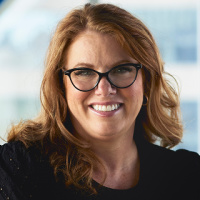
Christine Barnhart is the Chief Marketing and Industry Officer for Nulogy. In her role, Christine leverages her thought leadership and domain expertise to play a pivotal role in the way Nulogy speaks to the market and delivers customer value. Her extensive experience as a supply chain expert and seasoned software executive makes her uniquely positioned to incorporate sales, product, and customer success in the way marketing approaches its go-to-market, demand generation, and brand-building efforts. Under Christine’s guidance, Nulogy continues to shape and educate the market around the emerging space of Multi-Enterprise Collaboration. Christine’s previous roles include Vice President, Product Strategy and Go-To-Market at Verusen as well as Senior Director of Product and Industry Market Strategy for Infor. Christine holds a BSEE from the University of Evansville and an MBA from the University of Louisville. She is also an APICS-certified professional in Inventory and Production Management. Connect with Christine on LinkedIn.
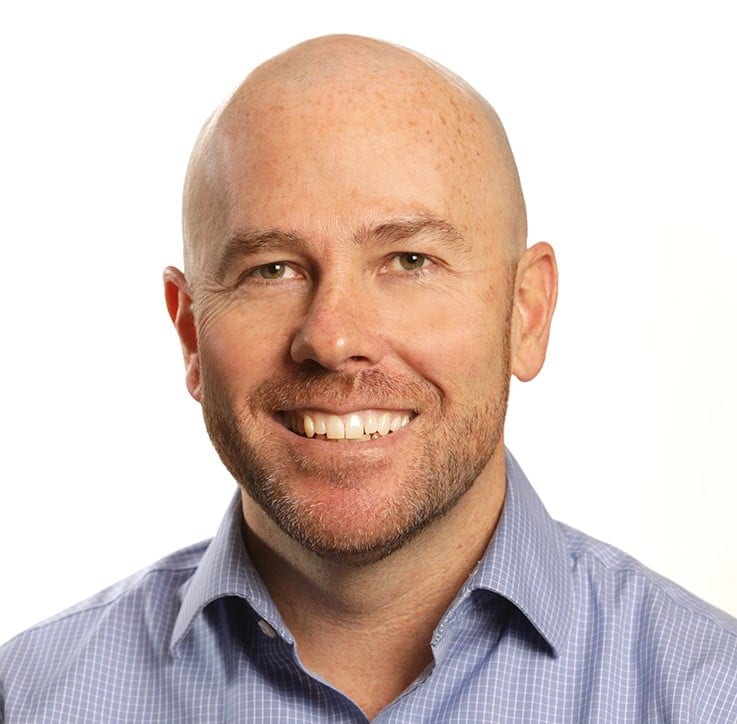
Aaron Meredith is an innovation director at the Point A Center for Supply Chain Innovation, a Georgia-Pacific company. He works with member companies to deliver highly valuable, innovative solutions to complex cross-industry problems in the supply chain. Aaron joined Point A in January 2019 with over 17 years of experience at Georgia-Pacific in areas of manufacturing, business operations, operations excellence, information technology and innovation. Aaron’s prior experience includes stints with both the Mead Corporation and Westvaco. He has lived and worked in 3 different countries, including 2 years as a Peace Corps volunteer. Aaron hold bachelor’s degrees in Chemical Engineering and Pulp & Paper Science and Technology from North Carolina State University, and a master’s in Business Administration from Kennesaw State University. When not working, Aaron enjoys international travel with his family and all things sports. Go Braves!
